

Established 1951 April 2024 Dyeing, Printing and Finishing I / Techtextil 2024 / IGATEX Pakistan 2024 Review


Calendar of Events

Techtextil 2024
Dates: April 23rd to 26th, 2024
Venue: Frankfurt, Germany.

IGATEX Pakistan 2024, Lahore
Dates: May 1st to 4th 2024.
Venue: Expo Centre, Lahore.
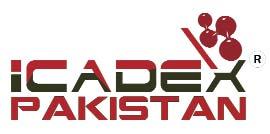
iCADEX Pakistan 2024, Lahore
Dates: May 1st to 4th 2024.
Venue: Expo Centre, Lahore.

DOMOTEX asiaCHINAFLOOR 2024
Dates: May 28th to 30th 2024.
Venue: NECC, Shanghai, China.
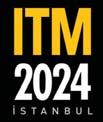
ITM 2024
Dates: June 4th to 8th, 2024.
Venue: Istanbul, Turkey.

HIGHTEX 2024
Dates: June 4th to 8th, 2024.
Venue: Istanbul, Turkey.

INTEX SOUTH ASIA 2024
Dates: August7th to 9th 2024.
Venue: Colombo, SriLanka.

DPS World Pakistan 2024
Dates: August 16th to 18th 2024.
Venue: Lahore Expo Centre.

Textile Asia 2024, Lahore
Dates: August 03rd to 05th 2024.
Venue: Lahore Expo Centre.
Textile Asia 2024, Karachi
Dates: April 12th to 14th 2025.
Venue: Expo Centre, Karachi.

63rd DORNBIRN-GFC Call For Papers
Dates: September 11th to 13th 2024.
Venue: Dornbirn Austria.
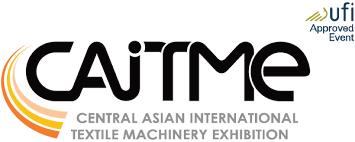
CAITME 2024
Dates: September 11th to 14th, 2024.
Venue: Tashkent, Uzbekistan.
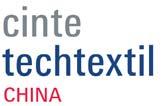
Cinte Techtextil China
International Trade Fair for Technical Textiles and Nonwovens
Dates: September 19th 21st, 2024.
Venue: Shanghai New International Expo Centre, Shanghai, China

ITMA ASIA + CITME 2024
Dates: October 14th to 18th, 2024.
Venue: NECC, Shanghai, China.

JIAM 2024 OSAKA
Dates: November 27th to 30th 2024.
Venue: Osaka, Japan.

Heimtextil 2025, Frankfurt
Dates: January 14th, to 17th, 2025
Venue: Frankfurt am Main.

ITMA ASIA + CITME, Singapore 2025
Dates: October 28th to 31st, 2025.
Venue: Expo Centre Singapore.
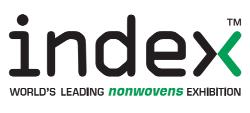
Index 2026
Dates: April 21st to 24th, 2026.
Venue: Palexpo, Geneva, Switzerland.

ITMA 2027
Dates: September 16th to 22nd, 2027.
Venue: Hanover, Germany.
2
PAKISTAN TEXTILE JOURNAL - April 2024
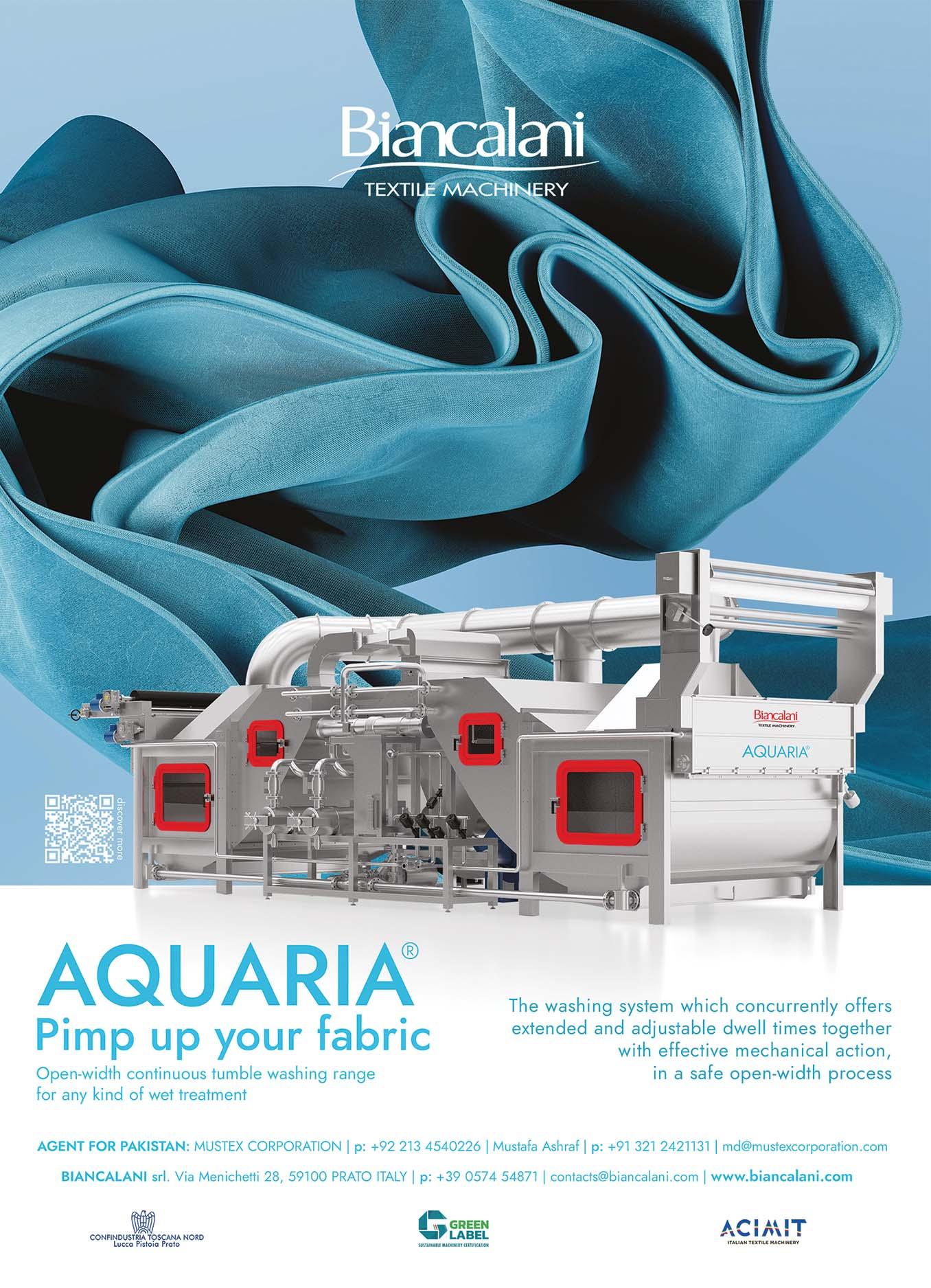



Bandukda
Tel: +92-21-34311674-5
Fax: +92-21-34533616
Email: info@ptj.com.pk
URL: http://www.ptj.com.pk
PTJ Europe Ltd.
Registered Office: Dairy House, Money Row Green, Holyport, Maidenhead, Berkshire, SL6 2ND, United Kingdom.
Registered no. 09141989
Tel: +44 792 2228 721
PhD (Textiles), CText ATI Printed


















CORPORATE NEWS
Groz-Beckert develops innovative slider needle for circular knitting machines together with Vanguard Pailung . .
Oerlikon offers sustainable machine and system technologies for the Turkish manmade fibers market
EDANA: European Nonwovens production decreased by 5.7% in 2023
Novibra’s NASA with CROCOdoff – Less Maintenance and Higher Profit
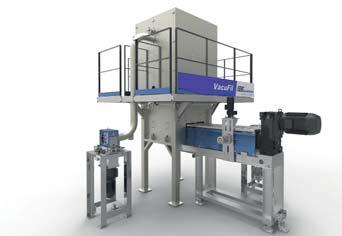

DYES AND CHEMICAL
Archroma introduces ALBAFIX® ECO PLUS, a unique state-of-the-art wet-fastness improver for long-lasting colors without compromise .
FAIRS AND EXHIBITIONS
DOMOTEX asia/CHINAFLOOR 2024 prepares to welcome a growing number of international buyers for its 26th edition .
ITM 2024 gets ready to bring textile technology leaders together with global buyers .30 Eagerly awaited ITMA ASIA + CITME Exhibition in Singapore Gears up for opening of space application .
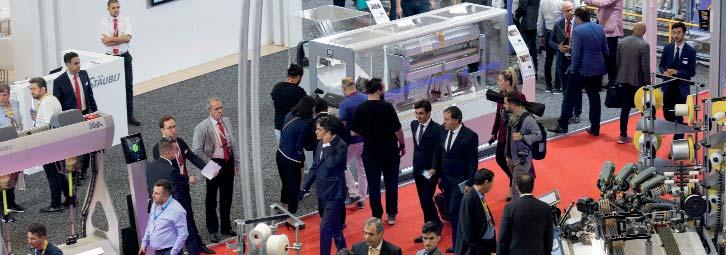
30
AROUND THE WORLD . . . . . . . . . . . . . . . . . . . . . .14 NEWS & VIEWS . . . . . . . . . . . . . . . . . . . . . . . . . .10 EDITOR’S PAGE . . . . . . . . . . . . . . . . . . . . . . . . . . .7 Advancing Pakistan's Textile Industry: A Vision for Excellence TEXTILE BRIEFS . . . . . . . . . . . . . . . . . . . . . . . . . . .8 Vol. LXXIII No. 04 April 2024 Rs. 565.00 Founded in 1951 by Mazhar Yusuf (1924-2009) Publisher Nadeem
Editor in Chief
Editor
Production
&
/ Social Media
Board Dr. Hafizur Rehman Sheikh Ph.D
F.T.I. (UK)
Mahfooz
C.TEX, F.T.I (U.K), B.Sc. Fellow I.C.T.T Atlanta, GA; (USA) Dr. Zubair
Mazhar
Amina Baqai Associate
Nimrah Nadeem
Manager Mazhar Ali Layout
Design Noor M. Jaan Website
Minhaj Ali Hony-Editorial
(UK)
Syed
Qutab
at: Color Plus Korangi,
Published by Nadeem Mazhar from D-16, K.D.A. Scheme No.1. Karachi. Available on Gale and Factiva affiliated international databases through Asianet Pakistan Editorial & Advertising Office B-4, 2nd Floor, 64/21, M.A.C.H, Miran M.
Road,
Karachi.
Shah
Karachi - Pakistan
. . . . . . . . . . . . . . . . . . . . . . . . . . . . .18
. . .
. . . . . . . . . . . . . . . . . . . . . . . . . . . . . . . . . . . . . . . . . . . . . . . . . .20
. . . . . . . . . .22
. . . . . . . . . .26
. . . . . . . . . . . . . . . . . . . . . . . . .
.
.29
. . . . . . . . . . . . . . . . . . . . . . . . . . . . . . . . . . . . . . . . . . .32
. . . . . . . . . . . . . . . . .
.24
19 26

FEATURES
ImageData Group Targets Growth in Display Graphics Market with EFI Nozomi 14000
SD Super High-Speed Digital Press
Trust Protocol expands regional field-level grower support system
Trützschler and Zagis: Long partnership, strong performance
From manual to automated fabric inspection
Step up to assured fabric quality for technical and sensitive applications
DyStar clarifies misconceptions regarding receivership/sale of DyStar shares

Techtextil and Texprocess
These are the industry's game changers: Techtextil and Texprocess impress with a strong knowledge programme
VDMA members at Techtextil: Focus on automation and digitalisation
Techtextil 2024: Connect with the Trützschler Group in Frankfurt, Germany!
Cavitec: High precision in coating and laminating
Monforts to debut the coaTTex at Techtextil 2024
Crealet AG: Warp tension under control and a bright future ahead
Crealet presents its innovative warp tension solutions at Techtextil 2024
BRÜCKNER on TECHTEXTIL in Frankfurt: 75 years of tradition and innovation
IGATEX PAKISTAN 2024

International Garment, Textile, Digital Printing Machinery and Accessories
Exhibition & Conference
IGATEX PAKISTAN 2024 – Celebrating 22 years of innovation in the world of textiles
Interview of Mr. Saleem Khan Tanoli, CEO, Fakt Exhibitions (Pvt.) Ltd.
Two strong partners, Brückner and Texfina: Innovating for decades
Karl Mayer Group to showcase at upcoming IGATEX Pakistan 2024
MS & JK Group: Printing innovations
DYEING, PRINTING AND FINISHING
Finishing first with Monforts
Textile sustainable solutions are the talk of the town:
Jeanologia calls for shared responsability on World Water Day
Spanish tech company advocates for collective solutions to address global water scarcity
Baldwin and Elmatex presents spray finishing system at Techtexil
Archroma, G-Star RAW and Advance Denim promote cleaner denim production
Mimaki launches environmentally conscious, two-step textile transfer printing solution TRAPIS

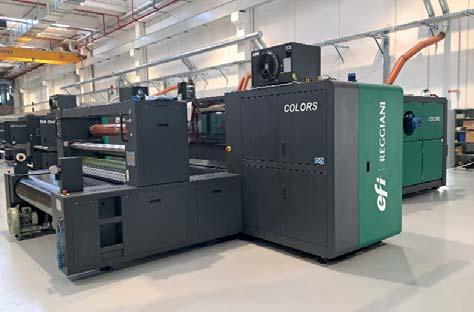
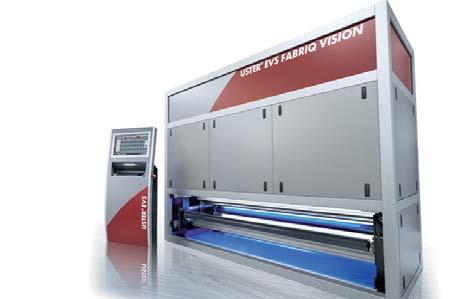
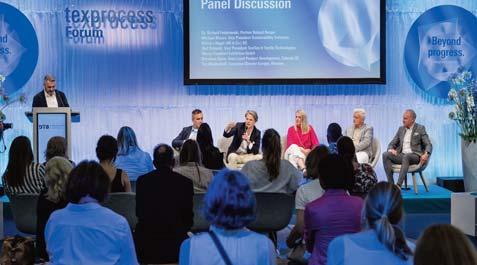
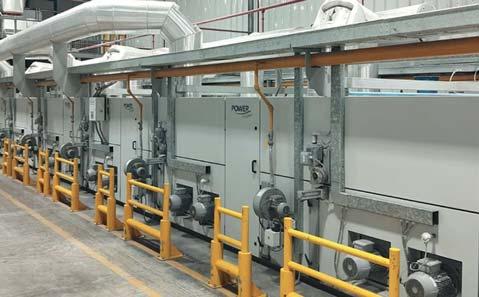

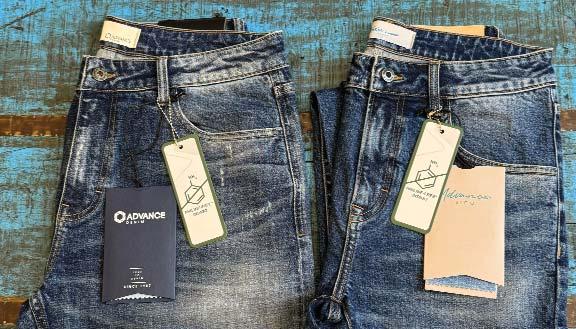
62 34 40 42 52 55 59 37
. . . . . . . . . . . . . . . . . . . .
. . . . . . . . . . .
.34
. . . . . . . . . . .
.36
. . . . . . . . . . . . . . .37
. . . . . . . . . . . . . . . . . . . . . . . . . .40
.
. . . . .41
. . . . . . . . . . . . . . . . . . . . . . . . . . . . . . . . . . .42
. . . . . . .43
. .44
. . . . . . . . . . . . . . . . . . . . . .46
. . . . . . . . . . . . . . . . .47
. . . .
. . . . . . . . . .48
. . .49
. . . . . . . . . . . . . . . . . . . . . . . . . . . . . . . . . . . . .50
. .
. .51
. . . . . . . .52
.
. . . . . . . . .53
.
. . . . . . . . . . . . . . . . . . . . . . . . . . . . .53
. . . . . . . . . . . . . . . . . . . . . . . . . . . . . . . . . . . .55
. . . . . . . . . . . . . . . . . .56
. . . . . . . . . . . .58
. . . . . . . . . . .60
. .62
. . . . . . . . . . . . . . . . . . . . . . . . . . . . . . . . . . . . . . . . . . . . .63

EDITOR’S PAGE
Advancing Pakistan's Textile Industry: A Vision for Excellence
The textile industry stands as one of Pakistan's most significant economic pillars, fostering growth, generating employment, and propelling the nation's exports onto the global stage. With a steadfast commitment to innovation and sustainability, Pakistan's textile sector continues to evolve, offering immense opportunities for growth and development.
In the fiscal year 2022-23, Pakistan's textiles and apparel exports surged to an impressive US$ 16.7 billion, a testament to the sector's resilience and potential. Employing approximately 45% of the nation's workforce, with a substantial portion engaged in manufacturing, the textile industry remains a vital engine driving Pakistan's economy forward.
At the heart of this success story lies Pakistan's position as the fourth largest producer of cotton worldwide, coupled with the third largest spinning capacity in Asia. With 1,221 ginning units and 442 spinning units, including 124 large spinning units, Pakistan's textile infrastructure is robust, laying a solid foundation for sustained growth and innovation.
In recent years, significant strides have been made in textile processing, particularly in dyeing, printing, and finishing. Technological advancements have enabled the industry to meet increasingly stringent requirements for lower chemical usage, water conservation, and energy efficiency. Today's finishing machines not only ensure economical production but also adhere to the highest standards of environmental sustainability.
Moreover, the textile printing market is experiencing a paradigm shift towards digital technology, driven by its ability to enhance production speeds and reduce costs. Despite stiff competition, conventional screen printing retains a significant share of the market, with growth prospects primarily driven by the digital textile printing segment.
In Pakistan, the digital textile printing market is on the rise, offering superior design possibilities, reduced environmental footprint, and cost-effective production. This trend aligns with global shifts towards eco-friendly practices and just-in-time manufacturing, further bolstering Pakistan's position in the global textile landscape.
Amidst everything two important textile exhibitions happening in Pakistan are IGATEX Pakistan and ICADEX Pakistan 2024. IGATEX Pakistan serve as catalysts for industry advancement, providing a premier platform for manufacturers and buyers to forge strategic alliances and explore cutting-edge technologies. With a record-breaking number of visitors each year, IGATEX Pakistan and ICADEX Pakistan continues to drive innovation and collaboration within the textile sector. IGATEX Pakistan and ICADEX Pakistan 2024 are all set to take place at Lahore Expo Centre during 1st – 4th May.
The other very important textile exhibition that is taking place between 23rd – 24th April at Frankfurt, Germany, providing a comprehensive platform for industry professionals to explore innovations, exchange knowledge, and foster partnership is Techtextil and Texprocess 2024 Exhibitors from over 40 countries, including Germany, Pakistan, Italy, South Korea, and the United States, are gearing up for Techtextil and Texprocess as crucial platforms for networking and sales. These events will showcase a wide range of products, from fibers and yarns to nonwovens and coated textiles, along with textile manufacturing technology. Sustainability is a key focus, with both fairs highlighting sustainable solutions and offering opportunities for startups. Texprocess will feature a special exhibit on denim processing, catering to the growing denim market.
Exhibitions like Techtextil and Texprocess 2024 showcase the latest innovations in technical textiles and garment value addition, highlighting the potential for high-value technical textiles in Pakistan's future.



7
Established 1951 April 2024 Dyeing, Printing and Finishing Techtextil 2024 / IGATEX Pakistan 2024 Review April 2024
1
Provisional data released by the AllPakistan Textile Mills Association (APTMA) revealed a modest 3% yearon-year increase in Pakistan's textile exports for March, reaching $1.3 billion compared to $1.26 billion in the corresponding period last year. This marks the fourth consecutive month of yearon-year growth in textile exports.
2
The Pakistan Readymade Garments Manufacturers and Exporters Association (PRGMEA) has called upon the government to revamp the current Textile Policy by introducing a distinct fiveyear 'Apparel Policy', granting autonomy to the garment sector. This move aims to

capitalize on emerging opportunities following the expiration of the GSP Plus status and the anticipated findings of the U.S. International Trade Commission's (ITC) report on Pakistan’s apparel industry competitiveness that is due in August.
3
Secretary Agriculture
Punjab, Iftikhar Ali
Sahoo in a recent meeting revealed significant strides in cotton cultivation during a meeting held at Agriculture House. The concerted efforts of the Agriculture Department, Punjab, and diligent cotton growers resulted in a notable 20-25% expansion in the cotton cultivation area last year, leading to a remarkable increase of 3 million bales in total production. This surge translated into a
Textile Briefs International
1
Bangladesh's government is launching a series of incentives to stimulate cotton cultivation, aiming to elevate domestic production and diminish reliance on imported fiber vital for the textile and export-oriented ready-made garment (RMG) sector.
2
Recent data from the General Administration of Customs reveals a significant surge in China’s textile and garment exports in 2023, outpacing the growth rate of total goods trade. China’s textile and apparel exports reached 45.1 billion US dollars in the first two months of 2024, up by 14.3% year over year. The growth rate increased by 32.8% over the same period in 2023, outpacing the
substantial benefit of 1.5 billion dollars for the country.
4Eighteen Pakistani textile enterprises made a resounding impact at the Yarn Expo Spring 2024 and Intertextile Shanghai Apparel Fabrics-Spring Edition 2024, esteemed as two of the world's premier textile and apparel showcases, held in Shanghai.
5The Embassy of Pakistan in Brussels orchestrated a webinar titled "Opportunities in the Textile Sector of Pakistan," aimed at companies based in Belgium and Luxembourg. The event drew significant interest from participants eager to explore collaborations and investments within Pakistan’s vibrant textile industry.
6Pakistan Cotton Ginners Association (PCGA) has announced a remarkable 71% increase in cotton production for the fiscal year 2023-24. The country produced a total of 8.397 million bales, reflecting substantial growth compared to the previous year.
7The Pakistan Readymade Garments Manufacturers and Exporters Association (PRGMEA) has voiced its dissent against the decision made by the Trade Development Authority of Pakistan (TDAP) to relocate TEXPO 2024 from Lahore to Karachi, deviating from the established schedule.

export growth rate of the total goods trade by 7.2%, according to recent data from the General Administration of Customs.
3
Egypt's cotton industry has been a cornerstone of its economy for centuries, but faced a steep decline from 2006 to 2016, with production plummeting by seventy percent. In response, the government has launched initiatives to revive this vital cash crop and bolster Egypt's economy.
4Myanmar aims to reach $16.5 billion in exports and $16 billion in imports for FY24, as announced by the Ministry of Commerce. However, the country faces a trade deficit as imports currently outpace exports. Despite this chal-
lenge, the GDP is projected to grow by 3.8%, indicating optimism for economic recovery, with the industrial sector expected to contribute significantly, adding 4.2% to GDP growth.
5
In the first two months of 2024, Turkey's textile and raw materials sector witnessed a 2.2% increase in exports, reaching $1.9 billion, as reported by the Istanbul Textile and Raw Materials Exporters' Association (ITHIB). This sector accounted for 4.6% of Turkey's total exports during this period. Notably, February alone saw a 9.7% surge in exports, totaling $971 million compared to the same month in 2023.

6
The United States' textile industry is experiencing a notable decline in demand, leading to the closure of numerous cotton mills. According to the National Cotton Council, the number of operational U.S. cotton mills has dwindled from nearly 900 in 1893 to around 100 today, with eight mills shuttering in the last five months of 2023 alone.
7The Textile Recycling Association (TRA) in the UK is raising alarm bells, warning of an imminent collapse in the recycling sector due to challenges in global markets. According to the TRA, textile processing plants in the UK are nearing capacity, making it increasingly difficult for members to collect material effectively from charity shops, recycling centers, and community textile banks.
8 PAKISTAN TEXTILE JOURNAL - April 2024
National
Textile Briefs

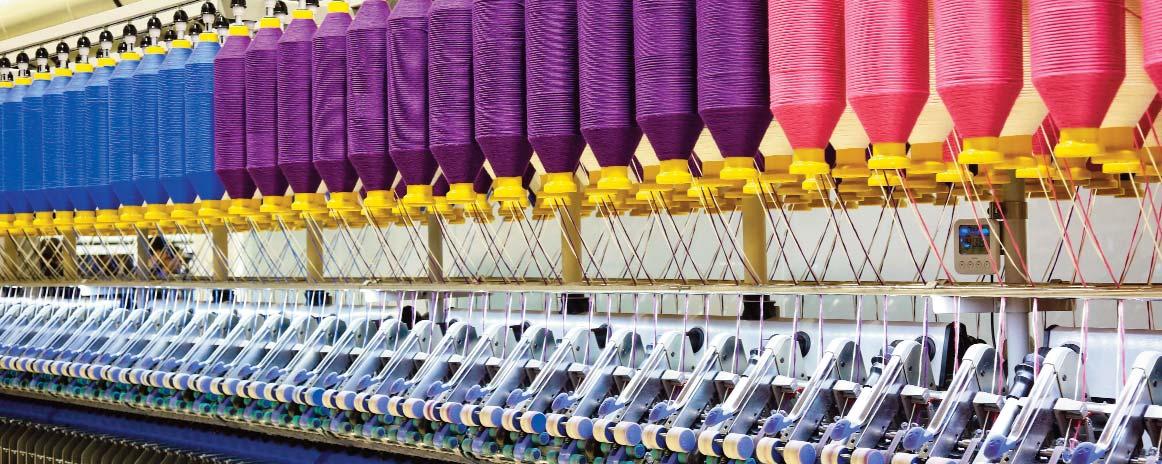
Pakistan's Textile Exports Show Marginal Growth of 3% YoY Amid Energy Tariff Concerns
Provisional data released by the AllPakistan Textile Mills Association (APTMA) revealed a modest 3% year-onyear increase in Pakistan's textile exports for March, reaching $1.3 billion compared to $1.26 billion in the corresponding period last year. This marks the fourth consecutive month of year-onyear growth in textile exports.
However, despite this recent uptick, textile exports for the first nine months of the fiscal year 2023-2024 experienced a slight decline of 0.3%, amounting to $12.44 billion, representing a decrease of $0.04 billion.
In a monthly comparison, textile exports saw a notable decline of nearly 8% from February's figure of $1.41 billion.
The textile sector plays a pivotal role in Pakistan's economy, contributing significantly to foreign exchange reserves. As the backbone of the country's exports,
it mitigates the need for foreign borrowing, thereby bolstering economic stability.
Notably, the recent imposition of a 223% increase in gas tariffs over the past year has drawn vehement opposition from APTMA. The association has denounced this surge as detrimental to the export-oriented textile industry, emphasizing the industry's declining competitiveness in the global market due to escalating energy costs.
APTMA contends that the exorbitant rise in gas tariffs has adversely impacted Pakistan's export-oriented textile sector, which commands a substantial 60% share of the country's total exports. It has urged the federal government to reconsider its decision to hike gas tariffs drastically, advocating for measures to restore the industry's competitive edge in international markets.
The association underscores the urgent need for policy interventions to alleviate the burden of high energy costs, safeguarding the textile industry's pivotal role in driving Pakistan's export-driven economy.
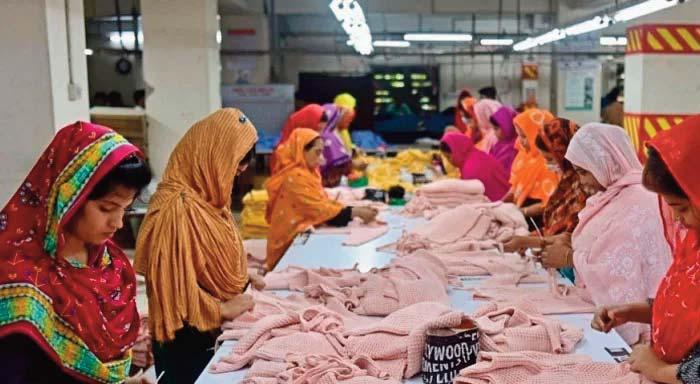
PRGMEA Urges Government for Independent 'Apparel Policy' to Boost Export Competitiveness
The Pakistan Readymade Garments Manufacturers and Exporters Association (PRGMEA) has called upon the government to revamp the current Textile Policy by introducing a distinct five-year 'Apparel Policy', granting autonomy to the garment sector. This move aims to capitalize on emerging opportunities following the expiration of the GSP Plus status and the anticipated findings of the U.S. International Trade Commission's (ITC) report on Pakistan’s apparel industry competitiveness that is due in August.
Mubashar Naseer Butt, Chairman of PRGMEA, highlighted the pivotal implications of the impending US ITC report, emphasizing the urgency to fortify Pakistan's apparel sector, which aligns with the US's heightened focus on apparel imports from the country.
Butt stressed the need to differentiate the garment sector from textiles, aligning with global practices and the singular demand of the EU for apparel products. He underscored the importance of leveraging Pakistan's comprehensive textile value chain, spanning from raw cotton to garment manufacturing, to enhance the apparel export potential.
The association lauded Pakistani representatives for presenting a compelling case before the US International Trade Commission, underscoring the collaborative effort of politicians, bureaucrats, and private stakeholders.
Advocating for a standalone apparel policy, Butt emphasized the divergent challenges and dynamics of the garment sector compared to textiles. He
10 PAKISTAN TEXTILE JOURNAL - April 2024
highlighted the sector's labour-intensive nature, job creation potential, and relatively low energy consumption, stressing the imperative of sector-specific policies to sustain and enhance textile exports.
Sajid Saleem Minhas, PRGMEA Executive Committee member, shared the strategic importance of securing dutyfree access to the US market, calling for concerted efforts from the government to boost the value-added textile industry's competitiveness.
Minhas emphasized the establishment of an 'Apparel Council/Committee' comprising public and private stakeholders to oversee sectoral activities and policy formulation, with a focus on enhancing manmade fiber capacity to cater to the US market demand.
Punjab Agriculture Department Spearheads Cotton Cultivation Initiative
Secretary Agriculture Punjab, Iftikhar Ali Sahoo in a recent meeting revealed significant strides in cotton cultivation during a meeting held at Agriculture House. The concerted efforts of the Agriculture Department, Punjab, and diligent cotton growers resulted in a notable 20-25% expansion in the cotton cultivation area last year, leading to a remarkable increase of 3 million bales in total production. This surge translated into a substantial benefit of 1.5 billion dollars for the country.
Secretary Sahoo underscored the pivotal role of the Agriculture Department's officers and field staff in ensuring optimal cotton production. Emphasizing the need for enthusiastic performance, he urged them to dedicate themselves to achieving high cotton yields in the upcoming season.
To provide dedicated support to cotton farmers, the Agriculture Department is eliminating additional duties of field staff, thereby enabling them to focus solely on providing technical guidance to farmers during the critical four to five months ahead.
In a strategic move to spearhead the 'Cotton Campaign 2024', Secretary Sahoo appointed Consultant Dr. M. Anjum Ali as the focal person. Regular weekly meetings will be convened, particularly in cotton cultivation divisions, as part of this campaign to facilitate effective coordination and support for farmers.
Highlighting Punjab's recognition in the cotton sector, Secretary Sahoo stressed the formation of divisional and provincial committees to further promote cotton cultivation. He directed efforts to engage the private sector actively, organizing mega farmer gatherings to enhance awareness among cotton farmers.
Key stakeholders, including Additional Secretary Agriculture (Admin) Punjab Ijaz Munir, DG Agriculture (Extension) Punjab Dr. Ishtiaq Hasan, Consultant Dr. M. Anjum Ali, Director Agriculture (Extension) Headquarters Farooq Javed, and Director Agricultural Information Punjab Naveed Asmat Kahlon, actively participated in the meeting, reaffirming their commitment to advancing cotton cultivation initiatives in Punjab.

Pakistani Textile Companies Shine at Global Exhibitions in Shanghai
Eighteen Pakistani textile enterprises made a resounding impact at the Yarn Expo Spring 2024 and Intertextile Shanghai Apparel Fabrics-Spring Edition 2024, esteemed as two of the world's premier textile and apparel showcases, held in Shanghai.
Representing a diverse spectrum of textile manufacturers and suppliers, the Pakistani delegation unveiled their latest offerings and cutting-edge technologies, garnering considerable interest from international buyers, reported China Economic Net (CEN).
The participating companies, encompassing yarn, fabric, finished goods, and accessories sectors, unveiled a wide array of premium products, ranging from cotton, polyester, and blended yarns to wool carpets and specialty fabrics.
Pakistan's textile industry has long been esteemed for its quality, competitiveness, and adeptness in meeting the evolving needs of the global market.
Hussain Haider, Consul General of Pakistan in Shanghai, expressed pride and optimism regarding the robust participation of Pakistani textile firms at these prestigious exhibitions. He highlighted the significance of Pakistan's textile heritage, its dedication to innovation, and its unwavering commitment to quality.
"The Pakistani textile industry stands tall as a leading exporter, with annual exports totaling $1.9 billion, firmly establishing itself as the cornerstone of the country's economy," he further added.
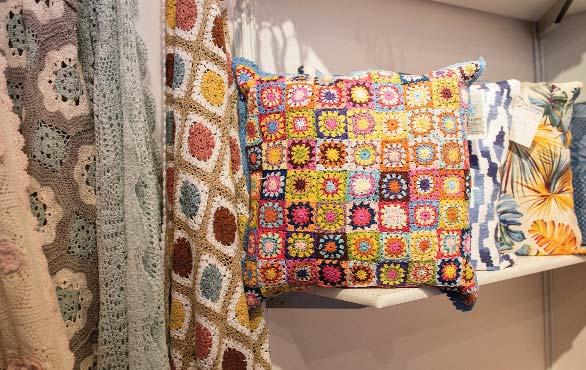
He emphasized the competitive pricing of Pakistani textiles, coupled with the country's skilled workforce, efficient manufacturing processes, and robust supply chain network, making them an appealing choice for discerning buyers seeking superior products at competitive prices.
Moreover, he elucidated on the burgeoning collaboration between Pakistan and China in textile trade, citing Chinese investments in Pakistan, knowledge exchange, and Pakistan's keenness to leverage China's innovation and management expertise.
The Consul General also underscored the potential integration of artificial intelligence (AI) in the textile sector.
Additionally, he underscored the pivotal role of exhibitions like Yarn Expo and Intertextile Shanghai in fostering trade and cooperation between Pakistan and China, providing an ideal platform for Pakistani enterprises to forge alliances, explore emerging trends, enhance exports, and fortify their global presence.

Several companies highlighted their eco-friendly manufacturing practices and commitment to sustainability, aligning with the global shift towards environmentally conscious production.
Nadeem Waqar, Marketing Manager at Kohinoor Mills Ltd, stressed the imperative of adopting eco-friendly processes, sustainable materials, and waste reduction, advocating for collaborative efforts to realize a circular and sustainable textile economy.
With China's recent measures to expand imports, coupled with Pakistan's zero-tariff treatment under the ChinaPakistan Free Trade Agreement Phase 2, Moshin Khan from Reliance Weaving Mills Ltd envisaged significant opportunities for Pakistani textiles to capture a larger market share in China.
Embassy of Pakistan Hosts Webinar to Showcase Textile Sector Opportunities
The Embassy of Pakistan in Brussels orchestrated a webinar titled "Opportunities in the Textile Sector of Pakistan," aimed at companies based in Belgium and Luxembourg. The event drew significant interest from participants eager to explore collaborations and investments within Pakistan’s vibrant textile industry.
Her Excellency Amna Baloch, Ambassador of Pakistan to the European Union, Belgium, and Luxembourg, extended a warm welcome to attendees, offering a comprehensive overview of Pakistan’s dynamic textile sector. She
News & Views 12 PAKISTAN TEXTILE JOURNAL - April 2024
underscored the business-friendly policies of the Pakistani government and highlighted the array of trade and investment opportunities available to foreign firms.
Ambassador Baloch emphasized the government's commitment to facilitating such ventures through the Special Investment Facilitation Council (SIFC).
A detailed presentation on the landscape of Pakistan’s textile sector was delivered by Mr. Muhammad Bilal Khan, Trade and Investment Attaché at the Embassy of Pakistan in Brussels. Additionally, Mr. Shaikh Iqbal, CEO of the Pakistan Textile Council (PTC), provided valuable insights into the industry's potential.
The webinar garnered acclaim from participants, who commended the Embassy’s efforts to engage and attract the business community to invest in Pakistan. This initiative showcased the Embassy’s dedication to fostering robust economic ties between Pakistan and Belgium/Luxembourg while promoting investment opportunities within Pakistan’s flourishing textile sector.
Pakistan's Cotton Production Surge by 71% but Falls Short of Set Target
Pakistan Cotton Ginners Association (PCGA) has announced a remarkable 71% increase in cotton production for the fiscal year 2023-24. The country produced a total of 8.397 million bales, reflecting substantial growth compared to the previous year.
However, amidst the celebration of this achievement, concerns arise as the production falls short of the target set for the year. The shortfall amounts to a record 3.873 million bales, representing a notable 32% deficit against the predetermined goal.
According to the PCGA report, cotton production in Punjab reached 4.282 million bales, while Sindh contributed 4.115 million bales to the total output. Sanghar district in Sindh emerged as a leading producer with 1.695 million bales, while Pakpattan district in Punjab reported the lowest output of 5,240 bales.
Textile mills played a pivotal role in the cotton market, purchasing 8.043 million bales from ginning factories. Additionally, exporters procured 2.93 million bales, indicating robust demand both domestically and internationally. Despite these transactions, ginning factories still hold 60,500 bales in inventory.
Chairman of the Cotton Ginners Forum, Ihsan ul Haq, provided insights into the dynamics shaping the industry. He highlighted the unexpected surplus in Sindh's production, attributing it to strategic planning. Conversely, Punjab faced challenges due to adverse weather conditions and the prevalence of whitefly cotton, leading to a decrease in production.
Haq also raised concerns about the impact of heavy taxes on the industry, leading to "off-the-record" trade practices. He estimated that approximately two million bales were traded through unofficial channels, significantly affecting perceptions of domestic production.
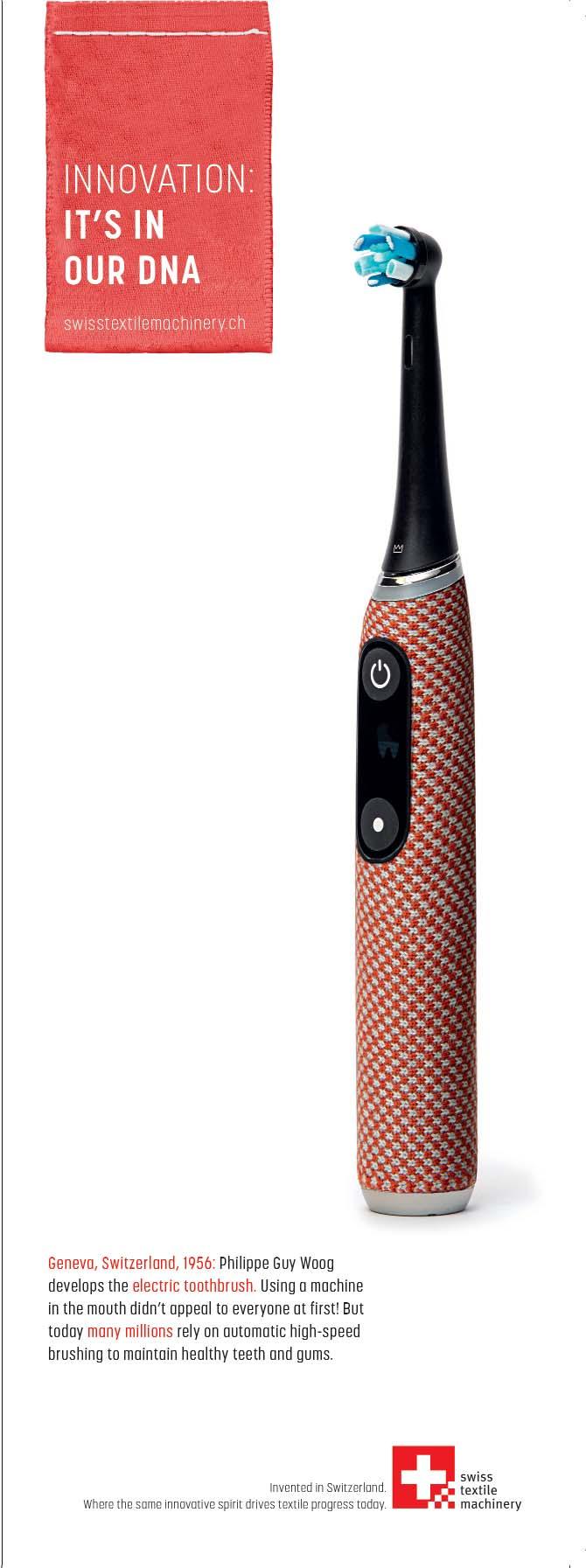
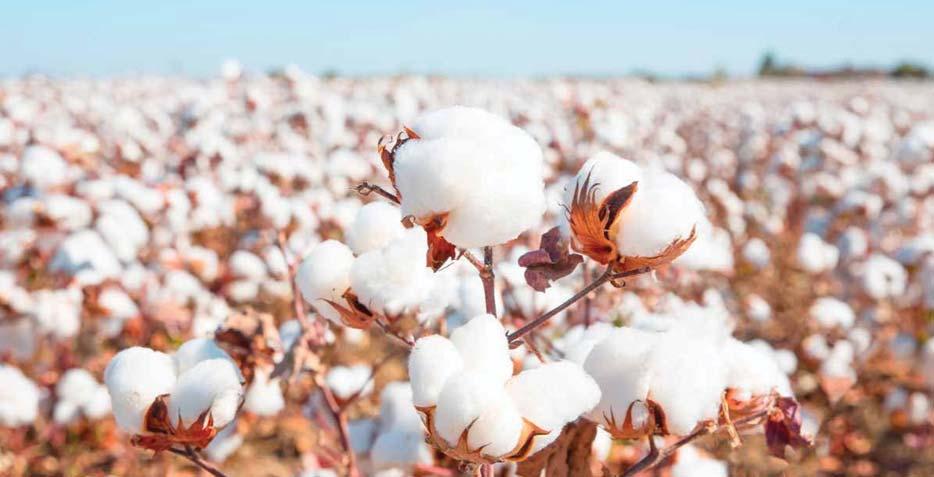

BANGLADESH
Bangladesh Government Initiates Incentives to Boost Cotton Cultivation
Bangladesh's government is launching a series of incentives to stimulate cotton cultivation, aiming to elevate domestic production and diminish reliance on imported fiber vital for the textile and export-oriented ready-made garment (RMG) sector.
As part of this initiative, over 12,375 farmers spanning 26 districts will benefit from a range of complimentary incentives, including hybrid cotton seeds, urea, Diammonium phosphate (DAP), Muriate of Potash (MoP), and pesticides.
Emphasizing the pressing demand for cotton within Bangladesh's industrial landscape, Md Fakhre Alam Ibne Tabib, the executive director of the Cotton Development Board (CDB), underscored the initiative's objective: to satisfy onefifth of the local demand through increased domestic production.
Despite the evident need, Bangladesh heavily relies on imports, with locally grown cotton meeting a mere two per cent of the requirement in the 2022-23 marketing year, as per data from the US Department of Agriculture.
The CDB is committed to expanding cotton cultivation areas by 2 per cent
annually, projecting an increase from 45,900 hectares in 2023-24 to 47,000 hectares in the upcoming season. Additionally, they aim for a 7.5 per cent surge in production, targeting 2.15 lakh bales.
Tabib outlined the strategic distribution of hybrid seeds sourced from various companies, emphasizing their efforts to expand cotton cultivation into areas with historically low cropping intensity, driven by limited available land.

CHINA
China's Textile and Garment Exports Surge, Outpacing Total Goods Trade Growth
Recent data from the General Administration of Customs reveals a significant surge in China’s textile and garment exports in 2023, outpacing the growth rate of total goods trade. China’s textile and apparel exports reached 45.1 billion US dollars in the first two months of 2024, up by 14.3% year over year. The growth rate increased by 32.8% over the same period in 2023, outpacing the export growth rate of the total goods trade by 7.2%, according to recent data from the General Administration of Customs.
Among them, apparel exports totaled 23.38 billion US dollars, growing 13.1%
year over year, and textile exports totaled 21.71 billion US dollars, growing 15.5% year over year.
There were slight escalations in textile raw material prices have contributed to the surge in export value and market recovery signals noted by companies at the start of the year have bolstered export activities.
However, the textile industry’s foreign trade is still under pressure, as insufficient export orders continue to be the primary difficulty faced by textile enterprises.
Amidst the commendable export growth in China’s textiles and garments sector, the industry must navigate challenges and seize opportunities for advancement. By proactively adapting to market dynamics, optimizing trade strategies, and exploring new avenues for growth, textile enterprises can propel high-quality development in foreign trade, reinforcing China’s position as a key player in the global textile market.

EGYPT
Egypt's Cotton Industry Sees Revival, Boosting Textile Sector Growth
Egypt's cotton industry has been a cornerstone of its economy for centuries, but faced a steep decline from 2006 to 2016, with production plummeting by
Around the World 14 PAKISTAN TEXTILE JOURNAL - April 2024
seventy percent. In response, the government has launched initiatives to revive this vital cash crop and bolster Egypt's economy.
Constituting about 12 percent of Egypt's export earnings through the textile sector, Egyptian cotton holds significant economic importance. Efforts to reclaim its prominence in the global textile industry come as Indian, Chinese, and American cotton gained dominance.
Since 2017, governmental reforms and investments in spinning and weaving factories have enhanced the quality of Egyptian cotton. Further initiatives launched since 2019 focus on improving production quality, fostering farmer productivity, and modernizing production processes.
Egypt's Cotton Research Institute introduced six new enhanced cotton varieties, led by Deputy Director Walid Yahya, who conducted guidance workshops for farmers nationwide to ensure high-quality production.
Government efforts have yielded positive outcomes, as highlighted by the Cabinet Media Center's recent report, stressing the importance of enhancing cotton quality and empowering growers. These endeavors are pivotal in motivating increased production.
Fitch Ratings Inc. acknowledged Egypt's textiles and clothing sector's growth potential, citing factors like a large workforce and planned infrastructure improvements. The Better Cotton Initiative praised Egyptian cotton for its quality, associating Egypt with luxury and excellence.
International bodies like UNIDO lauded Egypt's textile supply chain and recognized its potential for growth in secondary textile products. The International Cotton Advisory Committee applauded Egypt's progress in cotton cultivation and trade.
Despite challenges like the Russian-Ukrainian war's impact on global trade, Egypt achieved record cotton exports in 2022, showcasing its resilience and competitiveness in the international market.

MYANMAR
Myanmar Strives for Trade Balance Amid Growth Projections
Myanmar aims to reach $16.5 billion in exports and $16 billion in imports for FY24, as announced by the Ministry of Commerce. However, the country faces a trade deficit as imports currently outpace exports. Despite this challenge, the GDP is projected to grow by 3.8%, indicating optimism for economic recovery, with the industrial sector expected to contribute significantly, adding 4.2% to GDP growth.
While Myanmar's economic outlook appears positive, the trade deficit presents a hurdle to achieving balance and stability. To address this, efforts to enhance export capabilities and diversify markets are essential. Strategic management of imports in alignment with domestic production capacities is also crucial.
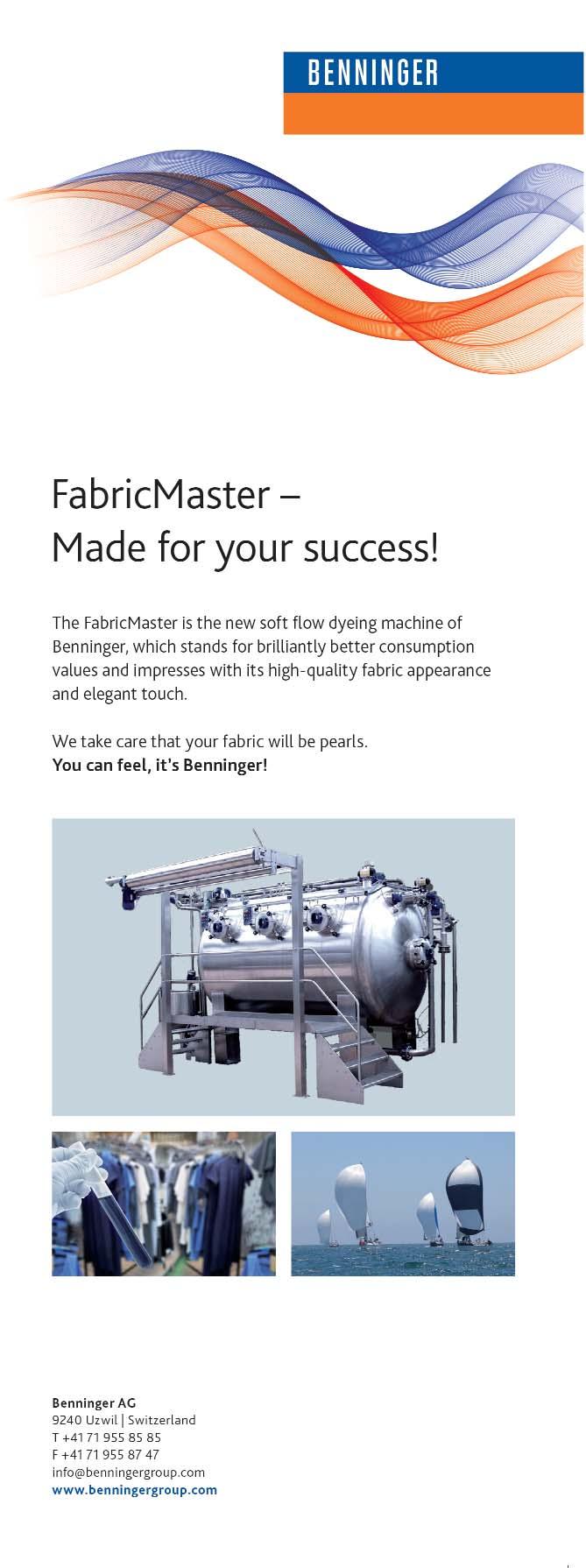
Around the World
The industrial sector plays a pivotal role in driving growth, creating jobs, and increasing productivity. Continued support and investment in this sector will be vital for Myanmar's economic progress.
Overall, Myanmar's prospects for economic recovery in FY24 are promising, but addressing the trade deficit and fostering a conducive environment for industrial development will be paramount to realizing long-term prosperity.

TÜRKIYE
Turkish Textile and Raw Materials Sector Records
Steady Export Growth
In the first two months of 2024, Turkey's textile and raw materials sector witnessed a 2.2% increase in exports, reaching $1.9 billion, as reported by the Istanbul Textile and Raw Materials Exporters' Association (ITHIB). This sector accounted for 4.6% of Turkey's total exports during this period. Notably, February alone saw a 9.7% surge in exports, totaling $971 million compared to the same month in 2023.
While the overall textile and apparel sector experienced a 4.6% decline in exports for January-February, amounting to $4.5 billion, it maintained an 11% share in Turkey's total exports of $41.1 billion. Despite this slight dip, February exports remained stable at $2.3 billion, reflecting a 0.7% increase from the previous year.
Export data revealed a decline in shipments to European Union (EU) countries, offset by increased exports to the USA and Middle East. Although EU countries retained their top position, accounting for 40.3% of Turkey's textile exports, they experienced a 2.3% decrease, totaling $770 million. Notably, exports to Italy and Germany decreased, while those to the USA surged by 14.2%, reaching $114 million.
Meanwhile, exports to African countries, the second-largest market, increased by 7.4% to $202 million, with Middle Eastern countries ranking third, experiencing a 15.4% growth to $171 million.
Woven fabric exports led the product groups, totaling $379 million, despite a

4.5% decrease compared to the previous year. Yarn exports followed closely at $376 million, recording a notable 13.7% increase. Technical textile exports remained stable at $361 million, while home textile exports saw a 10% decline to $274 million. However, fibre exports experienced a significant 19% increase, reaching $216 million.
Despite export growth, employment in the textile and apparel sectors witnessed a decline over the past six months, dropping from 1.193 million in July 2023 to 1.118 million in December 2023. However, capacity utilization rates increased by 2% in the textile industry and 1.6% in the manufacturing industry over the last 12 months, indicating positive momentum in production activities.

UNITED KINGDOM
UK Textile Recycling Sector Faces Imminent Collapse, Urgent Government Intervention Needed, Says Industry Association
The Textile Recycling Association (TRA) in the UK is raising alarm bells, warning of an imminent collapse in the recycling sector due to challenges in global markets. According to the TRA, textile processing plants in the UK are nearing capacity, making it increasingly
difficult for members to collect material effectively from charity shops, recycling centers, and community textile banks.
Adding to the sector's woes are potential halts in textile sorting operations in European countries, including France, Denmark, Sweden, Finland, and Austria, which are considering a ban on the export of 'used' textiles within the EU. This proposed policy shift signifies a significant change that could further strain the industry's future.
Dawn Dungate, director of the TRA, highlights the compounding factors contributing to the crisis, including disruptions in shipping lines in the Red Sea, which have driven up operational costs for textile merchants. Additionally, increasing taxation in African and Asian markets, coupled with mounting pressure to curb waste exports, has placed immense financial strain on the industry.
The TRA emphasizes that the repercussions of the UK sector's inability to collect textiles will have devastating environmental consequences, including microplastic pollution, water pollution, and the accumulation of textile waste in landfills.
Furthermore, the surge in fast fashion has exacerbated the influx of low-quality textiles into the recycling stream, further driving up operational costs and pushing many textile merchants to the brink of financial collapse.
In response to these challenges, the TRA is calling on the UK government to
16 PAKISTAN TEXTILE JOURNAL - April 2024
intervene and regulate the industry. The association believes that introducing an extended producer responsibility (EPR) scheme is essential. Transparent dialogue and concerted efforts are also needed to support the development of a sustainable textile recycling industry.

USA
According to NCC, less than 100 cotton mills are currently active and operating within in US
The United States' textile industry is experiencing a notable decline in demand, leading to the closure of numerous cotton mills. According to the National Cotton Council, the number of operational U.S. cotton mills has dwindled from nearly 900 in 1893 to around 100 today, with eight mills shuttering in the last five months of 2023 alone.
Several factors contribute to this downward trend. Changing trade deals, particularly NAFTA, have significantly
impacted the industry. The proliferation of ecommerce, coupled with trade policy loopholes like de minimis, has allowed millions of products into the U.S. market duty-free, adversely affecting domestic manufacturers. The National Council of Textile Organizations attributes the recent closures of eight mills to de minimis, highlighting the detrimental impact on the industry.
While other sectors have seen a resurgence in domestic manufacturing due to re-shoring initiatives, textiles have not experienced the same level of prioritization. Despite the urgent need for protective equipment during the pandemic, the textile industry is not viewed as critical as sectors like semiconductors or industrial metals. This perception has contributed to the decline in domestic textile production.
The United States Department of Agriculture Economic Research Service reports that cotton mill use is at its lowest level since the late 19th century, with estimated usage for the 2023/2024 marketing year falling to 1.9 million bales. This decline can be traced back to the early 2000s when foreign mill demand

surged due to the phased-out quotas on textile and apparel product imports. Consequently, U.S. cotton mill use weakened, leading to the current historic low projection.
Moreover, over three-fourths of U.S. cotton supply is now exported, posing significant vulnerability to geopolitical disruptions. This heavy reliance on export demand exposes farmers to external factors beyond their control, according to Gary Adams, CEO of the National Cotton Council. As the textile industry grapples with these challenges, sustaining domestic production and ensuring market stability remain critical concerns for stakeholders.
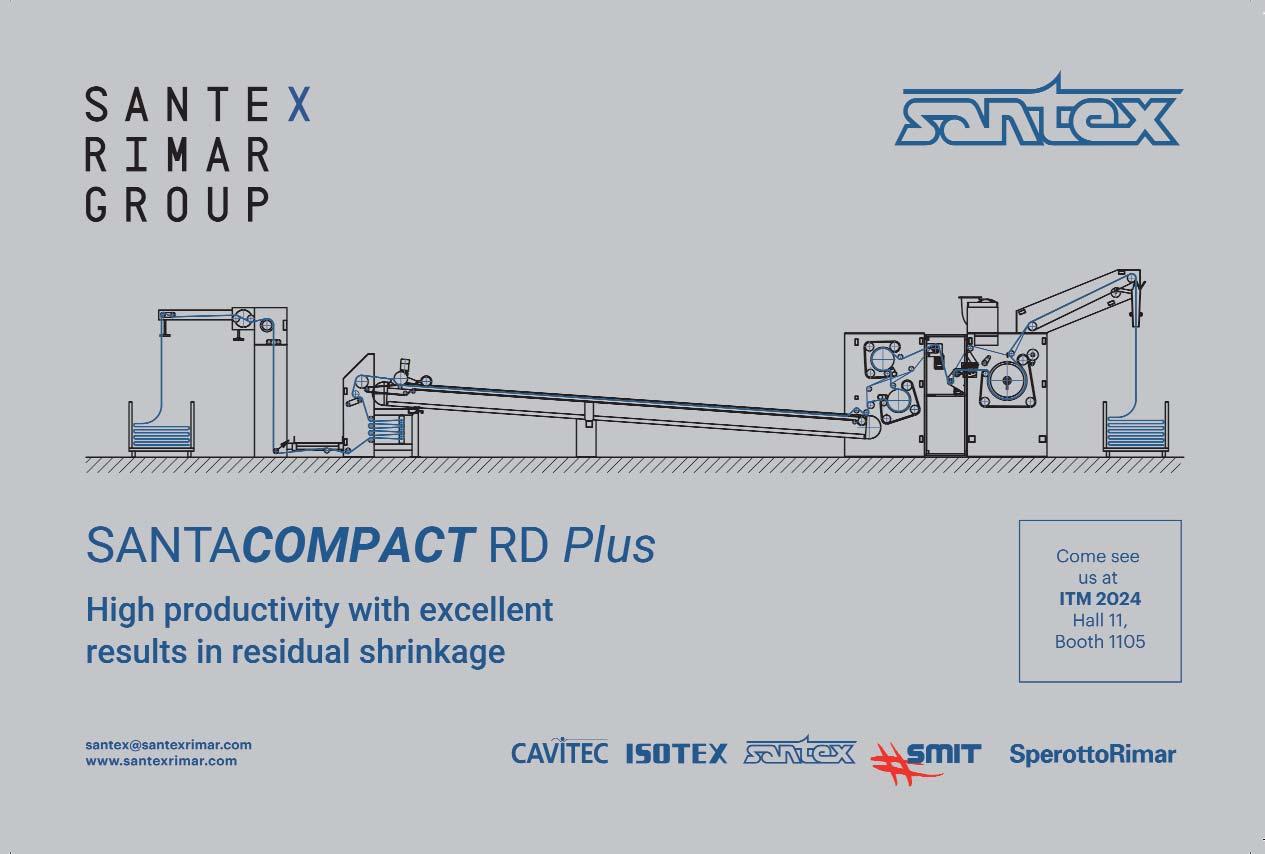 Gary Adams, CEO of the NCC
Gary Adams, CEO of the NCC
Groz-Beckert develops innovative slider needle for circular knitting machines together with Vanguard Pailung
In collaboration with Vanguard Pailung, a manufacturer of ultra-high-speed knitting machines for body-size products, Groz-Beckert has developed an innovative slider needle for a new generation of machines. The new needle technology was presented for the first time at the ITMA in June 2023.
Groz-Beckert offers interested machine builders various cooperation opportunities to jointly develop new products or improve existing ones. GrozBeckert's Technology and Development Center (TEZ) provides the appropriate framework for so-called co-development projects. One successful example of a successful cooperation is the development of a new slider needle for circular knitting machines with Vanguard Pailung.
New slide needle technology for higher productivity
In June 2022, Vanguard Pailung approached Groz-Beckert with a cooperation request. Together with GrozBeckert, the company wanted to develop a new needle solution for an innovative ultra-high-speed machine. Together with an innovative slide needle, the new machine was to exceed the speed and productivity of known knitting systems of large circular knitting machines.
Machine and needle development ran in parallel and were closely coordinated. The first field tests took place in the

Vanguard Pailung laboratory in Monroe/NC, USA in February 2023. The successful development was presented to a wide audience for the first time at ITMA 2023 in June.
Unlike latch needles, slide needles do not form the stitch via a needle latch, but via a slide that is controlled by its own channel. The advantage of this is that the needle can withstand high speeds, as there is no latch impact, which in turn increases productivity.
The use of the new slide neelde in ultra-high-speed machines ensures a particularly high level of process reliability. With the new needle variant, the closer is guided safely and precisely in the groove in the needle shank. At the same time, the base of the needle shank is closed, which ensures maximum stability. The slider needle reliably prevents the socalled latch impact and thus makes a decisive contribution to process reliability. Its use ensures a uniform and speedindependent loop structure, even at maximum speeds.
Transparent and open communication, including the shared use
of data and design specifications, helped to ensure that the project was a success right from the start.
About Groz-Beckert
Groz-Beckert is the world's leading supplier of industrial machine needles, precision parts and fine tools, as well as systems and services for the production and joining of textile fabrics. Its products and services support the fields of knitting, weaving, felting, tufting, carding and sewing.
Groz-Beckert is part of the GrozBeckert Group, which is a market leader in the development, manufacture and distribution of process-critical textile precision tools, industrial cutting solutions, textile reinforcements for the construction industry and composites.
The group consists of the companies Groz-Beckert, TKM and solidian and generated sales of 880 million euros in 2023 with around 9,500 employees worldwide. The company is active in more than 150 countries with agencies, production and sales subsidiaries.
18 PAKISTAN TEXTILE JOURNAL - April 2024 Corporate News


Oerlikon offers sustainable machine and system technologies for the Turkish manmade fibers market
Oerlikon Polymer Processing Solutions present at the ITM in Istanbul
At ITM, Turkey's most important textile machinery exhibition, more than 1,000 international exhibitors will present themselves from 4 to 8 June 2024 at the Tuyap Fair and Congress Center in Istanbul. Oerlikon's Polymer Processing Solutions division and its joint venture partner BB Engineering will once again be taking part. The experts from both companies will be providing information about their sustainable machines and system technologies at the Tekstil Servis stand in Hall 7, Stand 706.
The machine and system manufacturer will be presenting trade fair visitors with complete solutions from melt to yarn, fibers and nonwovens. "Our customers are showing great interest in factory projects, which include everything from in-house polycondensation systems to texturized yarn and corresponding digital solutions. From melt to yarn and beyond, indeed," explains Sales Director Oliver Lemke. The unbeatable advantage of such concepts: the supply of all process
steps from a single source promises harmonised technology, the design of which ensures the high quality of the yarn produced.
Focus on sustainability - always
Another focus of information is the topic of sustainability. There is a lot going on in manmade fiber yarn production in particular: mechanical and chemical technologies for recycling bottles, but also textiles, biopolymers, circular economy - all of this is no longer a thing of the future. With partners and subsidiaries such as Oerlikon Barmag Huitong Engineering (OBHE) and Barmag Brückner Engineering (BBE), Oerlikon Polymer Processing Solutions is presenting concrete concepts here.
e-save celebrates its 20th anniversary
And this in the 20th anniversary year of its sustainability label e-save! It was introduced back in 2004. The current division was therefore already a pioneer in sustainability back then. "Profitable

and sustainable growth for everyone involved is the goal of our company and therefore also our contribution to securing a sustainable future. Performance, quality, sustainability and commitment are the factors that enable our division to face the challenges of the future with confidence every day. With the constant expansion of our e-save philosophy, we are continuously creating and increasing value with high-quality and innovative solutions for the entire textile industry," explains André Wissenberg, Head of Marketing, Corporate Communications and Public Affairs. At ITM, Oerlikon will once again be focussing on the topics of energy, economics, environment and ergonomics.
Recycling is the future
OBHE's homogenisation technology stands for the mechanical recycling of processed polyester (PET) waste such as post-industrial waste (popcorn), bottle flakes and film. The Oerlikon Barmag homogenizer ensures a uniform,
20 PAKISTAN TEXTILE JOURNAL - April 2024 Corporate News
The revolutionary new Oerlikon Neumag EvoSteam staple fiber process is now bluesign® certified.

homogeneous melt, influences the viscosity increase and thus makes it possible to produce defined rPET preproducts for further processing, such as melt, flakes or fiber material for direct spinning. The first plants have already been successfully commissioned worldwide.
Another rPET solution is the VacuFil system from BB Engineering. VacuFil is a unique and innovative PET recycling system that combines gentle large-scale filtration and targeted regulation of the intrinsic viscosity (IV) for consistently excellent rPET melt quality.
EvoSteam - sustainable production of staple fibers
The EvoSteam process from Oerlikon Neumag is considered a pioneer for more sustainable staple fiber production in the future. It impresses with savings in energy, water and raw material consumption, as well as a reduction in operating costs (OPEX) and the CO2 footprint - while at the same time achieving the excellent fiber qualities required by downstream processes and high production volumes.
New bicomponent BCF yarn for the carpet market
With its latest development in bicomponent yarns for carpet production, Oerlikon Neumag is meeting the carpet market's demand for new innovative BCF yarns in terms of quality, efficiency and performance. "The new BICO BCF yarn is characterised by a richer and higher volume while at the same time significantly reducing the consumption of raw materials in carpet production," explains Sales Director Arnd Luppold. At the trade fair stand, interested parties can see sample yarns and carpets, find out about the product range and have indepth discussions with the experts from Oerlikon Neumag about the advantages of BICO BCF yarn in various applications. Into the future with atmos.io
Oerlikon has been successful in the field of digitalisation with its Plant Operation Center (POC) for decades. Over 350 installations in large manmade fiber spinning mills around the world enable the control of complex systems with hundreds, even thousands of mostly WINGS POY or FDY winders. The
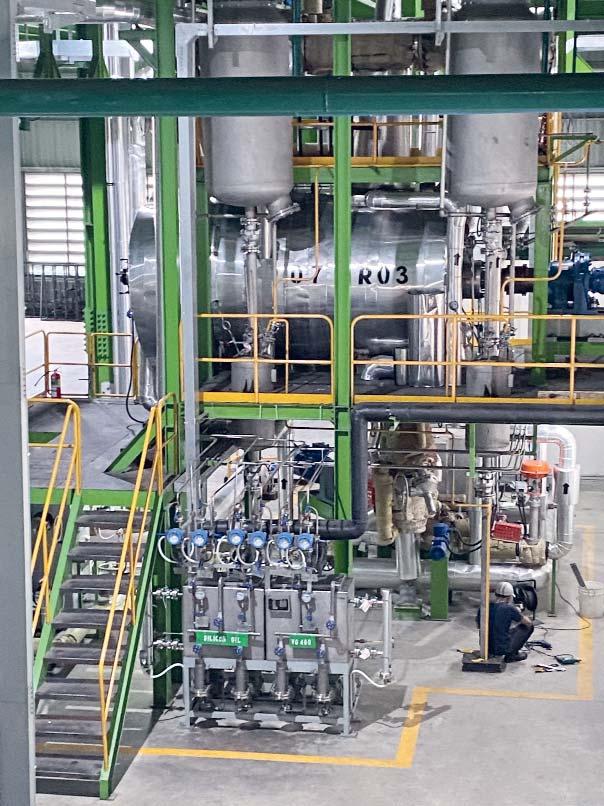
The actual mechanical recycling, including polycondensation, takes place in the OBHE homogenizer. The technology creates a high surface area and, together with the precisely defined residence time, provides more options for influencing the melt.

successful system is now due for an update. With atmos.io, it will be possible to process even more data in the future.
This will give customers even more benefits and put them in control of the data flow in their business.
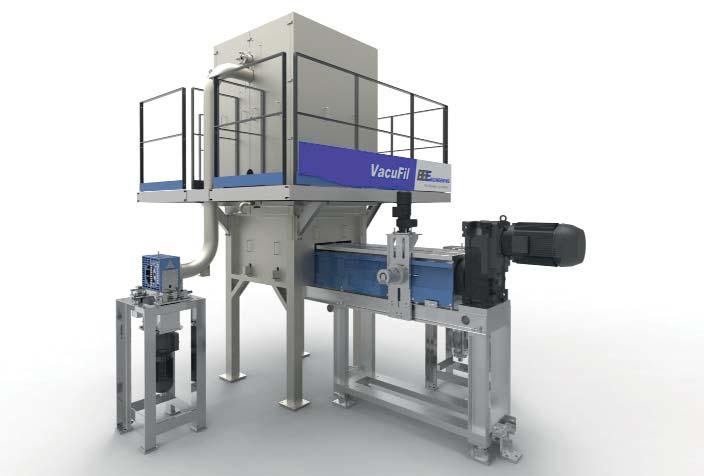
21 Corporate News
BB Engineering's VacuFil system recycles post-consumer and post-production polyester waste.
EDANA: European Nonwovens production decreased by 5.7% in 2023
EDANA, the leading global association advocating the benefits of nonwovens for society, released today an overview of the high-level figures from the EDANA Statistics Report on Nonwovens Production and Deliveries for 2023.
In 2023, compared to data from 2022, nonwovens production in Greater Europe decreased in volume by 5.7% to 2,864,840 tonnes, and by 5.5% in surface area resulting in 81.7 billion square metres of nonwovens being manufactured. However, differing trends were observed at the national level when comparing production between Greater European countries, and also when assessing the various production processes of nonwovens and market segments.
Jacques Prigneaux, EDANA’s Market Analysis and Economic Affairs Director, further expanded on the data: “European nonwovens production recorded its second consecutive decline since it peaked in 2021, however, it is necessary to refine the data further and assess the trends according to the different production processes. For drylaid, the production of thermally and chemically bonded nonwovens both demonstrated a double-digit decline. The production of polymer-based nonwovens decreased again, but remained above its 2019 level, despite a severe decrease in meltblown stand-alone materials. Meanwhile some production processes, such as drylaidhydroentangled and short-fibres airlaid, stayed flat or slightly above their respective levels for the previous year.”
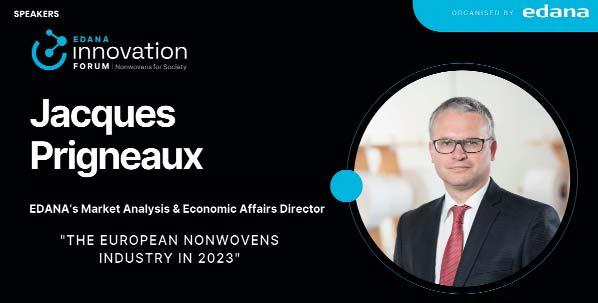
From the end-use perspective, analysing 2023 data by market segment also leads to a different conclusion. Prigneaux highlighted major trends observed regarding European manufacturers global sales: “If we consider sales both within and outside Europe, segments such as hygiene, medical (other applications than face masks), building construction, filtration, and electronic materials significantly decreased compared to their 2022 levels, but were either at the same level as or above figures observed in 2019. Overall, the wipes’ market, including personal care, industrial, and household segments, was stable (+0.9%). There were some noticeable exceptions in other applications, where nonwovens sales recovered: automotive interiors (+3.7%), agriculture (+7.7%), table linen (+4.2%), cotton pads (+6.8%), personal protective garments (+10%) and packaging (+9.5%).”

Jacques Prigneaux elaborated further that “trends for surface area data can be different, as the product’s weight is also important. As a result, EDANA’s figures in square metres continue to provide our member companies with important information year after year.”
EDANA would like to thank its member companies – especially new members – for participating in this annual survey and for delivering their information and data on time. An increased membership base, combined with continuous monitoring of the industry, makes EDANA’s statistics a valuable business tool for all its member companies across the nonwovens value chain.
The data is not shared externally, however, Prigneaux will present an overview of the key findings at the inaugural EDANA Innovation Forum in Munich, Germany in June 2024. In the meantime, a summary report – 2023 European Nonwovens Markets Insights –will be made available soon for EDANA members.
The EDANA Innovation Forum will explore the significance of innovation for nonwovens and what it entails. While innovation is typically associated with Confidential Business Information, partnerships can be the key to success, and it’s possible to discuss innovation without revealing business secrets or risking your intellectual property.
The Forum will address topics from why innovation fails to technological innovations and is the perfect place for participants to network, collaborate, and lead the way in today's dynamic nonwovens business landscape. Throughout the Forum, there will be plenty of opportunities to meet and exchange with other attendees be it by engaging in discussions at the tabletops or during the evening reception.
22 PAKISTAN TEXTILE JOURNAL - April 2024 Corporate News
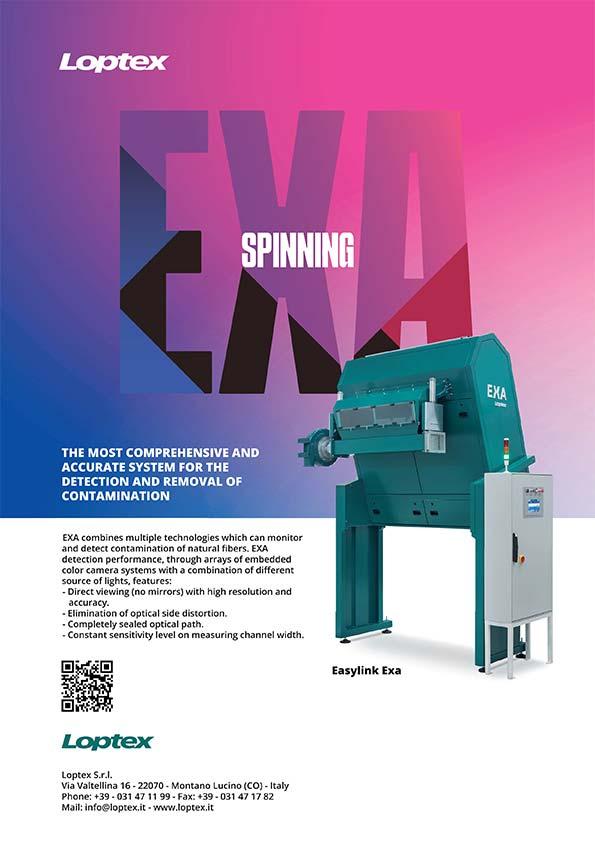
Better Cotton Pakistan supports emission reductions via new MOU
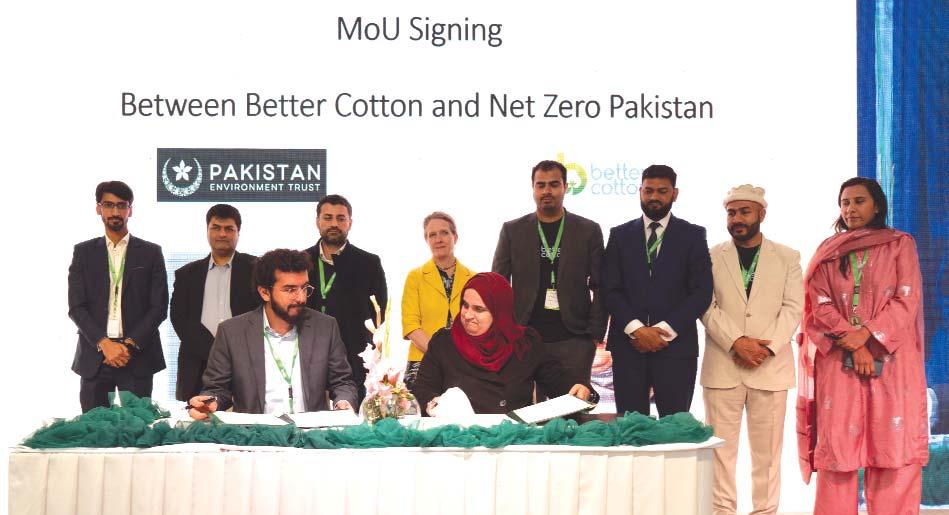
Better Cotton Pakistan has signed a Memorandum of Understanding (MoU) with Net Zero Pakistan (NZP) to promote sustainability on cotton farms across the country and explore ways in which carbon emissions can be reduced.
Net Zero Pakistan, a coalition of national companies, public institutions and sectoral experts, was launched in 2021 by the Pakistan Environmental Trust with a goal to ensure that Pakistan’s carbon emissions do not exceed the amount absorbed by the atmosphere by 2050.
Its signatories commit to measuring and disclosing their Scope 1-3 greenhouse gas emissions – those relating to internal and supply chain activities –and following a roadmap to deliver improvements.
This MOU with the coalition will be founded on the basis that, as a field-level organisation, Better Cotton is uniquely positioned to drive change at scale within Pakistani cotton farming communities via our standard system and the promotion of more sustainable agricultural practices.
Soil health is directly linked to the environment’s ability to capture and store carbon, which helps combat the effects of greenhouse gasses in the atmosphere while providing the ground with beneficial microbes.
There are more than 500,000 licensed Better Cotton Farmers in Pakistan which work across more than one million hectares of land. In total, more than 1.5 million smallholder farmers produce cotton in Pakistan, with little to no protection from the effects of climate change.
In 2022, 40% of the country’s cotton crop was lost due to severe floods caused by climate change. Better Cotton champions agricultural best practice to make cotton farming communities more resilient to extreme weather conditions –which, according to the cross-industry platform Cotton 2040, will impact cotton growing regions with increasing frequency.
The MOU stipulates that Better Cotton and NZP will collaborate to:
Calculate emissions produced at the field level and identify how these can be reduced
Hina Fouzia, Director of Better Cotton Pakistan; Our commitment to the production of more sustainable cotton in Pakistan is one shared by Net Zero
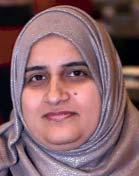
Pakistan, which, since 2021, has itself had a notable impact on the country’s sustainability journey. We are excited to start this collaboration and explore opportunities to drive further improvements in cotton farming communities.
Increase productivity and the production of more sustainable cotton
Implement quality improvement programmes throughout the value chain
Identify and establish better market linkages capable of streamlining industry collaboration
Develop joint initiatives for collaborative fundraising that would benefit Better Cotton’s mission in the country Promote Better Cotton’s mission and benefits both domestically and internationally.
24 PAKISTAN TEXTILE JOURNAL - April 2024 Corporate News

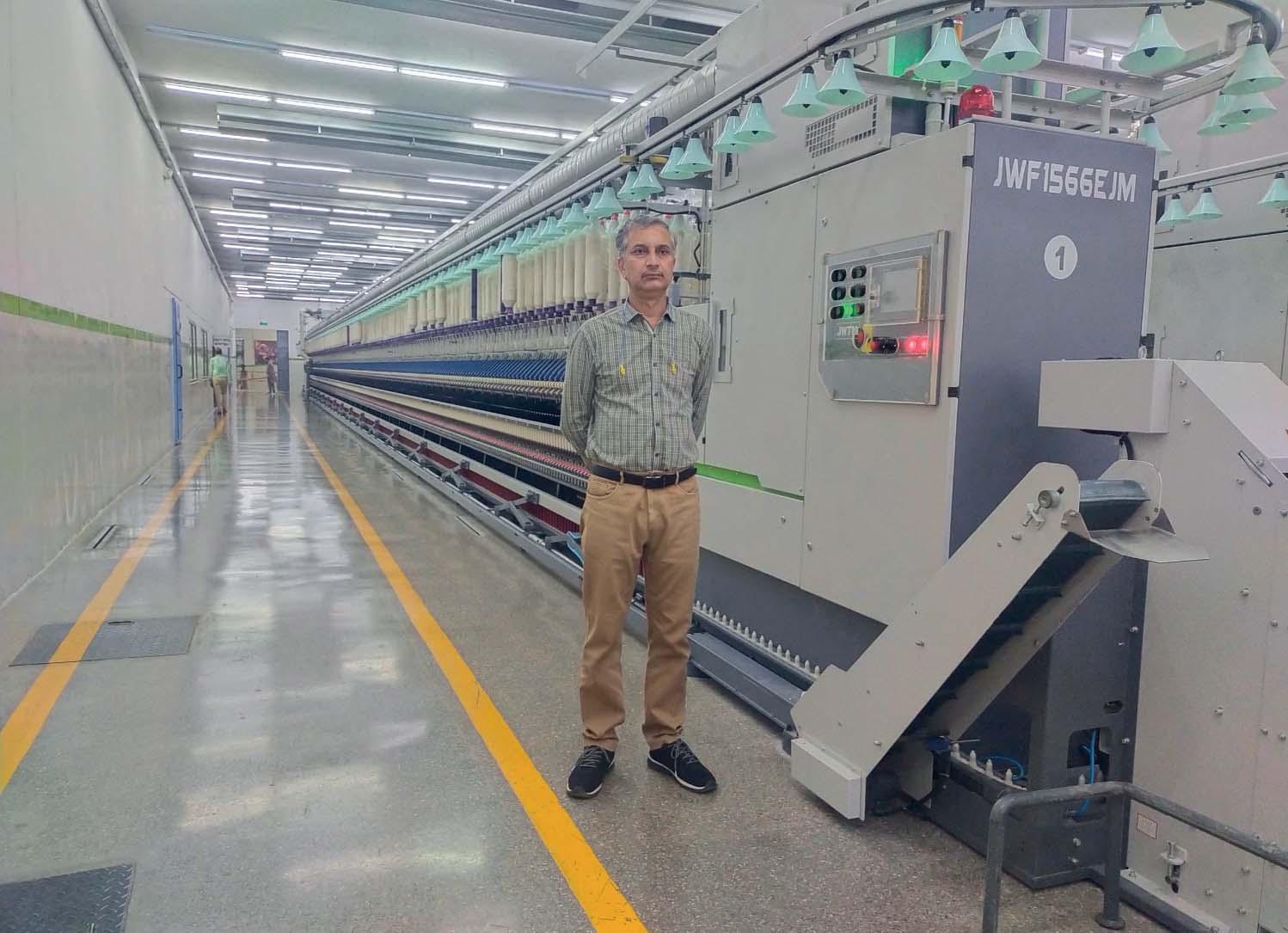

Novibra’s NASA with CROCOdoff –Less Maintenance and Higher Profit
Selecting the right spindle for an application is key for the efficiency of a spinning mill. Kohinoor Textile Mills found the best combination with the NASA spindle and the clamping crown CROCOdoff. Kohinoor Mills now profit from almost 65 kg additional yarn production per machine and month.
The first-ever spindle to run at 30 000 rpm – NASA HPS 68 – is famous for extending service periods, reducing noise levels and ensuring maximum durability. Novibra’s flagship and best-seller NASA HPS 68 has already convinced premium machine manufacturers.
Installations in the optimum range for NASA HPS 68 (Fig.1) – at medium to fine yarn counts and 20 000 to 30 000 rpm speed – represent a completely different type of load on the spindle than coarse
yarn count applications. Smaller repeated loads at high frequency occur causing micro vibrations. Therefore, a chamber filled with lifetime grease was introduced as a second damping system. This reduces the overall noise levels significantly, which in turn improves the work environment of the spinning mill.
The right crown for every spindle
To leverage on its spindle portfolio, Novibra also provides an extensive range of clamping crowns for underwindingfree doffing. The primary goal is to boost customer competitiveness by ensuring low maintenance with maximum productivity. Based on the machine type, doffing system and raw material or yarn count, Novibra offers designs from replaceable EASYdoff to sturdy steel crowns and from SERVOgrip to self-
cleaning CROCOdoff. For coarser yarn counts CROCOdoff Forte is recommended.
Boost production while limiting costs
Kohinoor Mills is one of Pakistan’s largest vertically integrated textile operations with more than 1 800 employees. The company delivers over 70 million meters of worldclass grey, white and dyed fabrics to leading fashion brands and retailers around the globe. It is involved in three major businesses: weaving, dyeing and finishing and energy. Kohinoor Textile Mills’ Limited spinning production facilities in Rawalpindi, Gujjar Khan comprise 158 544 ring spindles, 384 MVS spindles, and 2 712 rotor spinning boxes capable of spinning a wide range of yarn counts using cotton and man-made fibers.
26 PAKISTAN TEXTILE JOURNAL - April 2024
Fig.2: Muhammad Irfan, General Manager of Kohinoor Textile Mills Limited, appreciates the reliable products and the efficient maintenance
To remain competitive, Kohinoor Textile Mills continuously monitors all its cost factors to keep them at the lowest possible levels. With the ongoing rise of labor and energy costs, the company looked for ways to further optimize its operations. On one hand, Kohinoor Textile Mills invested in renewable energy, with the ambition to balance sustainability and profitability. On the other hand, the company turned to Novibra to boost its production while limiting costs.
Reliable products for more effective maintenance
The company equipped part of its ring spinning machines with 21 600 NASA HPS spindles and clamping crown CROCOdoff for underwinding-free doffing. The combination of NASA HPS spindles and CROCOdoff clamping crowns eliminated expensive and time-consuming machine downtimes that are related to cleaning. Kohinoor Textile Mills is thus able to run its machines 10 to 15 minutes longer daily, which corresponds to an additional 2.18 kg (4.80 lb) yarn production per machine per day for 1 200 spindles, equivalent to 64.8 kg (1.44 bags) additional production per month. The quality parameters are also excellent as the company operates its machines to the required speeds with minimum slip variation.
Kohinoor Textile Mills also successfully installed a solar plant system which results in significant energy savings. Thanks to the outstanding features of both Novibra products, Kohinoor Textile Mills benefited from lower downtime, better labor usage and higher energy saving.

“We have a very strong and long-standing working relationship with Novibra based on the following points: consistent products with very good life duration, reliability of products to help maintain our maintenance cycle for such huge volumes of spindles very effectively and remarkable aftersales service and quality,” says Muhammad Irfan, General Manager of Kohinoor Textile Mills Limited (Fig. 2).
 Fig.1: NASA HPS 68 with CROCOdoff – an effective combination
Fig.1: NASA HPS 68 with CROCOdoff – an effective combination

Archroma introduces ALBAFIX® ECO PLUS, a unique state-of-the-art wetfastness improver for long-lasting colors without compromise
Archroma, a global leader in specialty chemicals towards sustainable solutions, has developed a new wet-fastness improver that helps brands and mills produce durable clothing, towels, linens and other textile products with long-lasting colors without compromising on quality or introducing hazardous chemicals.
ALBAFIX® ECO PLUS is a nextgeneration fixing agent that delivers the strongest possible wet-fastness for all reactive dyes on cotton and other cellulosic fibers and polyester-cotton blends. It will not change the shade of the dyed fabric or negatively impact lightfastness. The breakthrough product also avoids production challenges – such as foaming, acid hydrolysis and migration problems during drying – to promote efficiency and quality output.
Crucially, ALBAFIX® ECO PLUS complies with global eco-standards and
initiatives, including Global Organic Textile Standard (GOTS), bluesign® and the Zero Discharge of Hazardous Chemicals (ZDHC) Roadmap.
“With ALBAFIX® ECO PLUS, brands and mills can achieve the strongest possible wet-fastness on cellulose fibers without the drawbacks associated with traditional fixing agents for reactive dyes. This innovation makes it possible to produce high-quality garments and textiles that last longer because they won’t fade, stain or bleed when exposed to laundering. At the same time, they comply with current and anticipated industry sustainability standards, enhancing consumer confidence and helping brands verify their green claims,” Anish Paliwal, Market Segment Director, CEL & Blends, WO Casual, Formal & Home Textiles, said. He also added, “This is all part of our newly launched Super Systems+ that help textile and apparel
brands, retailers and mills positively impact their economic and environmental sustainability, and reflects Archroma’s commitment to delivering a more sustainable ecosystem.”
ALBAFIX® ECO PLUS is suitable for jet applications, and for other dyeing and washing equipment with vigorous liquor circulation, and can also be applied by exhaustion, by padding or from the last bath of the soaping process after dyeing or printing.
Like ALBAFIX® ECO, the latest addition to the ALBAFIX® family has a positive influence on chlorine-fastness. When applied with double fixing, it achieves the same high performance on polyamide and PA/Elastane fabrics, as it does on cellulosic fibers. This makes it ideal for the production of swimwear, as well as sportswear and outdoor clothing.
28 PAKISTAN TEXTILE JOURNAL - April 2024 Dyes and Chemicals

DOMOTEX asia/CHINAFLOOR 2024 prepares to welcome a growing number of international buyers for its 26th edition
The leading flooring show in Asia Pacific, taking place in Shanghai from 28th to 30th of May, 2024, continuous to receive a positive response from both ends of the supply chain. All indicators point to a highly international event.
More than 1600 exhibitors from over 40 countries will participate at the show and meet with an estimated number of over 85,000 professional visitors, coming from China and more than 110 different countries. According to the progress of the online visitor registration system, opened just a month, it is expected, in particular, a considerable increase on the international visitor participation compared to 2023 edition of domotex.
Building on the success of the 2023 edition, DOMOTEX asia/CHINAFLOOR’s goal is to encourage and facilitate the participation of the international flooring professionals in a unique platform which brings together the vast opportunities that the Asian markets offer to the industry. Various international delegations and more than 150 individually selected large flooring buyers will be hosted by the organizers this year, for tailored business matchings, networking opportunities and enhanced experience. Coming from Southeast Asia, South Asia, Oceania, Europe and more, these delegations are put together in partnership with regional industry stakeholders, associations and media
partners from all different flooring segments. The show has also launched a Hosted Buyer program which includes exclusive benefits and is tailored for independent buyers who satisfy various criteria.
“Australasian Timber Flooring Association (ATFA) has partnered with DOMOTEX asia/CHINAFLOOR in the past to host groups of buyers from Australia and New Zealand to the show, with the purpose to create opportunities to match the demand of our members, with the suppliers present at the show.” –said Randy Flierman, CEO of ATFA, a long time partner of the event. “Now that China is fully open, we are excited to rejoin forces again with the organizer of the event and facilitate the visitation of our members to the show in 2024. Australia, New Zealand and China are important flooring markets in the APAC region and the trade relations, in general, continue to be strong and mutually beneficial for these countries.” –concluded Flierman.
Federparquet – Italian Association of Wood Flooring Distributors and Installers – is also partnering for the first time with the organizers to host a group of buyers from Italy. Its President, Paolo Nosenzo, said for the occasion “We are honored to have been invited by the show organizers to bring a buyer group from Italy at DOMOTEX asia 2024. This is a great opportunity to establish new connections
and partnerships between our members and Asian suppliers of certified quality flooring products, in conformity with European Union requisitions and in line with the unmissable sustainability principles. The demand in our market has recently undergone significant developments and requires continuous adjustments from the manufacturers and suppliers. Federparquet follows closely all the consumption trends and aims to introduce to the market the latest innovations and technologically advanced products.”
Asia, in general, and China, in particular, continue being important sourcing markets for the flooring businesses, bringing to the industry some of the most innovative, eco-friendly and technologically advanced products and solutions. Despite of the current challenging global economic situation, China’s GDP grew by 5.2% in 2023, according to the National Bureau of Statistics. The Chinese government continuous its open approach to strengthen the international partnerships and enhance mutual trade. In particular, the waiving of entry visas for passport holders of important markets such as Germany, France, Italy, Spain, the Netherlands, Switzerland, Thailand, Malaysia, Singapore and others, further facilitates the participation of international players at the trade events in China.
29
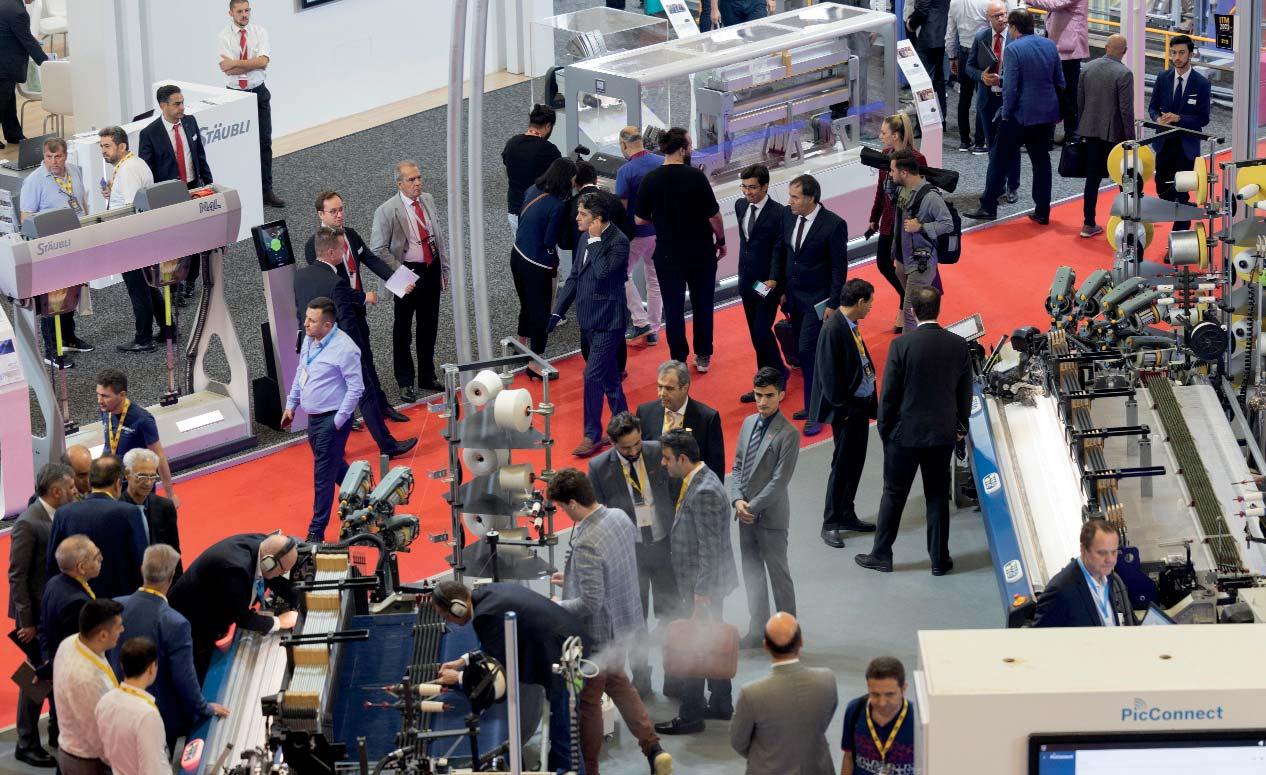
ITM 2024 gets ready to bring textile technology leaders together with global buyers
ITM 2024 Exhibition, where world brand companies in textile machinery and technologies will introduce the latest products they have developed, will host a unique experience with the diversity of exhibitors, visitor profile and the business volume it creates. Visitors to ITM 2024 Exhibition will have the opportunity to discover the technologies that will shape the future of textile.
When the dates show June 4-8, 2024, İstanbul Tüyap Fair and Congress Center will open its doors to host “ITM 2024 International Textile Machinery Exhibition”. ITM 2024 Exhibiton, which will be organized this year with the motto “Discover the Future”, will offer an unmissable opportunity for those who want to discover the latest innovations in the sector, establish new business contacts and shape the textile world of the future together. The newest products to be exhibited at ITM 2024 Exhibition, which will bring together more than 1200
domestic and foreign companies; will meet with thousands of qualified buyers. The companies that will attend in the ITM 2024 Exhibiton, where a billion euro business volume will be realized; will have the opportunity to cooperate with the pioneers of the world textile industry.
Visitors to the ITM 2024 Exhibition, where innovations from every field of textile from weaving to knitting, from yarn to digital printing, from finishing to denim will discover innovative, natureprotecting and pioneering technologies in digitalization for a sustainable future. Company owners who will be able to get information from experts about the technologies they will use in their factories; will develop their products and direct their investments.
Global investors will prefer ITM 2024
The textile machinery sector will make a big leap with the latest technologies to be exhibited at ITM 2024 and new
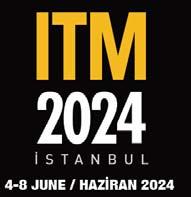
investment decisions to be taken. Delegations and global textile investors from many countries such as Pakistan, Bangladesh, Uzbekistan, India and Egypt, where textiles are active, will prefer ITM 2024 Exhibition. Thanks to the machine sales and business partnerships of manufacturers from all over the world; the textile machinery sector will gain a great momentum in the world and in Turkey.
Number of halls increased at ITM 2024 Exhibition which attracted great interest
Exhibitor companies, which achieved visitor numbers and sales figures above their expectations in the exhibitions they attended in the past years, requested to enlarge their stands for ITM 2024. There has also been a significant increase in the number of companies that attending the ITM 2024 Exhibition for the first time. In line with its goals of expanding the exhibitions, the ITM Team increased the
30 PAKISTAN TEXTILE JOURNAL - April 2024
number of halls from 12 to 13 in order to meet the increasing demands of companies and new exhibitors. Thanks to the expanded exhibition area, companies that have enlarged their stands and have the opportunity to take part in the exhibition for the first time will have the chance to exhibit a wider range of products and services.
Sustainable denim technologies at ITM 2024
The 'Denim Technologies Special Section', which was opened for the first time at ITM 2022-International Textile Machinery Exhibition, which broke records with both exhibitors and visitors from all over the world, attracted great interest from the exhibitors. Denim technology manufacturers, which reached a visitor and sales figure above their expectations at the exhibiton, wanted to expand their presence at ITM 2024. The 'Denim Technologies Special Section' was moved to Hall No. 11A, taking into account the demands of machinery and chemical manufacturers such as washing, bleaching, dyeing, cutting, patterning, finishing, drying, drying, ozone used in denim production to be close to the 'DyeFinishing' halls. The 'Denim Technologies Special Section', which will enable companies in the denim sector to introduce their sustainable innovations and latest technologies to the whole world, will guide buyers and brands
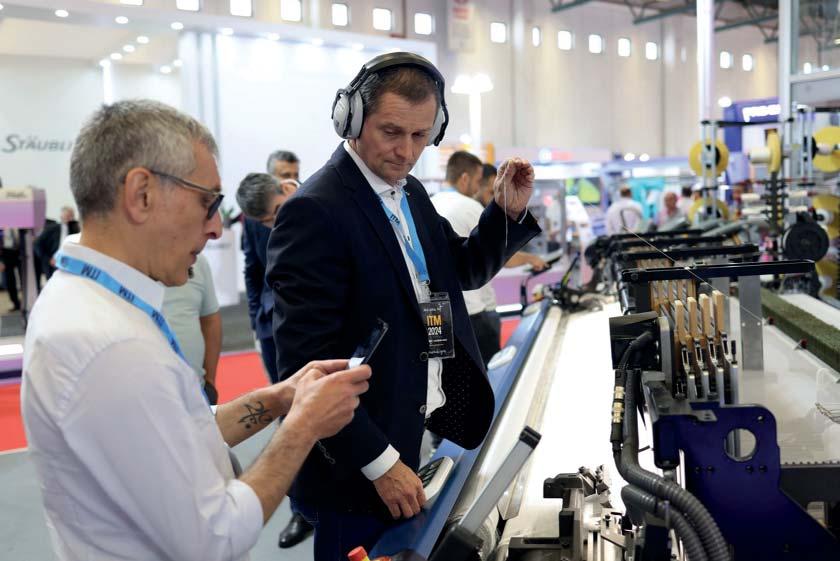
looking for reliable information on sustainable products.
Get your ITM 2024 online invitation at advantageous prices, enter the exhibition out of turn!
The online invitation system that allows visitors to easily enter the ITM 2024 Exhibition has been opened. Those who do not want to miss this great meeting will be able to register online by clicking on the e-invitation link at www.itmexhibition.com. After filling out the visitor information form, the einvitation will be sent to the applicant by e-mail. With this e-invitation, our visitors
will be able to get their badge at the entrance of the fairground and enter the ITM 2024 Exhibition out of turn.
ITM 2024 prepares to break new records
Thousands of visitors from Europe, Central Asia and Arab countries, especially Turkic Republics, will visit ITM 2024 Exhibition to be informed about the latest trends in textile machinery. After the ITM 2022 Exhibition with 102 countries, 1280 companies and 64,500 professional visitors, ITM 2024 will break new records with the number of exhibitors and visitors.

Fairs and Exhibitions 31
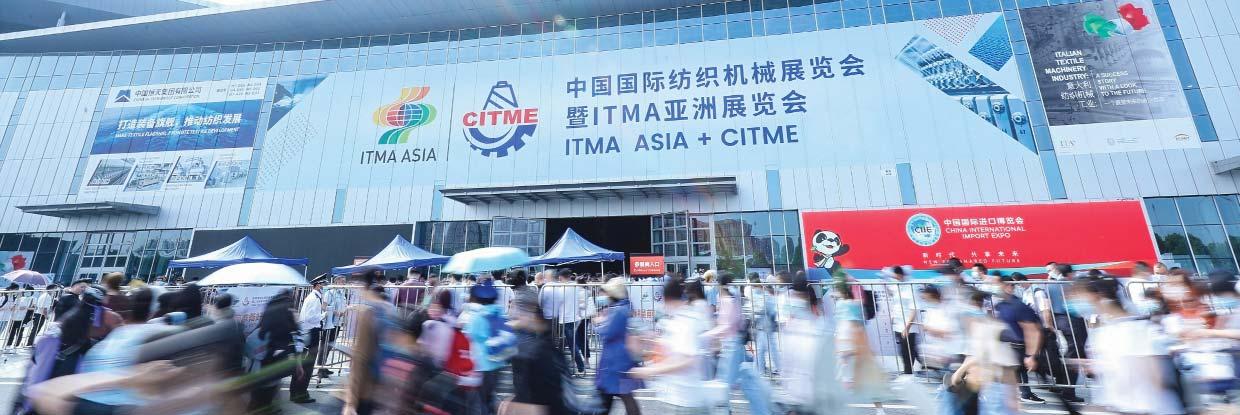
Eagerly awaited ITMA ASIA + CITME Exhibition in Singapore Gears up for opening of space application
The ITMA ASIA + CITME, Singapore 2025 exhibition has attracted heightened levels of interest since it was launched in Milan last June. Drawn by the regional market opportunities, many leading textile technology brands are looking forward to apply for their booth space when online space application opens from 9 April 2024.
The Singapore edition is scheduled to be held at Singapore Expo from 28 to 31 October 2025. It is owned by CEMATEX (the European Committee of Textile Machinery Manufacturers), China Textile Machinery Association (CTMA) and SubCouncil of Textile Industry, CCPIT (CCPIT-Tex).
According to the show owners, there is a huge increase in enquiries from machinery manufacturers as the Singapore exhibition targets not only South and Southeast Asia, but also from very important markets in the Middle East.
Europe and the ITMA ASIA + CITME exhibition in China. The platform will help to broaden our exhibitors’ market focus and diversify their reach, enabling them to effectively engage with many of the buyers who were not able to attend these two exhibitions previously. For these buyers, we are convinced, Singapore is more accessible due to its closer proximity to their home countries, but even more so due to its visa-friendly policy.”
Mr. Gu Ping, president of CTMA, said: “The combined exhibition in Singapore has opened a new phase of development for CITME. We are excited to bring our members along as we ride the wave of regional opportunities through the Singapore edition.”
Mr. Daisuke

of space application for the combined exhibition.


Mr. Ernesto Maurer, president of CEMATEX, explained, “These regions present vast opportunity for our members as technology buyers from these textile and garment hubs are sourcing costeffective and sustainable solutions to modernise and upgrade their production.
“The Singapore exhibition complements our ITMA exhibition in

Murata, president of Japan Textile Machinery Association (JTMA), said: “We congratulate the ITMA ASIA + CITME owners for making the decision to have a second exhibition in Asia. The Singapore exhibition will be useful for our members to better penetrate other regional textile hubs in Asia, and as far as the Middle East.”
Prominent textile technology providers are also eagerly eyeing the start
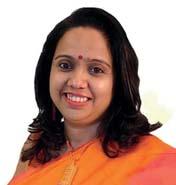
Ms. Rebekka Dilo of Dilo Systems GmbH shared that the group is looking forward to the Singapore edition of ITMA Asia + CITME 2025. She enthused, “As an important gathering of the whole textile industry, it is a great opportunity for us to present our latest innovations.” Ms. Chandrima Chatterjee, secretary general of the Confederation of Indian Textile Industry (CITI), welcomed the staging of the exhibition in Singapore. She said: “This expansion of the exhibition from Shanghai to Singapore recognises the growing needs of the Asian textile industry, especially India. The industry today is looking for technologies to meet its need for optimising production, minimising supply chain risks, better control of quality and finishes, and enhancing sustainability in all aspects of production.”
She added: “We look forward to the Singapore exhibition to address these needs and help this biggest textile manufacturing and exporting region of the world leverage the latest in technology and innovations.”
32 PAKISTAN TEXTILE JOURNAL - April 2024
Mr. Ernesto Maurer, president of CEMATEX
Mr. Gu Ping, president of CTMA
Mr. Daisuke Murata, president of JTMA
Ms. Rebekka Dilo of Dilo Systems GmbH
Ms. Chandrima Chatterjee, secretary general of the CITI
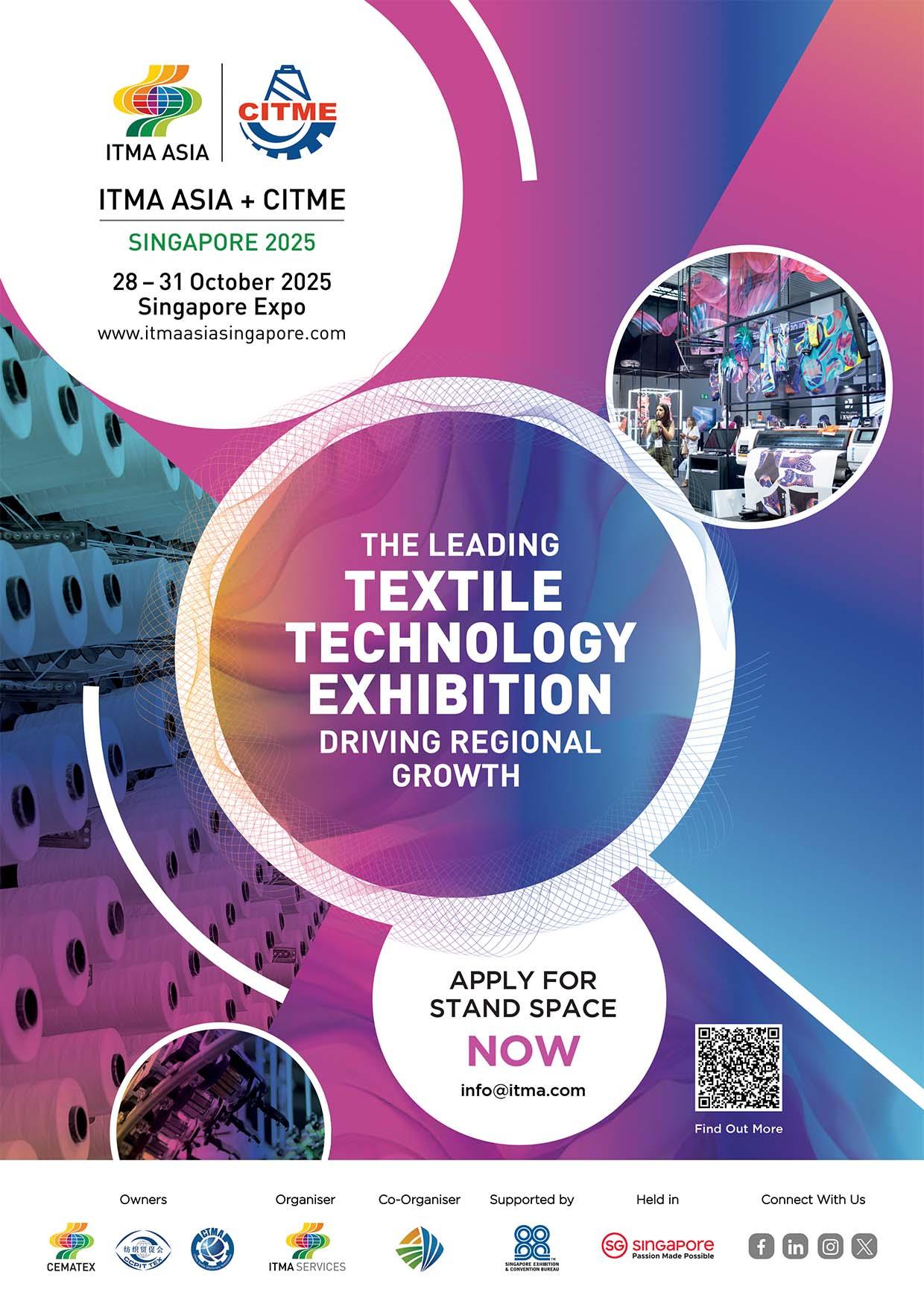

ImageData Group Targets Growth in Display Graphics Market with EFI
Nozomi 14000 SD Super HighSpeed Digital Press
Electronics For Imaging, Inc. reported today that ImageData Group, a leading visual communications provider based in East Yorkshire, U.K., has invested in an EFI™ Nozomi 14000 SD single-pass inkjet printer to ramp up their sign and display volumes and offerings to their customers.
Established in 1986, ImageData Group, a family-owned business, has built a strong reputation for excellence in printing solutions, operating at the forefront of marketing communications, and providing pre-media creative, print, fulfilment, and installation services, with a diverse range of clients across various industries that includes some of the U.K.’s leading retailers and corporations. With a focus on quality, reliability, and customer satisfaction, the company continuously innovates and enhances its offerings to meet the evolving needs of its clientele.
The Nozomi 14000 SD press joins two EFI VUTEk Q5r roll-to-roll printers in the ImageData plant.
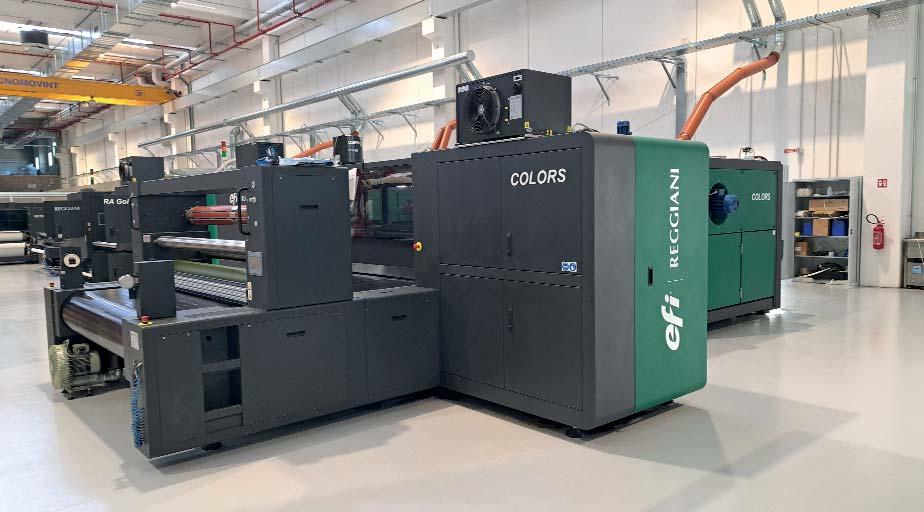
“We are thrilled to introduce the Nozomi 14000 SD to our printing facility in Howden, East Yorkshire,” explained Glen Patrick, COO, ImageData Group. “We are committed to remaining at the forefront of innovation and taking what we offer to our customers to the next level. This investment in the Nozomi will allow us to significantly ramp up our sign and display volumes without losing the
superior print quality. This represents a significant milestone for ImageData and will empower us to keep delivering exceptional printing solutions that exceed our customers' expectations.”
Increased print volumes and profitability
The 1.4 metre Nozomi 14000 SD single-pass inkjet press is specifically designed to disrupt marketplace
Features 34 PAKISTAN TEXTILE JOURNAL - April 2024
expectations for the super high-speed, high-quality production of sign and display applications. The technology facilitates significantly faster speed to market and increased profitability, and the ability to handle a vast range of substrates, from polystyrene, foamboard, and Coroplast® to folding cartons, card stock, and more. This printer delivers maximum productivity of 1,100 boards/sheets per hour and premium quality imaging with CMYK plus optional White, Orange and Violet inks and a 720 dpi effective resolution.
Serious about sustainability
This investment makes sustainable production a key advantage for ImageData. The Nozomi 14000 SD printer with LED curing technology maximises energy efficiency and sustainability. Its 100% environmentally friendly GREENGUARD and GREENGUARD Gold certified inks emit virtually no VOCs and no odour, and they are OCC-certified repulpable and recyclable inks for paper-based substrates, including corrugated containerboard.
Patrick added, “We are mindful of our environmental impact, so the reduction in waste and true sustainable production offered by the Nozomi 14000 SD is really important to us. The lower VOCs and lower energy consumption coupled with more economical use of materials means a reduced carbon footprint as well as reduced running costs, which is a win/win for us and our customers.”
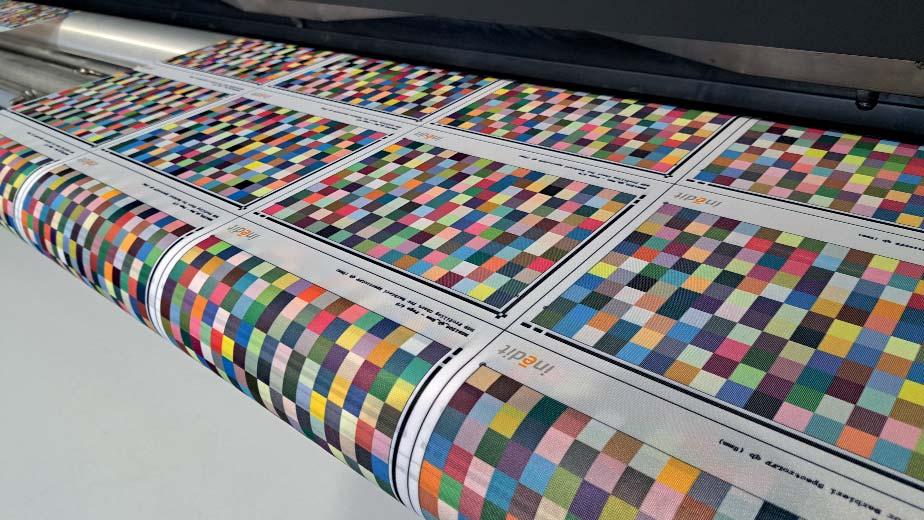
The EFI Nozomi technology advantage
The Nozomi 14000 SD printer will allow print businesses to gain a larger share of the market, boost customer satisfaction and win new business, all while lowering operating and production costs.
“The Nozomi 14000 SD is truly a disrupter for the sign and display market, making ultra-high print volumes coupled with the outstanding print quality brands expect achievable,” said Evandro Matteucci, vice president and general manager, packaging, EFI. “We are excited to be working with ImageData Group on their investment to deliver continuous excellence to their customers and delighted to be supporting them as they provide the numerous benefits of Nozomi technology to some of the U.K.’s biggest brands.”
About EFI
EFI™ is a global technology company, leading the worldwide transformation from analog to digital imaging. We understand our customers want breakthrough technologies to lead them through their digital journey. That’s why we’re passionate about driving their business growth with a scalable portfolio of products, solutions, services, support, and world-class partnerships for the manufacturing of signage, packaging, textiles, ceramic tiles, and building materials with a wide range of printers and inks. They work together to increase profits, cut costs, improve productivity, and optimize efficiency – job after job, year after year. We are devoted to our customers. And we definitely believe we have the right people, technology and experience to help them achieve their business goals.
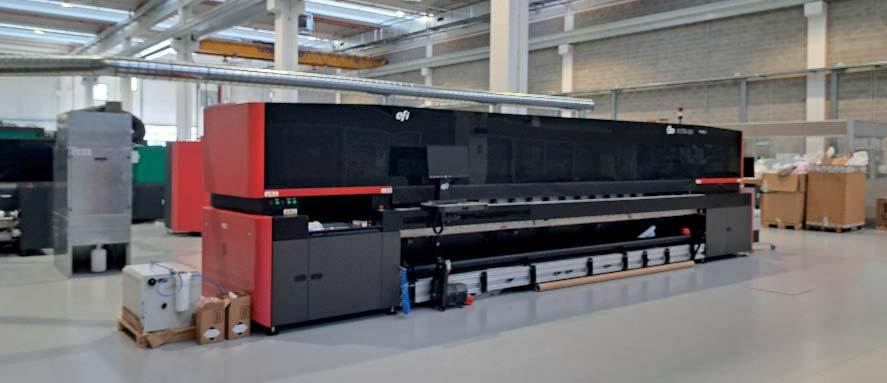
Features 35
Trust Protocol expands regional field-level grower support system
The U.S. Cotton Trust Protocol is introducing an expanded field-level team dedicated to providing regional support for U.S. cotton growers participating in the voluntary sustainability initiative. This includes aiding producers with finalizing Trust Protocol enrollment and data entry as well as applications for the Climate Smart Cotton Program by the April 30 midnight deadline.
Charles “Chaz” Holt is serving as Director of Field Programs and will lead the team which also includes Tillman White serving as Program Manager. Field-level Grower Enrollment Specialists have also been added to the team which will provide not only cotton industry resources and networks, but also the ability to tailor their services to the unique needs of the Cotton Belt region they serve. Grower Enrollment Specialists include Bailey Nesmith serving the High Plains & West Region, Willis Frazer in the MidSouth, and Maryn Findley for the Southeast.
“Each region of the Cotton Belt presents its own distinct set of opportunities and challenges, with no one-size-fits all approach to production,” said Daren Abney, Executive Director of the U.S. Cotton Trust Protocol. “In 2023, we experienced our largest enrollment of planted U.S. Cotton acres yet, which further underscores our producers’ commitment to sustainability and progress. As we move forward, our fieldlevel team is available to offer regionally relevant support to growers as they make continuous improvements. This momentum builds upon the growth in our global supply chain membership, which now includes 40+ companies and their brands, alongside more than 2,000 mill and manufacturer members.”
For the 2023 crop year, more than 1.7m planted cotton acres were enrolled in the Trust Protocol, representing almost a quarter (23%) of the Cotton Belt. Growers who completed their enrollment during either period in 2023 need to reenroll for the 2024 crop year. During
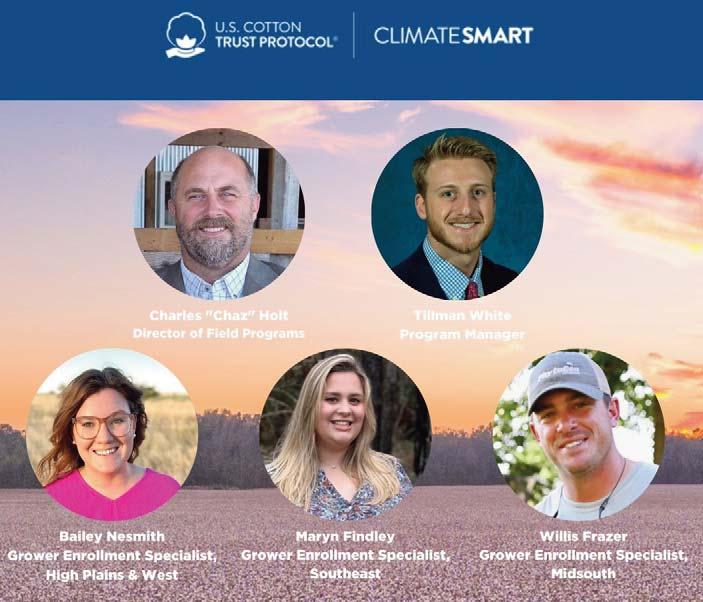
enrollment growers can also apply for the Climate Smart Cotton Program which provides producers with financial and technical support to de-risk the implementation and adoption of Climate Smart Agriculture practices while potentially reducing costs and boosting efficiencies. For brands and retailers, the program aims to help support efforts to improve their greenhouse gas emissions reductions and reporting.
The Climate Smart Cotton program began less than one year ago and has already approved applications for 778 farming entities in Level 1 of the 1,650 available, including 330 from historically underserved communities. Growers are encouraged to get started today as applications are reviewed on a first-comefirst-serve basis.
To complete enrollment in the Trust Protocol and apply for the Climate Smart Cotton Program ahead of the April 30 midnight deadline visit TrustUSCotton.org.
About the U.S. Cotton Trust Protocol
The U.S. Cotton Trust Protocol is the voluntary sustainability program for U.S.
cotton growers, and traceability platform for all U.S. Cotton. It is the only system that provides quantifiable, verifiable goals and measurement and drives continuous improvement in six key sustainability metrics – land use, soil carbon, water management, soil loss, greenhouse gas emissions, and energy efficiency. It is also the world’s first sustainable cotton fiber program to offer article-level supply chain transparency to all members.
The Trust Protocol is also proud to lead the U.S. Climate Smart Cotton Program, a 5-year, collaborative initiative that presents a transformative opportunity for cotton growers to enhance their profitability, operations, and environmental stewardship, all while contributing to the long-term viability of the U.S. cotton industry.
The Trust Protocol is overseen by a multi-stakeholder Board of Directors comprised of representatives from brands and retailers, civil society and independent sustainability experts as well as the cotton-growing industry, including growers, ginners, merchants, wholesalers and cooperatives, mills and cottonseed handlers.
36 PAKISTAN TEXTILE JOURNAL - April 2024
Features
Trützschler and Zagis: Long partnership, strong performance
Zagis S.A. de C.V. is a family-owned spinning and knitting company in Tepeji del Río, Mexico, with a long history, and big ambitions for a more sustainable future. Innovation is at the heart of its 60-year success story. By partnering with Trützschler, it is embracing cutting-edge technologies that boost efficiency, optimize quality and save resources – including the TCO 21 comber!
Today, Zagis S.A. de C.V. is a fourthgeneration business with a leading position in the Latin American textile industry. Its spinning and knitting facilities are able to process a huge variety of fibers, with cotton as its main raw material alongside polyester / cotton blends. Its portfolio covers yarns including ring, open end and airjet spinning. And Zagis is now targeting further success worldwide.
The company operates 13 mills in Mexico that can produce up to 200 tons of yarn and 20 tons of fabric per day in line with international standards. Close cooperation with Trützschler has empowered Zagis to achieve those impressive numbers. As the latest step, it has added TCO 21 combers at its facilities to accelerate progress toward its ambitious growth plans and to produce combed yarns on high quality level.
Trust in Trützschler
“My grandfather founded this business with a sharp focus on the quality of its products and services,” says Rafael Zaga Saba, CEO of Zagis and President of
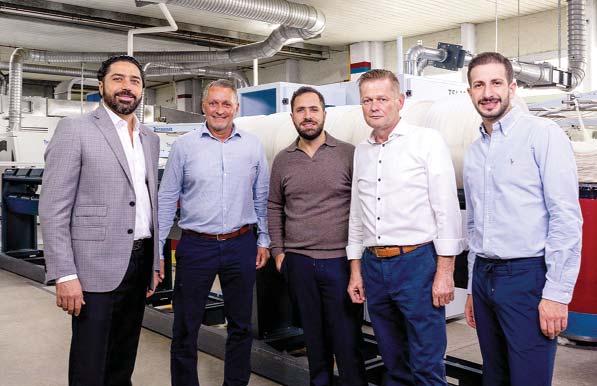
the Mexican Textile Association (CANAINTEX). “That is made possible by state-of-the-art technologies. Trützschler has been a powerful partner for many years. Our factories have operated a great variety of card models and now also combers TCO 21. That shows our deep trust in Trützschler’s machines and technical support.”
Protecting the planet
Zagis also has a sharp focus on reducing its environmental footprint. Since 2020, all of its energy consumption has been covered by renewable power. This enables Zagis to avoid 11,000 tons of CO2 emissions per year. The company is also a member of the Cotton LEADS program, which connects businesses worldwide to lead progress for sustainable cotton sourcing and production.
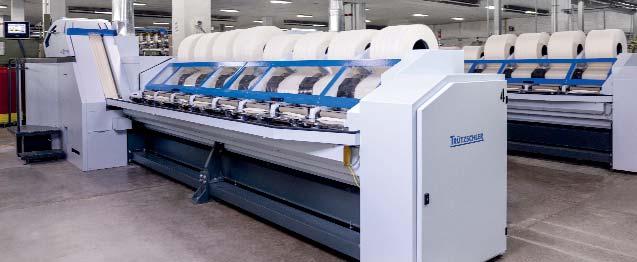
Ambition for highest quality
Modern equipment supports Zagis’ ambition to produce highest quality. Trützschler carding machines, for example, achieve high production output with excellent sliver quality. At the same time, they boost energy efficiency and reduce waste. The TCO 21 combers at Zagis in Tepeji del Río are capable of manufacturing 550 nips per hour with outstanding yarn quality with minimum noil level.
Sharing success
“Zagis and Trützschler are both familyowned businesses,” says Rafael Zaga Saba. “On top of that shared history, we have a common set of values about what our work stands for. Quality and efficiency are incredibly important. We have a deep commitment to technological innovation. And we share a vision of a more sustainable future for the textile industry too. That’s why I am so happy about our partnership with Trützschler.”
For future generations
Looking ahead, Zagis has a clear strategy to expand its position around the globe. In cooperation with Trützschler, it aims to continue its long track record of meeting customers’ needs. And it is striving to maximize its success while also minimizing its environmental impact for future generations.
F.l.t.r: Rafael Zaga Saba (CEO Zagis and President of the Mexican Textile Association, CANAINTEX), Frank Dederichs (Managing Director of Trützschler Mexico), Mayer Zaga Cheja (Chief Financial Officer at Zagis), Ralf Grasmehr (Trützschler Area Manager, Customer Service), Mayer Zaga Dichi (Chief Operations Officer at Zagis)
37 Features
The TCO 21 at Zagis

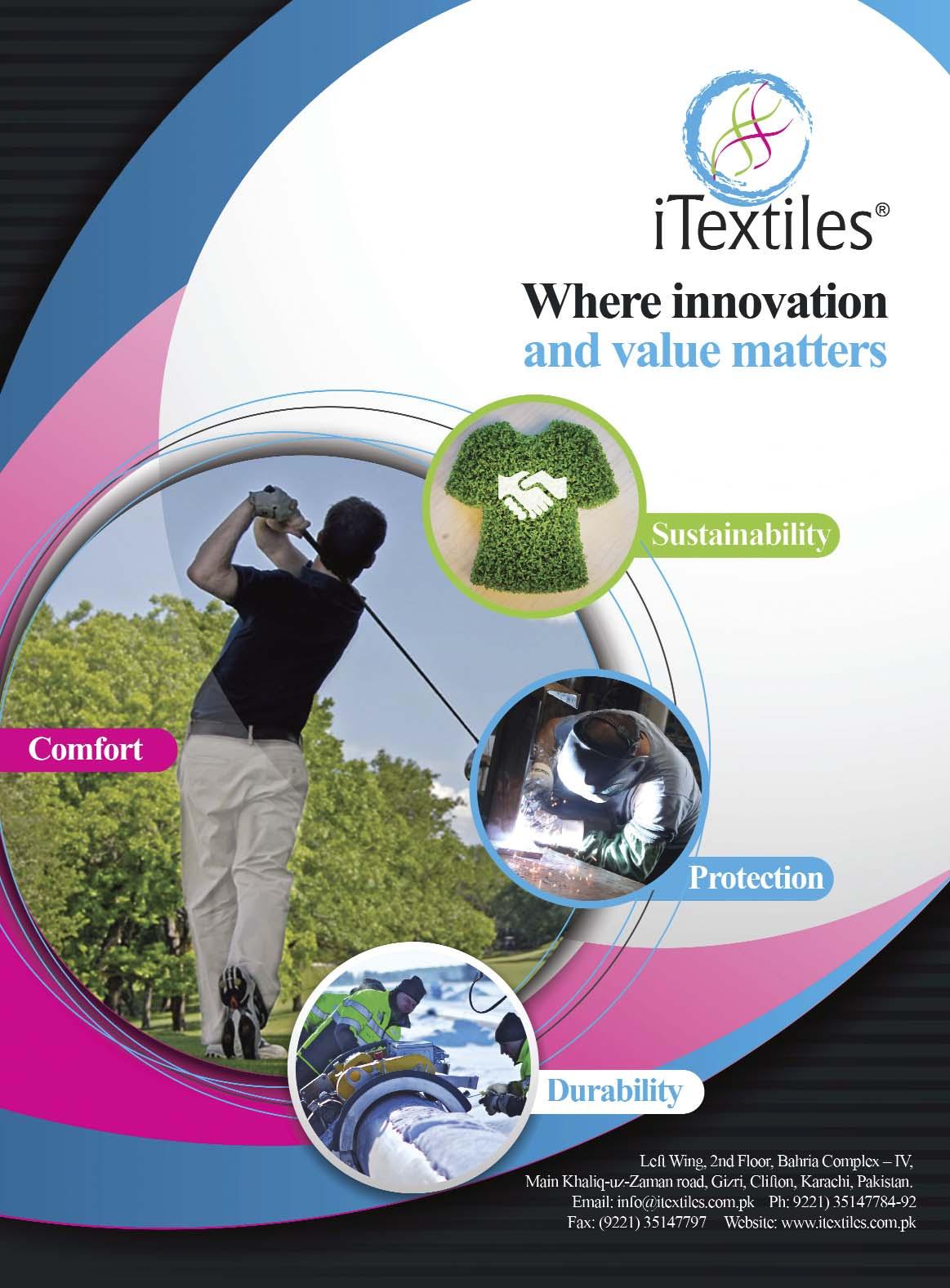
From manual to automated fabric inspection
Step up to assured fabric quality for technical and sensitive applications
Uster Technologies offers a flexible solution to upgrade fabric inspection from manual to automated. Integration in existing production lines is quick and easy, and the data flow also brings extra benefits. It means fabric producers can significantly improve their yield with fast, accurate quality monitoring.
Any change starts with a new thought and a clear intention – but sometimes it takes time to make it happen. That’s because issues might be expected during implementation. But that’s not the case when switching from manual to automated fabric inspection with Uster. This article presents the key points, and offers further options for total understanding: discussing the benefits with an Uster expert at the upcoming Techtextil or on another occasion; or taking part in a special webinar on April 11.
The path to automation
For maximum benefits – up to 50% lead time savings and 80% less waste –automated fabric inspection combines Uster EVS Fabriq Vision with Uster Fabriq Assistant. This integrates a reliable and sophisticated inspection system, delivering vital data, with practical analysis of that data to deliver the best results for users.
Prerequisites for automatic fabric inspection begin with a detailed evaluation of the current process, to identify the critical steps. Typical questions users will be asked include “what kind of optimization do you expect and what changes would you like to make to the production process?” Or “how does your final process step look before you ship the fabric to your customer?”
At the end of this analysis, the steps towards integration are planned, including the choice of the right hardware and software needed to achieve automation in the fabric inspection process.
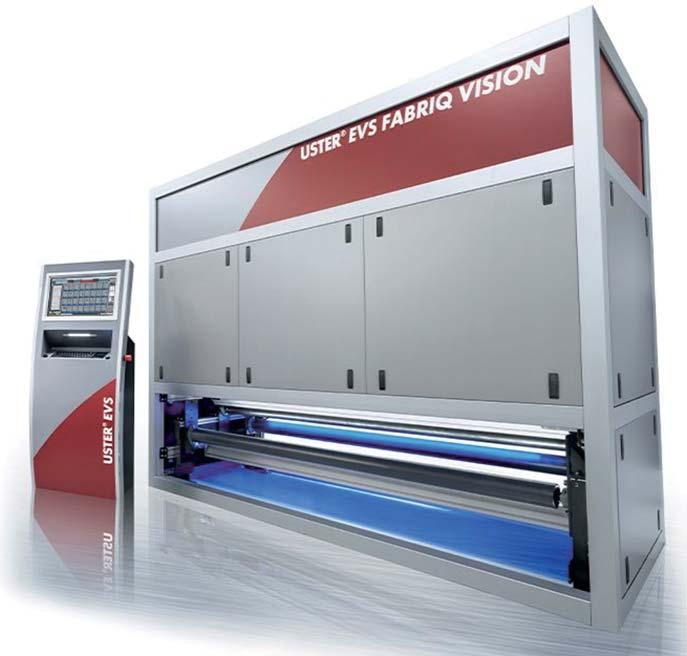
The Uster Fabriq Vision inspection solution can be integrated into existing production lines – or used as an off-line inspection system. In both cases, the preconditions for optimal results from the optical system are the same: smooth and tension-controlled fabric flow, no creases in the fabric, stable light conditions in the inspection area and no dust or lint on the fabric.
The inspection cameras feature stateof-the-art technology, positioned at various detection angles. Sophisticated illumination makes defects visible and raises detection performance to the maximum. Uster EVS Fabriq Vision provides real-time alerts for operatives, showing all defects and automatically creating roll inspection charts. All detected faults are collected in a dataset and transferred to Uster Fabriq Assistant.
Data flow
Data generated by Uster fabric inspection systems feeds to Uster Fabriq Assistant, which creates statistics for quality and process improvement. Its automated features make Uster Fabriq
Assistant more efficient and productive, as a reliable and tailored solution for processing, analyzing, and visualizing quality data.
Connecting data is no longer a big deal. The Uster solution offers an open interface to transfer data to the ERP system and to the Optimized Cut Control (OCC), allowing maximized yield. Uster recommends a customer workshop to discuss data requirements, key parameters, data flow in production and how to create a powerful infrastructure.
Additional benefits
OCC allows an increased fabric yield after inspection. It is a software tool using the defect map from inspection, enabling automated cut optimization to be installed on any existing debatching or cutting line. It automatically identifies the correct cutting position for maximum fabric yield according to the customer’s quality requirements, and makes the cutting process highly efficient.
Invisible synchronization marks (applied during inspection) indicate the position of defects and cut positions in a
Features 40 PAKISTAN TEXTILE JOURNAL - April 2024
Uster EVS Fabriq Vision – the fabric quality assurance system
roll, so these are always under control, allowing the cutting table to run at maximum possible speed.
When color consistency is critical, Uster EVS Fabriq Shade supports fabric producers to deliver a constant shade in end-products. The system provides standard shade measurements with high accuracy and continuously qualifies shade variation, based on a set reference point. To ensure
lots have optimal color uniformity, the system offers grouping according to shade, for best fabric yield. Combining Uster EVS Fabriq Shade and Uster EVS Fabriq Vision in one process provides all relevant quality data in a single operation and increases the efficiency of fabric inspection.
The change explained
Automated fabric inspection requires newly-configured logistics as part of the detailed set-up plan –including a clear and traceable data flow for a paperless production. Finally, the calculation of the ROI will assure customers that profitability – as well as efficiency and quality – will also increase.
Ingo Kiefer, Senior Textile Technologist
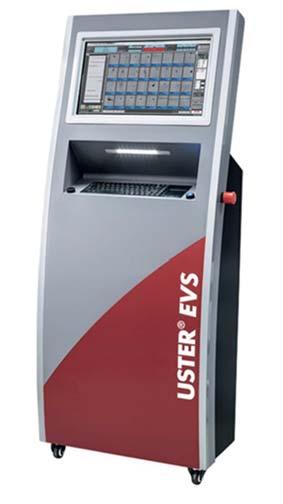
for fabric inspection at Uster Technologies, takes participants through the transition from manual to automated fabric inspection at the upcoming webinar. Ask questions and register here.
Uster Technologies also invite interested parties to face-to-face discussions at Techtextil Frankfurt, from April 23 to 26, 2024. Meet their fabric inspection experts at the Elmatex booth D63 (Uster agent for Germany) in hall 12.
DyStar clarifies misconceptions regarding receivership/sale of DyStar shares
DyStar Group issues this statement to clarify any misconceptions regarding the recent appointment of receivers over the enbloc sale of the shares in DyStar.
1. For clarification, the court appointment of receivers is solely for the purpose of facilitating an enbloc sale of the shares in DyStar.
2. It is important to emphasize that this action does not lead to any change in DyStar’s ongoing business operations, and the Company is still fully managed and run by its management team.
We would like to reassure all stakeholders and interested parties that DyStar is in a strong financial position. The Company is not experiencing any shortage of funds, is cashflow selfsufficient, and does not depend on external borrowing.

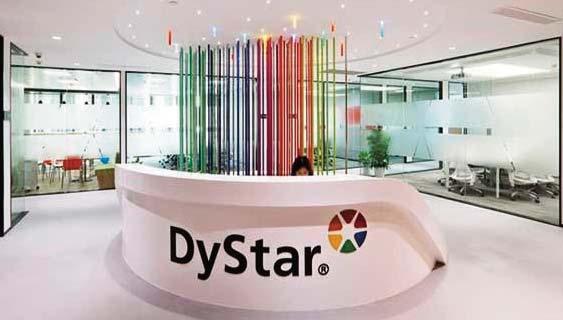
Furthermore, it should be noted that the decision to pursue the enbloc sale stems from Senda’s inability to afford the buyout of Kiri’s shares in DyStar and does not indicate any financial challenges within DyStar itself. In essence, the sale is intended to enable the disputing shareholders to amicably part ways.
Mr. Xu Yalin, Managing Director, and President of DyStar Group said, “The
recent appointment of receivers over DyStar’s shares is purely a procedural step aimed at facilitating an enbloc sale and does not reflect any financial distress within the company. Our reserves speak to our robust financial health, and we are fully committed to maintaining our operational excellence and serving our customers with the same level of dedication and quality they have come to expect from DyStar.”
DyStar remains committed to transparency and ensuring accurate information reaches all our stakeholders and interested parties.
Features 41
Uster EVS Fabriq Vision control pane
Mr. Xu Yalin, Managing Director, and President of DyStar Group

These are the industry's game changers: Techtextil and Texprocess impress with a strong knowledge programme
Relevant industry trends, pioneering research milestones, new technologies and solutions for the major challenges of our time: with their high-calibre stages, Techtextil and Texprocess are once again making a name for themselves as indispensable knowledge and networking hubs. The two international innovation trade fairs take place together in Frankfurt am Main from 23 to 26 April 2024.
How is AI helping the textile industry? What is happening in recycling and the circular economy? And which innovations have what it takes to be game changers? From sustainability to digitalisation, these are the major and, above all, urgent topics that the leading trade fairs Techtextil and Texprocess address with their selected content programme: In 2024, the Techtextil and Texprocess Forums will once again stand for excellent quality content, speakers and networking, making them valuable platforms for knowledge transfer, professional exchange and business initiation.
From AI to circularity: Techtextil Forum takes an innovative approach to the textile future
Digitalisation, sustainability, supply chains, alternative materials, process optimisation and the circular economy: what are the latest research findings, technologies and innovations? And what trends and solutions are driving the global textile industry? Renowned experts will discuss these topics in the Techtextil Forum (Hall 9.1, E70), which will offer around 50 presentations and discussion panels over four days. Ricardo Vega Ayora (ITA Academy, Aachen), for example, will show how artificial intelligence can be used specifically for energy optimisation. Sophia Merve Ince

and Dr Recep Karadağ from Anatolian Colours will report on their particular breakthrough in organic dyes.
Textile solutions for the future will be presented by moderator Dr. Jan Laperre (Centexbel) and Lea Zimmermann (DITF). They will discuss the vital role that textiles can play in the context of climate change and highlight a current research project on energy-free, self-cooling textiles. A strong thematic focus of the Techtextil Forum is on the field of recycling. Johannes Leis (Saxon Textile Research Institute) and Robin Oddon (Techtera), among others, will share their findings on the development of closed-loop processes for the management of composite waste and waste materials. Lorenza Gardella (XLANCE), on the other hand, will demonstrate the recycling possibilities that polyolefin-based elastic fibres open up for new textiles.
Texprocess Forum and Denim Talks tackle the hot topics of the industry
The Texprocess Forum in Hall 9.0, B88 will focus on sustainable solutions
and technologies for the future. One of the strong content partners is the German Engineering Federation (VDMA Textile Care, Fabric and Leather), which will also start its guided tours of the fair on the topics of digitalisation and AI from here. On stage in the Econogy Talk, co-hosted by VDMA, Federica Giachetti (Morgan Tecnica), Michael McDonald (SPESA) and Günter Veit (VEIT Group) will discuss how sustainability can be implemented with the help of technological innovations.
Another must-have at Texprocess are the Denim Talks in Hall 8.0, D20. With current topics and discussions, industry experts invite to experience the future of the denim industry in a new way.
Visitors will gain insights into circular strategies and new processing technologies and meet innovative suppliers and players. The range of topics includes sustainable approaches to washing, destroying, bleaching, lasering, dyeing, recycling, upcycling and customising. Among others, Abdul Jabbar Athar (US Apparel & Textiles) will talk about "Denim Sustainbility - A Nexus
42 PAKISTAN TEXTILE JOURNAL - April 2024

Approach" and Enrico Cartabbia (MACPI Americas), who will present the latest innovations for denim finishing.
Highlights: Innovation Awards & Young Professional Friday
With their strong stages, Techtextil and Texprocess cover the relevant topics of the industry. In addition to the specific trade fair themes, the two forums also offer a number of special events: Crossindustry highlights include the festive presentation of the Techtextil and Texprocess Innovation Awards 2024 on the Texprocess stage on 23 April at 12:30 pm. To mark the twentieth anniversary of Techtextil, all exhibitors who took part in the first Techtextil in 1986 will be honoured on 24 April at 09:00. Another crowd-puller is the Young Professionals Friday on the last day of the trade fair, when both industry platforms will focus on the next generation. The Techtextil and Texprocess Forums are also the starting point for numerous guided tours,
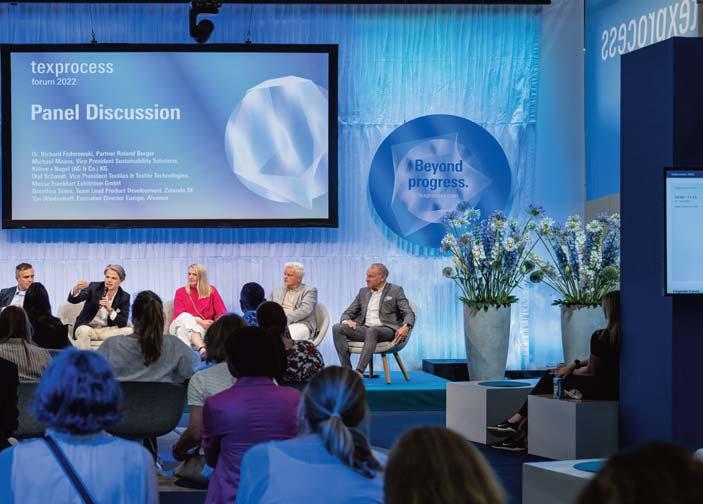
such as the Econogy Tours to exciting companies with sustainable products. Exhibitors and visitors can also conveniently plan their personal knowledge programme on the move
using the Techtextil and Texprocess Navigator apps.
The events Techtextil and Texprocess will be held from 23 to 26 April 2024.
VDMA members at Techtextil: Focus on automation and digitalisation
Techtextil, taking place end of April in Frankfurt, will see a strong participation of VDMA member companies. More than 50 members will be presenting smart technologies for technical textiles in various application areas, seven of them at the VDMA group stand. A focus of the exhibitors will be on automation and digitalisation.
VDMA member companies are ready to support the transformation of the textile industry. This means the offer of innovative, highly efficient and resource saving production technologies and the provision of cutting-edge machines and equipment for recycling. In both cases, digitalisation is a means to improve both efficiency of the process and quality of the products. Automation and digital tools are also an answer to the increasing shortage of qualified personnel. With the help of digital systems, textile producers can optimise and automate their production processes and thus achieve a high level of process reliability and transparency. Automation and
digitalisation of textile machines have already been developed and offered to market maturity.
Digitisation will only work in close cooperation between machinery builders and textile producers. In this respect, VDMA has organised a panel discussion that will take place at the VDMA group stand (12.0, C55) on April 24, 2:30 – 4 pm. The topic of the event is “Product passport – impact on the industry”. The regulatory process for the digital product passport for textiles continues to gather pace. As things stand, clothing manufacturers in all European countries are expected to require a Digital Product Passport (DPP) from mid-2027.

Scheme (GTS), who played a key role in the development of the DPP in the current CIRPASS project, launched by the EU Commission.
To discuss the impact of the digital product passport on textile machinery manufacturing and the apparel industry, VDMA has invited industry representatives and will welcome Mr. Andreas Schneider from Global Textile
The VDMA group stand will also be a platform for junior engineers. On April 25, 4 – 5 pm the Chairman of VDMA’s young talent foundation (Walter Reiners Foundation), Peter D. Dornier, will award six young engineers with the Foundation's promotion and sustainability prizes. The prizes will be awarded in the categories bachelor's thesis and diploma/master's degree.
VDMA is looking forward to welcoming numerous visitors to the events.
43

Techtextil 2024: Connect with the Trützschler Group in Frankfurt, Germany!
From April 23 to 26, the Trützschler Group will be presenting its solutions at the Techtextil in Frankfurt, Germany. In hall 12.0. at booth C61, Trützschler Nonwovens will spotlight latest developments for the production of high-quality fiber-based nonwovens. Special focus will be on T-SUPREMA needle-punching lines and sustainable solutions for cellulose-based nonwovens. Techtextil 2022 was marked by the official announcement of the cooperation between Trützschler Nonwovens and Texnology. This year Trützschler is doing the next step with the inauguration of the TSUPREMA needle-punching line in the technical center in Egelsbach. Anyone interested in textile recycling should visit Trützschler Spinning and our cooperation partner Balkan at booth C68 in hall 12.0. Visitors can also get comprehensive information on the latest Trützschler Card Clothing portfolio for the spinning and nonwovens sectors.
Pioneering nonwovens solutions
At the shared booth of Trützschler Nonwovens and the Italian company Texnology S.l.r., attendees can find indepth information about T-SUPREMA. This concept is dedicated to achieving high product quality and system efficiency within the field of premium needle-punched nonwovens – serving as the fundamental component for
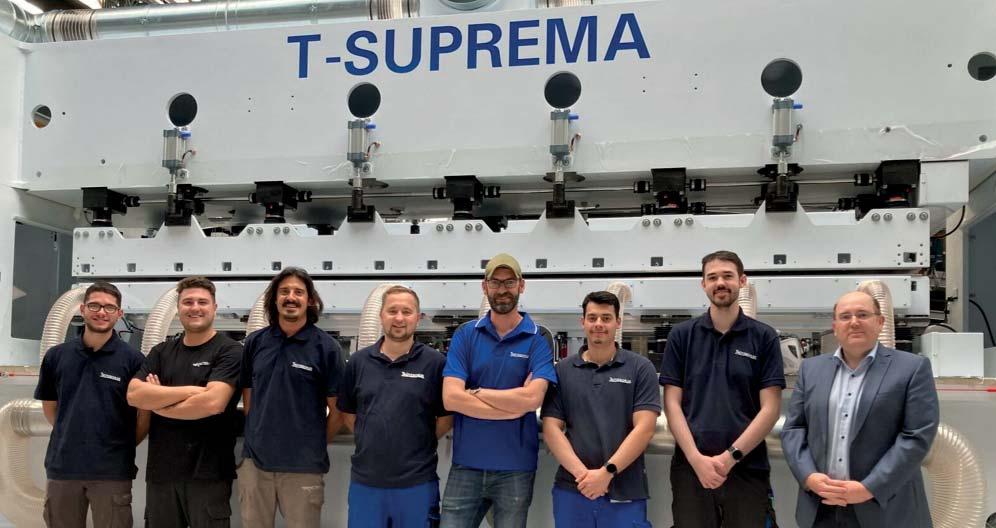
applications like geotextiles, automotive textiles, filter media, and various industrial uses.
Visitors can also gain insights into the T-ONE digital working environment and its role in ensuring sustained high nonwoven quality and process efficiency. T-ONE is an essential component of the T-SUPREMA line concept but is adaptable to any fiber or polymer-based nonwoven line.
In addition, Trützschler Nonwovens will focus on its wet-laid/spunlace (WLS) and carded/pulp (CP) lines for cellulosebased biodegradable wipes. Its collaboration with Voith aims to support the development of innovative and ecofriendly WLS and CP products.
Whatever the application: For optimum nonwoven quality and process stability our cards and roller cards are equipped with high-performance card clothings. Our Trützschler Card Clothing experts will be on hand to demonstrate the comprehensive range of our solutions and services.
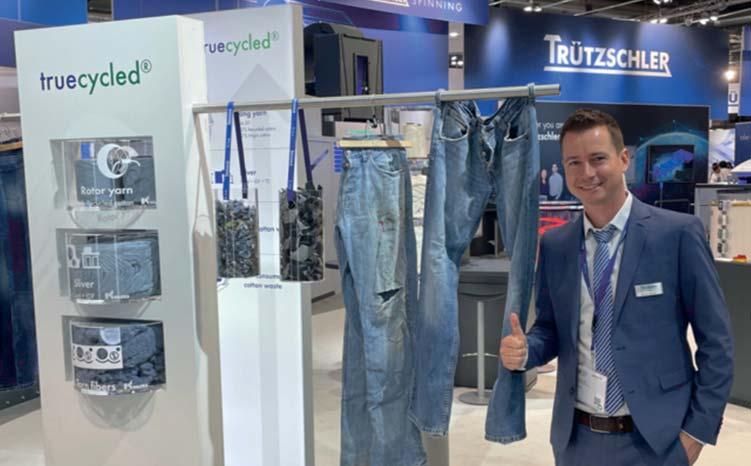
Sustainable spinning preparation
The partnership with the Turkish company Balkan positions Trützschler as a pioneer in complete solutions for mechanical recycling and spinning preparation of textile waste Visitors to Techtextil will be able to see at firsthand how Balkan’s cutting and tearing lines perfectly complement our product portfolio – and how the efficient coordination of our joint processes will make it easier for them to plan and implement spinning projects.
Our experts will share their knowledge on Balkan tearing lines as well as Trützschler blow room installations, the new Integrated Draw Frame IDF 3, and the intelligent card TC 30Ri for Recycling. The new flagship in carding converts shredded waste from textile surfaces into high-quality fiber slivers for new yarns. To realize the full potential of Trützschler’s recycling applications, customers can explore our proven Card Clothing solutions in this field.
See you in Frankfurt, Germany!
The Techtextil offers a great opportunity for people from across the textiles industry to talk to our Spinning, Nonwovens and Card Clothing experts. We are already excited to meeting you in Frankfurt, Germany, at hall 12.0., booths C68 (Spinning/Card Clothing) and C61 (Nonwovens/Card Clothing)!
44 PAKISTAN TEXTILE JOURNAL - April 2024
Learn about complete solutions for the mechanical recycling and spinning preparation of textile waste from our experts.
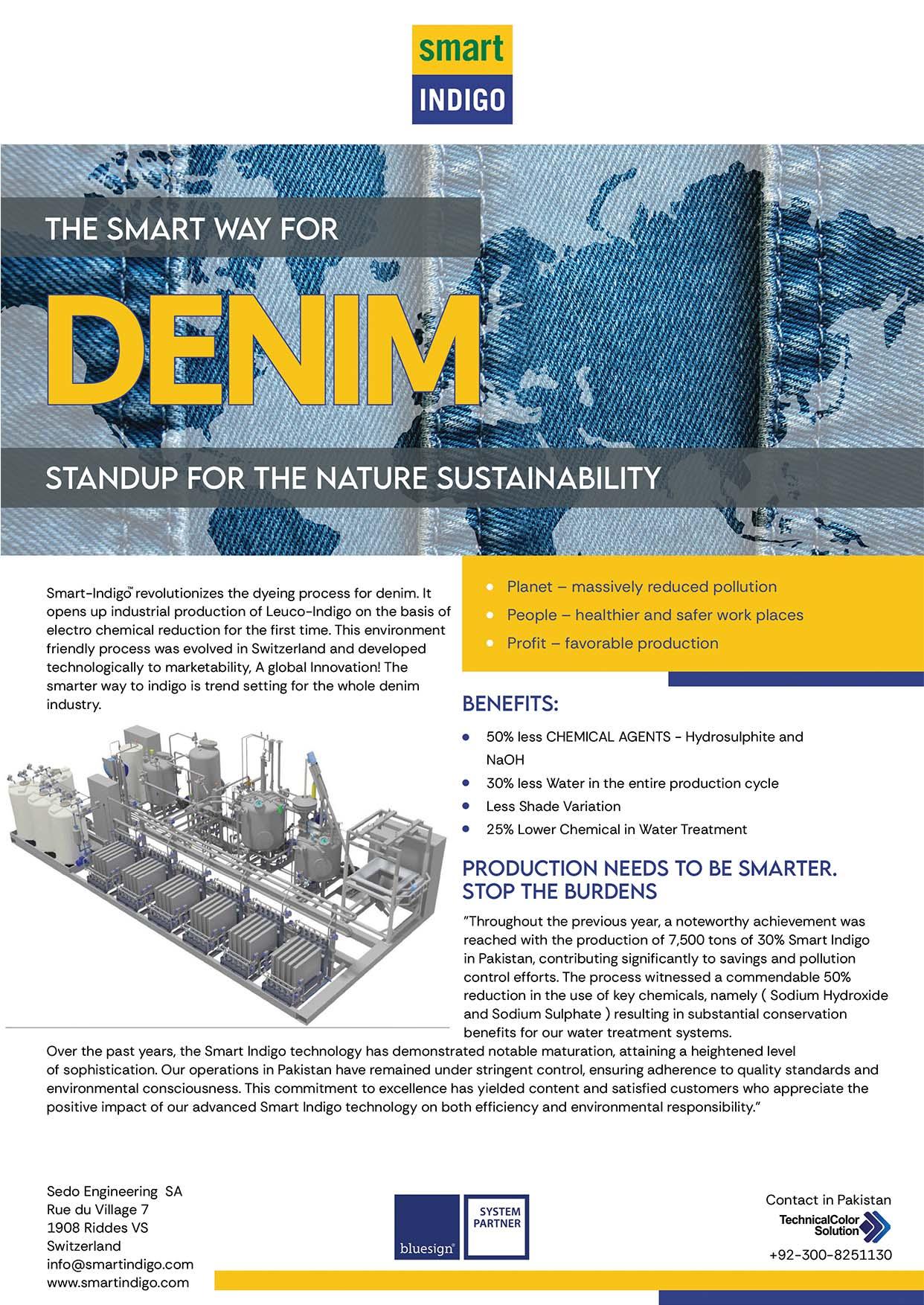

High precision in coating and laminating
Cavitec introduces new technology achieving unmatched performance of activewear fabrics
Cavitec stands for high-end machines for coating, laminating, impregnation and is the first choice of prepreg suppliers. The Swiss firm, part of Santex Rimar Group, presents – first time to the public – the redesigned Caviscreen at Techtextil Frankfurt. Caviscreen features latest technology attaining unparalleled results for breathable laminates and offering an interesting cost bonus.
Caviscreen was especially developed as a hotmelt coating and laminating unit for breathable sportswear, rainwear and protective clothing – with and without applying a membrane. The redesigned machine shows a brand-new method to supply adhesive more evenly and precisely. Using PUR adhesive (polyurethane reactive adhesive) goes with additional benefits like strong bonding capabilities and versatility.
Finest technology
Caviscreen’s hotmelt screen printing is a special system for high-end application garments. With this Caviscreen system, a PUR adhesive is transferred onto the substrate through a rotary screen, similar to the well-established textile printing method. The adhesives are fed from the drum melter through a heated hose to the traversing adhesive distribution system inside the rotary screen, just behind the doctor blade.
The adhesive is pressed by the doctor blade through the screen holes and transferred to the substrate. Different dot pattern (mesh or irregularly) and different screen thicknesses allow different coating weight and adhesive coverages.
The traversing adhesive dispenser is used to distribute the adhesive automatically over the set working width that – an additional technical benefit –can be set without any mechanical changes.
Manufacturers and end users love the results
Cavitec’s innovative screen coating system is the most precise system to
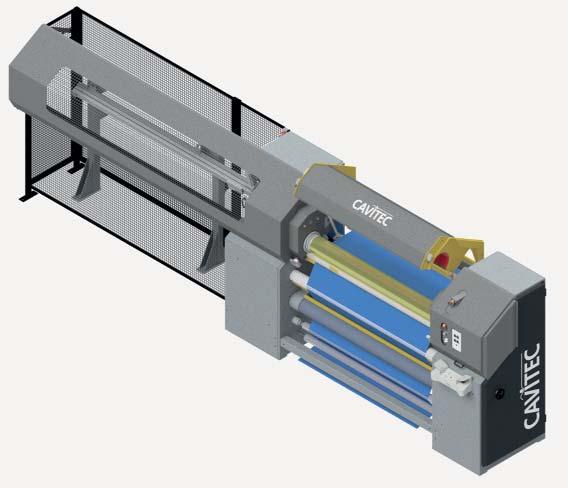
apply adhesive without glue in between the coated dots and therefore final active wear products show excellent air permeability and a soft feel. The system also achieves higher bonding strength while using less adhesive than other coating processes because of applying the coating on the surface of the substrate and like this, the adhesive has less tendency to penetrate the substrate.
Bonding strength, softness of the fabric and the breathability are defined by the coating weight and the coverage. The rotary screen allows users to exactly regulate and adapt the coverage respectively the coating weight. Cavitec offers a large selection of screens that are essential to fulfil the fabric requirements. A further significant advantage is the ease and efficiency of switching from one screen to another by simply unlocking the bayonet fitting. The IR-heater cover opens pneumatically and the lightweight screen can be easily removed by hand. Unlike with other methods, there's no need to deal with hot oil or any other heated liquid that requires cooling down.
Additionally, the compatibility of the system with PUR adhesives – used at up to 140°C – ensures not only superior performance but also durability.
Last but not least, Caviscreen technology supports manufacturers by significantly reducing costs with screens priced at a mere fraction, just 10%, of common gravure roller prices.
Cavitec at Techtextil Frankfurt 2024 –the must see
Techtextil Frankfurt serves to Cavitec as the ultimate meeting ground to present Caviscreen and its other solutions to a technical textile focused audience. As the world leader in prepreg systems for composite products, Cavitec also innovates for the aerospace, automotive and wind power industries, as well as for the resin impregnation of carbon, Kevlar and fiberglass fabrics. Experts will be glad to explain their state-of-the-art technology in all detail in hall 12 at booth D85, from April 23 to 26 at the upcoming Techtextil in Germany.
46 PAKISTAN TEXTILE JOURNAL - April 2024
Caviscreen shows innovative hotmelt screen printing technology

Monforts to debut the coaTTex at Techtextil 2024
At the upcoming Techtextil show for technical textiles which will take place in Frankfurt from April 23-25, Monforts will launch its new coaTTex coating unit exclusively dedicated to air knife and knife-over-roller coating.
For single-sided application with paste or foam, the versatile coaTTex is suitable for both incorporation into existing finishing ranges as well as installation with new Monforts lines, notably the industry-leading Montex stenter systems.
A wide range of coatings can be applied to fabrics for providing functions such as waterproofing, liquid and gas protection and breathability, in addition to foam lamination and coating, including black-out coating.
The considerable technical textile end-use applications envisaged for the coaTTex range from window blinds to abrasive cloths and from airbags to sails.
With an operational speed of up to 40 metres per minute, coaTTex units are available in nominal widths of between
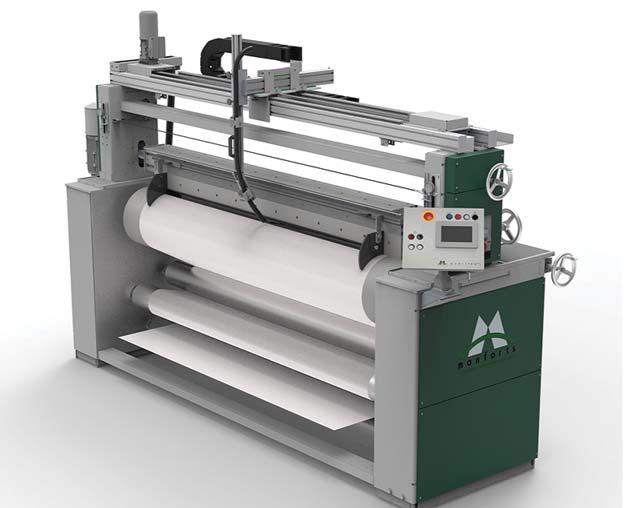
1800mm to 3600mm and their robust construction is characterised by a rotating beam for the fixation of up to three different knife executions.
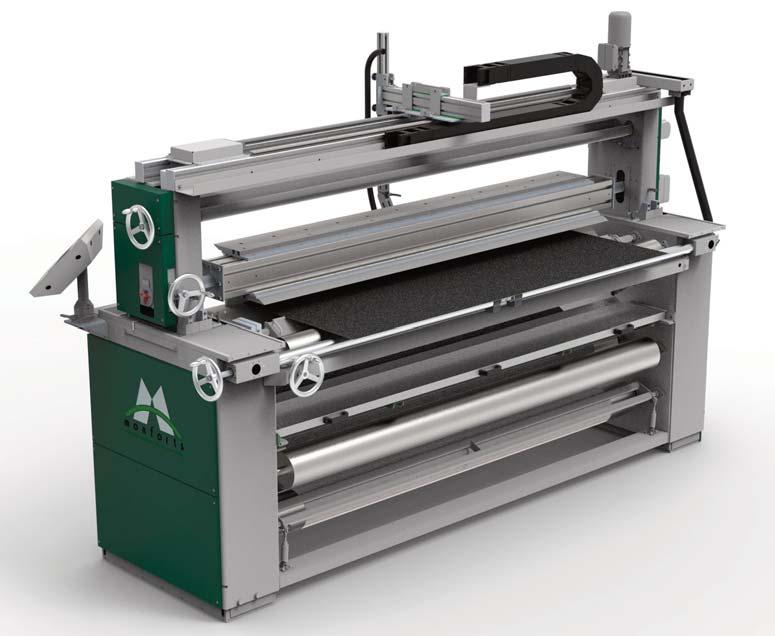
Central adjustment of both the horizontal and vertical position of the beam, and also of the knife angle, enables easy adaptation to new projects and automatic tension control guarantees high quality production. In addition, the cleaning blade for the coating roller is pneumatically controlled, as is the lifting of the beam at seams and clamping during fabric standstill.
“The coaTTex is our response to a demand from the market for a reliable coater that can be up and running very quickly, is easy to operate, and enables a wide range of performance properties to be imparted on fabrics extremely economically,” says Monforts marketing manager Nicole Croonenbroek. “We are excited to be launching it at Techtextil in Frankfurt and looking forward to discussing its great potential with interested parties.”
Monforts is at stand C58 in Hall 12 at Techtextil 2024.
47
The new monTTex coating unit.

Crealet AG: Warp tension under control and a bright future ahead
Crealet presents its innovative warp tension solutions at Techtextil 2024
Crealet is the world leader in sophisticated warp feeding technology and tailored solutions. Controlled warp tension stands also for controlled fabric quality. The Swiss firm presents its latest developments for technical textile applications at Techtextil 2024 in Frankfurt, Germany.
The year 2023 was notably successful for Crealet, with a significant increase in sales compared to the previous year. This increase is the result of growing customer demand for optimisation and automation of the warp feeding process, also taking sustainability aspects into account. This trend reflects a major shift towards intelligent warp feeding technology also possible by converting an existing manual into an automated system. Such investments enable mills to significantly improve quality, efficiency and productivity.
KAST ECR for ribbon weaving mills
Crealet’s mission is to empower narrow weaving with a consistent highquality level. The cost of electronic solutions depends on various factors, such as the complexity of the technology, the materials used as well as the market demand. Crealet makes continuous efforts to develop innovative and costeffective solutions to meet customers' needs. The new KAST ECR solution, presented for the first time at ITMA 2024, is an affordable warp feed system that fulfills the requirements of narrow weaving mills.
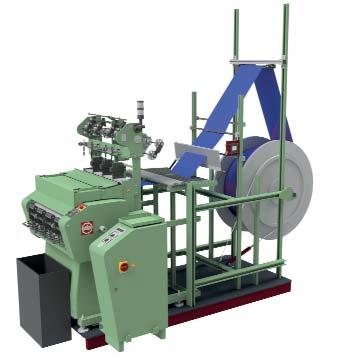
The KAST ECR warp let-off device keeps the warp tension automatically consistent and eliminates the need for manual adjustment. With the KAST ECR solution, warp tension is measured with load cells and the braking force is regulated by continuously changing the rope tension so that a uniform warp tension is achieved from the full to the empty package. By retrofitting the common rope brakes, as used to manually manage warp thread tension, with the ECR control unit, a system is created that automatically adjusts the warp tension during the weaving process. That’s crucial for the production of highquality fabrics.
The KAST ECR control unit displays the set and actual values of the warp thread tension both numerically and graphically. Specifically developed for narrow weaving, this control meets highest demands and can be easily and quickly adapted to customer and product requirements. A significant futureoriented advantage of the KAST ECR solution is the
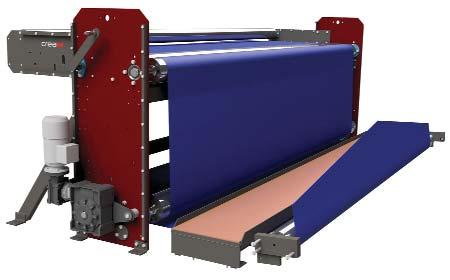
reproducibility of the production data.
Production and cost optimisation
Crealet has its roots in traditional broadloom weaving and is still a leading supplier of
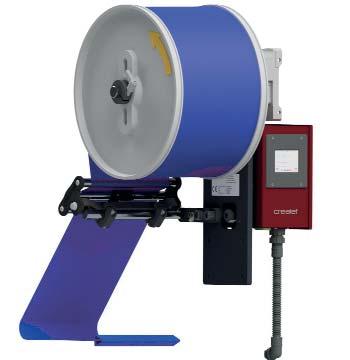
electronic warp thread feeders for creels or warp beams for weaving and warp knitting machines. In the field of technical textiles, the Swiss company develops feeders for filter fabrics, geotextiles, aerospace textiles, and medical textiles. The production of these fabrics is often subject to more stringent requirements, with warp tension playing an important role and requiring the use of appropriate control devices. Crealet also offers solutions for the electronic feeding of thread groups to weaving machines for marking fabrics for further processing and preventing wavy selvedges.
Techtextil 2024 is for Crealet the ideal place to meet interested parties and explain in detail how to benefit from their devices and systems. Through cost reductions in production for example. Cost reductions can also be achieved in the area of warp thread feeding ranging from reducing set-up times and increasing machine uptime to minimising quality defects. Employees who can focus on their core tasks by reducing ancillary activities also play an important role. The solutions are very diverse and can be tailored individually to customers.
There’re many good reasons to meet the Crealet experts from April 23 to 26, 2024 at Techtextil Frankfurt, Germany. Crealet will be glad to welcome visitors and is proud to present its comprehensive range of warp yarn feeders for ribbon and wide weaving machines as well as warp knitting machines at the joint stand of the Swiss Textile Machinery Association in Hall 12.0, Stand B01.
48 PAKISTAN TEXTILE JOURNAL - April 2024
Crealet KAST ECR on a Jakob Müller narrow fabric loom
Crealet selvedge thread feeder LT3
Crealet warp feed unit between creel and weaving machine

BRÜCKNER on TECHTEXTIL in Frankfurt: 75 years of tradition and innovation
This year, the German family-run company is celebrating its 75th birthday. Today, more than 6000 BRÜCKNER lines around the globe produce textile products of all kinds. The product range of the textile machinery manufacturer is at least as diverse as the end products manufactured on it. BRÜCKNER's customers include manufacturers of industrial textiles, nonwovens, textile floor coverings, artificial turf, glass fabrics and, of course, classic apparel textiles.
Industrial textiles
In the field of coating and finishing industrial textiles, the world market leader offers the right unit for almost every process. Whether full-bath impregnation for aqueous media, one-sided full-surface or dot application of latex and acrylate pastes, foam or paste application via various roller and squeegee systems or the application of laminating adhesiveBRÜCKNER has a solution for every process. Numerous customers worldwide are very satisfied with their BRÜCKNER lines for coating or laminating abrasive cloth, airbags, roof membranes, blackout material, billboards, geotextiles or tarpaulins. In addition to the application units and coating lines, the portfolio also includes the right drying systems.
Nonwovens
These include, for example, the thermofusion ovens of the SUPRA-FLOW product line, which are mainly used in the nonwovens industry. Among other things, high-loft nonwovens for mattresses, insulation, comforters or upholstery, as well as lightweight nonwovens for the hygiene industry such as ADL nonwovens, topsheets or backsheets can be finished on the airthrough thermofusion ovens. BRÜCKNER also offers air-through dryers for scrubbing nonwovens, kitchen towels,
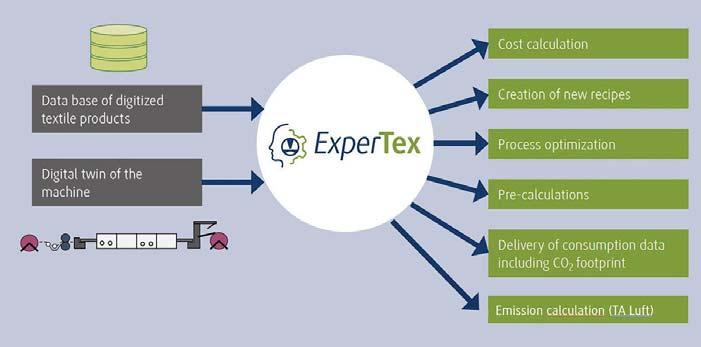
operating table covers, paper napkins and feminine hygiene products as well as high-speed spunlace lines for wipes, wet wipes and wet laid nonwovens. The POWER-FRAME stenter with proven split-flow technology is used for the thermal treatment of needle felts, hightemperature filters or geo- and agro-nonwovens. It is usually at the heart of the finishing process for classic garment textiles and is also ideal for drying and heatsetting after digital printing.
Floor coverings
Discover our expertise in coating, laminating and drying textile floor coverings for yourself. The DUOTHERM dryer deserves special mention here. It is the perfect solution for thermal treatment processes that require temperature separation between the upper and lower air. Like all BRÜCKNER lines, it can be heated with different media: Gas (direct
or indirect), thermal oil, steam in low or high pressure versions, electric heating or various hybrid versions. Just recently, a BRÜCKNER line for drying single-sort floor coverings was equipped with a fully electrically heated DUO-THERM dryer. By operating this dryer with green electricity, the long-standing BRÜCKNER customer was offered the possibility of CO2neutral production of tufted carpets.
Textile expertise made easy
The new ExperTex simulation tool is a calculation program that makes it possible for the first time in the world to digitally simulate textile drying, heat-setting and curing processes. In addition to the pure process simulation, a comprehensive calculation of consumption data (e.g. electrical and thermal energy required, production costs or the CO2 footprint) is integrated. The active process is automatically perfected using an optimization menu. The innovative algorithm simulates, analyzes and optimizes the entire range of possible setting parameters depending on the specified process, either for maximum production output or to reduce energy consumption. The new ExperTex program is browser-based and intuitive to use.
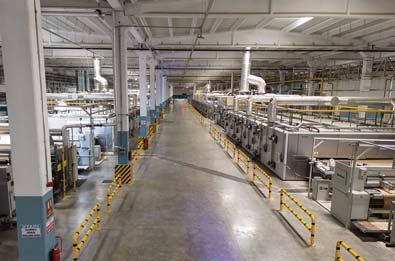
Visit BRÜCKNER at the TECHTEXTIL in hall 12.0, stand B54.
49
Brückner ExperTex simulation tool
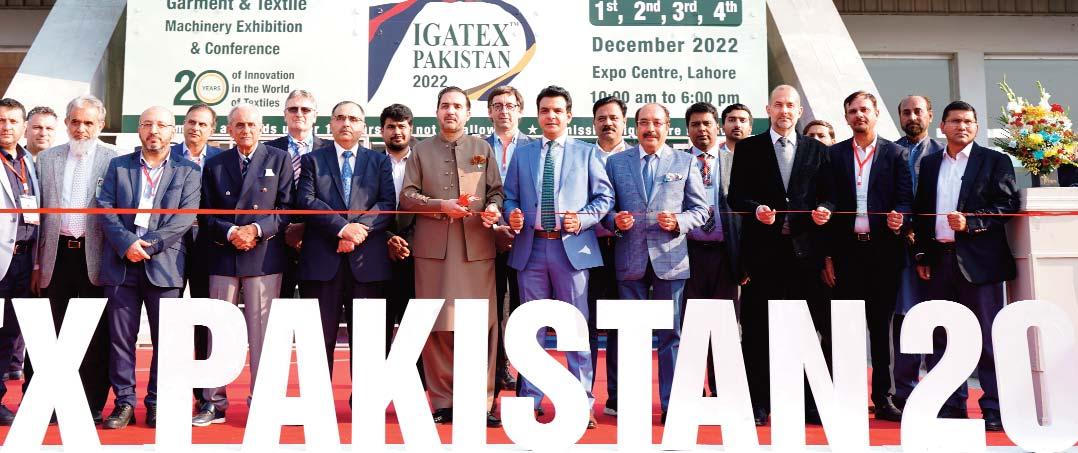
International Garment, Textile, Digital Printing Machinery and Accessories Exhibition & Conference
The 14th edition of International Garment, Textile Machinery Exhibition (IGATEX) organized by FAKT Exhibitions (Pvt) Ltd. will take from 1st – 4th May, 2024 at Lahore Expo Centre.
IGATEX PAKISTAN is a pioneer exhibition of textile technology held at Lahore Expo Centre. The main goal of IGATEX PAKISTAN is to provide a platform to manufacturers and buyers to establish trade relations within Textile sector. Participation in the event gives a great opportunity to learn about latest trends and technologies used in textile industry. IGATEX always captures attention thanks to the record number of visitors every year.
IGATEX PAKISTAN, the most established and reputable garment and textile machinery and accessory exhibition in South Asia is a professional enriching experience for all textile machinery manufacturers. It allows them to make their equipment directly available to quality buyers in a highly competitive global market. There will be demonstrations of cutting-edge industry technology at the show.
IGATEX PAKISTAN's main objective is to offer a platform for buyers and manufacturers to establish trade relations in the Textile sector. The event offers a unique opportunity to discover the latest trends and technologies in the textile industry. The record-breaking number of

visitors to IGATEX PAKISTAN every year ensures that the event is always in high demand.
IGATEX PAKISTAN, the only exhibition in Pakistan dedicated to textile and garment industry, has set new records each year. It attracted over 550 exhibitors representing 30 countries last year. Every year, more than 50,000 people visit IGATEX PAKISTAN.
Pakistan's textile sector plays an important role in its economy. This is due to its large cotton production capacity. Pakistan is currently the fourth largest cotton producer in the world, and has the third-largest spinning capacity in Asia.
Mr. Saleem Khan Tanoli said that IGATEX Pakistan 2024 will provide a premium platform for all textile stakeholders, government regulators, associations and academia to enhance business networking, knowledge sharing and to build profitable relationships in the long run.
The most important objective of organizing this exhibition under one roof is to highlight and find new investment opportunities in Pakistan’s textile sector. This event shall be the ideal venue to build and develop business relationships with key professionals so they may discuss the dynamics of development and growth of the industry.
50 PAKISTAN TEXTILE JOURNAL - April 2024


IGATEX PAKISTAN 2024 –Celebrating 22 years of innovation in the world of textiles
Interview of Mr. Saleem Khan Tanoli, CEO, Fakt Exhibitions (Pvt.) Ltd.
What are your expectations from IGATEX PAKISTAN this year and how will the tradeshow benefit textile industry of Pakistan?
This year IGATEX PAKISTAN scheduled from 1st - 4th May 2024 at Expo Centre, Lahore comes with a set of expectations as well as anticipated benefits for Pakistan's textile industry, which is a cornerstone of the country's economy.
The expo is ready to showcase the latest technologies and innovations in textile machinery, equipment, and processes, emphasizing sustainable and eco-friendly production techniques crucial in today's global textile market. With an aim to be "bigger and better," the exhibition anticipates a surge in international participation from leading textile machinery manufacturers, and suppliers. This global gathering promises to not only bring forth new ideas and technologies to the Pakistani market but also provide unparalleled networking opportunities. Stakeholders across various segments of the textile industry, including spinning, weaving, knitting, dyeing, and finishing, will have the chance to forge new relationships and strengthen existing ones, pivotal for business growth and market expansion. Additionally, as a knowledge hub, the tradeshow will facilitate discussions on industry trends, challenges, and opportunities through conferences, seminars, and discussions led by industry experts.
The event is set to enhance the production capabilities and efficiency of Pakistani manufacturers, contributing to a boost in exports. Furthermore, the event's contribution to economic growth, education, and skill development within the sector cannot be overstated. The textile industry is crucial for Pakistan's GDP and employment landscape and it stands to gain significantly from our event aspiring enhanced global competitiveness and economic prosperity.
IGATEX PAKISTAN takes place in Lahore and Karachi, what’s the approach behind it?
IGATEX PAKISTAN’s strength lies in its strategic flexibility and adaptability, rotating between Lahore and Karachi based on the evolving needs of exhibitors. This approach ensures that the exhibition remains relevant and accessible to the textile industry from across Pakistan and internationally. By alternating locations, IGATEX PAKISTAN taps into the distinct industrial strengths and market dynamics of both cities—Lahore, with its rich textile manufacturing and export heritage, and Karachi, the commercial hub and gateway to global markets. This mobility enhances regional engagement, ensures a diverse and comprehensive exhibitor and visitor base, and provides fresh market insights and opportunities each year.

Mr. Saleem Khan Tanoli, CEO, Fakt Exhibitions (Pvt). Ltd.
IGATEX PAKISTAN has been facilitating the textile industry for over two decades, what are your thoughts on this achievement?
As the organizers of IGATEX PAKISTAN, marking the completion of 22 years, is a moment of immense pride and reflection for us. Over these years, IGATEX PAKISTAN has grown exponentially, not just as a networking platform, but as a vital name for innovation, collaboration, and growth within Pakistan.
This milestone is a testament to the efforts, dedication, and entrepreneurial spirit of everyone involved - from our exhibitors to our partners and visitors. Together, we've navigated the evolving challenges and opportunities, creating an environment where ideas flourish, businesses expand, leading to the Pakistani textile industry's global growth. It has truly been an experience that we strive to build on for years to come.
Looking forward, we are committed to building on this legacy. Our vision for the future includes embracing more sustainable practices, working towards greater international collaboration, and continuing to introduce cutting-edge ideas to Pakistan's textile industry.
51 PAKISTAN TEXTILE JOURNAL - November 2022
51
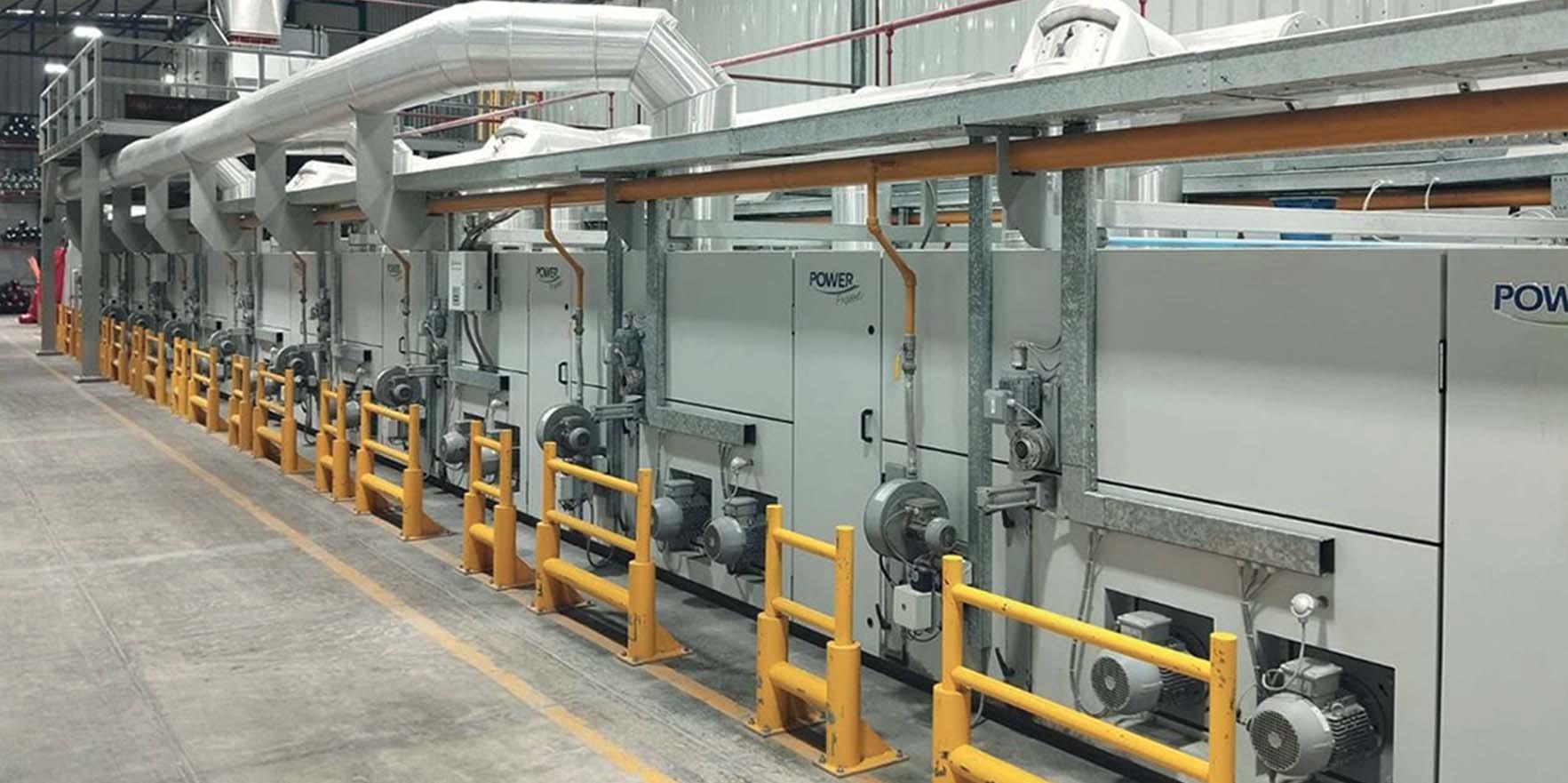
Two strong partners, Brückner and Texfina: Innovating for decades
Texfina in Peru (founded in 1947) and Brückner in Germany (founded in 1949) can both look back on impressive success stories spanning more than seven decades. The two family-run companies are pioneers with innovative power.
In difficult times, Texfina has put the 3rd Brückner line into operation!
Texfina began with hand-knitted sweaters made by the great-grandmother of the current managing directors, which were exchanged for food at the market. Subsequent generations turned Texfina into one of the world's leading manufacturers of knitwear.
Excellent specialists and advanced machinery as well as several patents are the basis of the company's success: Texfina supplies customers worldwide with tailor-made textiles that can be made hydrophobic, antibacterial, dirtrepellent or with UV protection. With the help of efficient management systems and IT, Texfina strives for ecological sustainability and promotes employee commitment through a progressive organizational culture.
Brückner is the technological market leader and system supplier for the dry finishing of textiles, technical textiles and
nonwovens. Operating worldwide and owner-managed, with 75 years of tradition and experience, Brückner not only develops, produces, and sells systems for coating and finishing apparel textiles, technical textiles, glass fiber, nonwovens and floor coverings, but has also been developing systems for heatrecovery and exhaust air purification for many years. The focus is always on the highest possible productivity with the lowest possible energy consumption.
Texfina recently put the 3rd Brückner stenter with vertical chain into operation. The new machine from the Peruvian company, which is certified to OEKO TEX Standard 100, has 11 compartments and an air/air heat-recovery system.
A very homogeneous air flow, perfect temperature distribution and very low specific energy consumption are standard features of all Brückner machines. Precisely reproducible finishing results thanks to complete automation and recipe management in the system, which Texfina uses almost exclusively for heatsetting sports and performance wear, complete the picture. Chains, chain rails and pin bar carriers are extremely robust and low-maintenance, helping to make this machine a particularly sustainable investment. A pre-wash compartment before the fabric enters the stenter

ensures better fabric quality and reduced emissions.
Raul Saba (President Texfina) is extremely satisfied with the cooperation: The team of Brückner technologists did an excellent job, recognized our needs and configured the machine optimally. It is an enrichment for our production and a guarantee for the quality of our products."
Regina Brückner (CEO Brückner):
"We are delighted about the trustful cooperation with this successful customer. The cooperation with Texfina promises sustainable success and forward-looking results for both sides."
52 PAKISTAN TEXTILE JOURNAL - April 2024
Regina Brückner, CEO Brückner

The KARL MAYER GROUP will be exhibiting at IGATEX from May 1 to 4, 2024 in Lahore with its representatives Madhani Associates and Nazer & Co.
The KARL MAYER GROUP is looking forward to a lively exchange with its South Asian customers at IGATEX, which will take place from May 1 to 4, 2024 at the Expo Centre in Lahore.
Pakistan is a particularly important market for the global player's warp preparation systems. The PROSIZE® sizing machine, the WARPDIRECT® warping machine and the KARL MAYER Long Chain Beamer and Ball Warper for the denim sector are well established in the Pakistani textile industry. As at previous trade fairs, Senior Sales Manager Peter Obrist expects numerous customers and good discussions. "It has always paid off for us to take part in IGATEX," says the sales professional. Especially now, it is important for him to show his presence
MS & JK Group: Printing innovations Karl Mayer Group to showcase at upcoming IGATEX Pakistan 2024
MS Printing Solutions’ story began in 1983, when the company was founded. It was in the late 90s that MS chose to only design digital printing machines. The outcome of this decision came in 2003, when the first digital printing machine was born and the journey to digitalisation began. Then, in 2011 the first LaRio Single Pass was installed, thus starting a further revolution inside the already existing digital one.
But MS has also a wide scanning machines portfolio. They have JP4, the right choice for those who want to enter in the Industrial Digital Textile Printing Market with a relatively moderate investment but without compromise printing speed performance. For those who seek to increase production capacity
and support customers: After a huge surge in investment during the pandemic, political problems have plunged the country into a severe crisis. Peter Obrist and his warp preparation team can be found at the Expo Center in Lahore on the stand of KARL MAYER‘s representative Madhani Associates.

Anyone interested in the warp knitting range from KARL MAYER will find what they are looking for at the stand of Nazer & Co, also a regional representative of the machine manufacturer. Regional Sales Manager
Mark Smith and his team will be exhibiting 4-way stretch articles from tricot machines for the athleisure and sportswear sector and plush fabrics from double-bar raschel machines for upholstery and toys. Other focal points of the exhibition are terry fabrics made of fiber yarn for beach and bath.
by reducing operating costs and ensuring a rapid return on the investment MS proposes JP7.
JP7 is an extremely versatile and flexible machine, one of its possible applications is pigment printing. Pigment offers less water and energy consumption, being an easy and waterless process suitable for a wide range of fibers. The printing process by pigment allows a sustainable production chain, ensuring cost-effective printing outputs. In fact, pigment is forecasted to be the fastest growing ink category with a CAGR of 9% from 2021 to 2026. This is one of the various chances where the collaboration between MS Printing Solutions and JK Group, leader in the production of innovative inks for digital textile printing, flourishes.
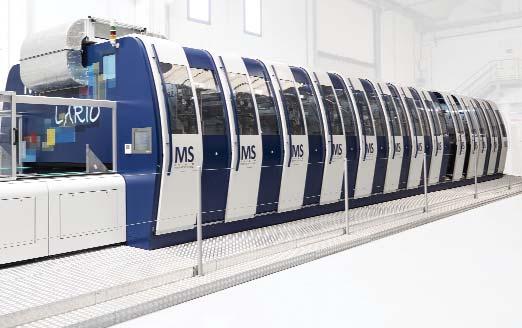
JPK Evo is is a highend reliability industrial printing machine designed for long
production runs, the best choice for those looking for: high-productivity, topperformance and the best workflow planning for the full production process.
The MiniLario project began, and it represented another step towards innovation. MiniLario has been the first scanning machine with 64 printheads, being the fastest in the world and a printing machine ahead of its time.
The entire portfolio is equipped with the same Kyocera printhead technology, thus maximising flexibility, reliability, and reproducibility of results over different machines.
Over the years MS Printing Solutions has continued to evolve, since it always is in search of innovation and improvement. Lately, they have been investing a lot in the R&D team that, up to today, has doubled the number of engineers dedicated to the designing and development of their machines.
Mark Smith and Peter Obrist are looking forward to a successful IGATEX
53
What is the secret behind enhancing woollen fabric to make it outstanding?
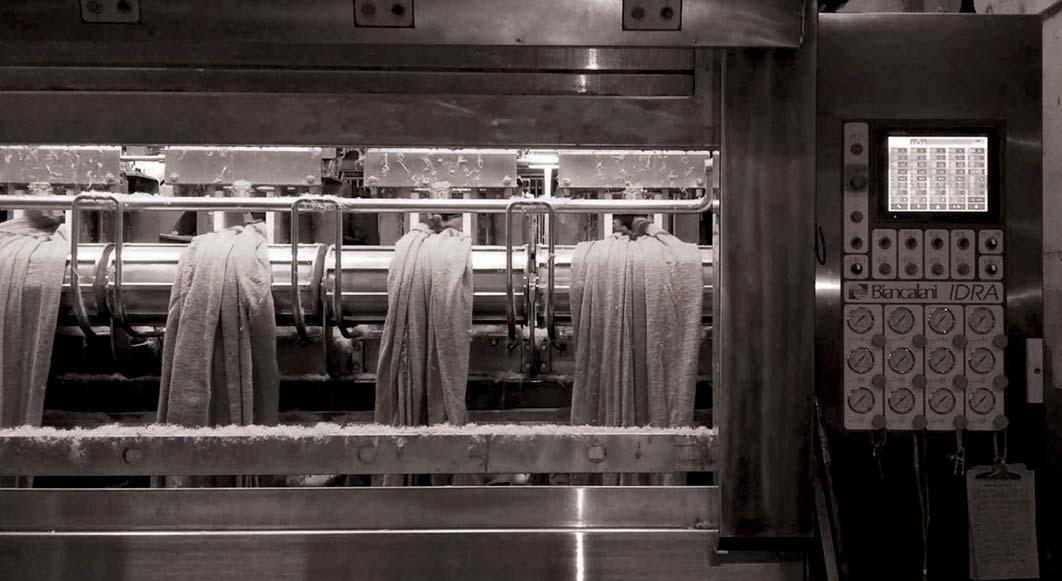
Wool finishing solutions for the niche market and mass production
Back to 1957, when Biancalani Textile Machinery was founded, the textile machines in Prato were all thought to finish mostly one kind of fiber: wool. The art of wool had been somehow moved from Florence to Prato in the 15th century and it is undeniable that, since then, textile machineries have always been improved, sharpened. The introduction of new synthetic fibers has changed it all. Or maybe not.
At the beginning, the demand for wool was incredible and textile machineries had to be competitive as per mass production. In the last few years though, wool and knit fabrics processing has quite changed its path – even if not completely – and has become the heart of one of the most niche textile markets ever. And, needless to say, textile machinery had to change as well and switch from making large quantities of fabrics to a more sophisticated finishing process and to ennobling a wool fiber whose highest qualities were meant to be highlighted.

Wool fibers come from all over the world and have all incredibly distinct features – suffice it to think of how different Chinese cashmere wool and Australian merino wool are. The first textile machineries had very simple functions and mechanical characteristics. Fabrics were in contact with the wooden parts of the machines as wood was strong enough to work deep in the fibers and to realize the perfect compacting pressure. The process had to be always very productive. Now machineries have evolved in order to deal with completely different processes as well, ones that treat high-quality fibers as carefully and gently as possible. That’s when IDRA by Biancalani – mill-wash combined with totally independent channels – becomes an asset.
IDRA boasts the highest technological approach and two or four independent channels that allowto process as many products at the same time – the one machinery of the kind with independent channels. That is key as, talking about niche markets, it often happens to process small quantities of each specific article. But what about wool mass market? Does it still exist? The answer is definitely affirmative. And MILLA takes care of it. MILLA is the other woolfinishing – milling and washing –machinery by Biancalani , that still works on large quantities: for examples, in parts of theU.K. and Italy, wool finishers choose it to treat wool fabrics both for niche and mass production, with outstanding results.
Dyeing, Printing and Finishing 54 PAKISTAN TEXTILE JOURNAL - April 2024
Finishing first with Monforts
Celebrating its 140th anniversary this year, Monforts continues to lead the field in finishing and coating technologies for technical textiles and is looking forward to many fruitful discussions on the scope of existing and new processes and applications at the forthcoming Techtextil show in Frankfurt from April 23-26.
Monforts European-built Montex stenters have earned their leading position for fabric finishing in the technical textiles field as a result of their robustness and lifetime, versatility, reliability, economy and ecology.
Existing customers include many manufacturers making geotextiles, automotive fabrics and other functional materials, while dedicated Montex lines have also been supplied to producers of airbags, flame retardant barrier fabrics and spacer fabrics.
Wovens, knits and nonwovens
Among recent installations, a line supplied to Albarrie in Ontario, Canada, is treating specialised needlepunched nonwovens up to 4mm thick for filter media and performance fabrics, while over in northern France, DicksonConstant has installed a bespoke Montex line at its second plant, to meet growing demand for its range of well-known sun protection and outdoor upholstery fabrics.
Germany still enjoys the leading position in the production of European technical textiles, and GTA in Neresheim is now employing three wide-width Montex lines for the production of faultfree substrates for the digital printing market based on 100% polyester warp knits.
“I have to say that the Monforts after-service has been absolutely perfect and there has been no shortage of quality, expertise and service on which we have drawn,” says GTA Managing Director Andreas Niess.
As a leading contract finisher of technical textiles for the automotive, aerospace, home furnishings and workwear markets, Knopf’s Sohn has also
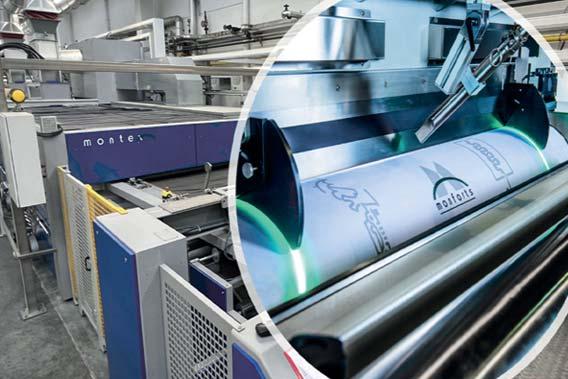
recently installed a fully automated Montex stenter at its plant in Helmbrechts.
Dolinschek in Baden-Württemberg meanwhile manufactures an extensive number of technical products including automotive components, geotextiles and wallcoverings, but also those for more unusual applications such as inlays for extractor hoods, cut protection fabrics and even wool felts which are employed as insulation on wind turbines. Dolinschek has developed and commercialised its own proprietary dyeing machines, but for finishing technology relies on Monforts, and has installed a seven chamber Montex TwinAir stenter range.
Montex®Coat
Dolinschek has also installed a Montex®Coat coating unit in knife execution, enabling the coating of dimensionally stable knitted fabrics with polyurethane or acrylate.
The Montex®Coat enables full PVC coatings, pigment dyeing or minimal application surface and low penetration treatments, as well as solvent coatings to be carried out. Its key technical applications include tents, tarpaulins and awnings, black-out roller blinds and sail cloth, automotive interior fabrics and medical disposables.
Other recent Montex®Coat installations include a unit for providing an anti-slip and textured backing to upholstery fabrics with a stable and uniform foam via knife-over-roller coating
at Altun Tekstil in Bursa, Turkey, and a combined Montex®Coat and Montex stenter range for Scottish weatherproofing specialist Halley Stevensons at its plant in Dundee.
“The precise process control functions of the Monforts line give our technicians the confidence to make new products as well as finely tuning the energy requirements of existing products,” says Halley Stevensons Managing Director James Campbell. “We love the fact that we can record the energy used on each production batch and use this for continual improvements and efficiency savings. The touchscreen software is visual and easy to use, moving from one screen to another to check the various parameters of processing.”
Glimpse of the future
“It’s the sheer diversity of applications for technical fabrics that makes Techtextil always such an exciting show for us,” says Monforts marketing manager Nicole Croonenbroek. “You really get a glimpse of the future and there are always growing opportunities in a number of rapidly expanding markets, such as the current need for new energy storage and transportation, for example, or the electrification of vehicles, where advanced materials can solve newlyarising challenges. At Techtextil 2024 we will be exhibiting a further new development for advanced coating about which we’ll be providing further details shortly.”
Dyeing, Printing and Finishing 55
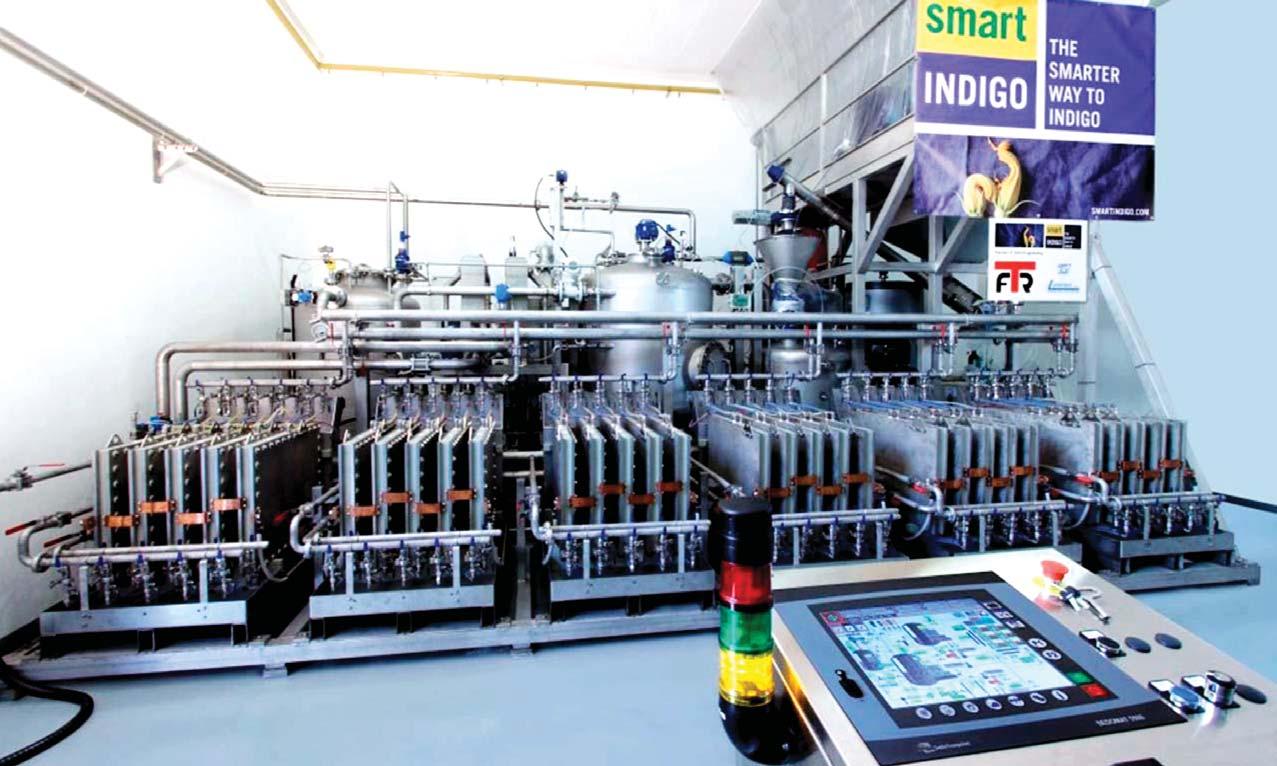
Textile sustainable solutions are the talk of the town: Contaminated seas endanger marine life
By Arshad Mohiuddin, B.E Chemical Engineering, MBA and CEO Technical Color Solution
Textile sustainable solutions are the talk of the town. Contaminated seas endanger marine life, and toxic gases from chimneys cause damage to the environment. The whole world is concerned about the sustainability of nature.
Denim dyeing is also a significant environmental concern and one of the most toxic processes. Dyeing of denim involves Sodium Hydrosulfite (NaHS) as a reducing agent.
It has a hazardous level of Category 3.**
As a potent reducing agent, the access quality in effluent causes the reduction of BOD and COD of seawater. EPA is very concerned about the environmental hazards that may caused by Denim dyeing by indigo and sulfur dyeing. Almost 600-800 gm of sodium hydrosulfide is used to reduce one kg of powder indigo, giving a maximum of 1518% solution of reduced indigo. Dyestar addressed the problem first by explaining
reduced indigo of 40% leuco indigo and started sending from Germany. We have 30% solution from Blue Connection and then Archroma Chemicals using the Hydrogenation process.

Both solutions were a step toward sustainability and have been used worldwide for many years. Pakistan, the major player in denim manufacturing, also uses liquid indigo for dyeing. Liquid indigo not only reduces the use of sodium hydrosulfide but also ensures consistent dyeing and easy control.
Companies producing liquid indigo send their liquid indigo (60-70% water) out of their production facility, burning thousands of litters of diesel. In 2018, Sedo Engineering announced the construction of an electrochemical

reactor, “Smart Indigo,” to reduce indigo. Dr introduced the process in 1973, and after that, different companies and institutes tried to find a commercial solution but failed. Sedo Engineering came up with the answer for reduction by using electricity. The product produced is highly reduced indigo (-1000mv) and is an incredibly sustainable solution.
The machine has no drain, and whatever we input is converted into output within 24 hours. The machine capacity is 1000 kg to 1500kg. Seven innovative Indigo Machines are installed at three locations in Pakistan and have produced almost 8,500 tons in three and a half years, with significant economic
56 PAKISTAN TEXTILE JOURNAL - April 2024
Arshad Mohiuddi
savings and immense contributions to foreign reserve savings. As the product is made in-house, it has enormous carbon footprint savings.
The process used only 450-500 units of electricity to produce 1000 to 1500kg of 30% liquid indigo, which means $0.04/kg. The machine uses 400L of 50% Caustic Solution.
The process is fully controlled, and the reduction quality is fully monitored.
The machine uses state-of-the-art PLC controllers from Sedo Treepoint.
The machine is fully controlled, and its software is the key to success. Sedo has invested thousands of hours into increasing the machine's efficiency. The software is innovative and continuously improving. The Sedo technical team is putting all its efforts into building its customers' confidence in new technology. The machine is very compact, requiring 300-350 square feet.
Local engineers and engineers in the Sedo engineering office closely monitor every machine.
Smart Indigo users enjoy a special discount from indigo grain suppliers. This allows Smart Indigo Liquid to be very competitive in price compared to other available products in the market.
Most suppliers convert indigo by using a hydrogenation process, which depends very much on the availability of hydrogen. Environmental agencies worldwide are promoting green hydrogen production, but the cost of green hydrogen is almost three times more than the current price.
Advantages of Smart Indigo.
1.In house production
2.Control of the supply chain of liquid indigo.
3.High reduction product
4.Less consumption of sodium hydrosulfide.
5. High pH Less consumption of caustic.
6.Direct purchase of indigo grain from the manufacturer.
7.No loss of strength.
8.No environmental hazards
9.No use of chemicals.
10.It is the most economical liquid indigo
We see a considerable loss of strength in liquid indigo as suppliers store the reduced liquid indigo) in the storage tank, thousands of kgs of indigo dyes are sedimented (Sludge)due to oxidation (2-
Dimensional Carbon electrode
Deying, Printing and Finishing
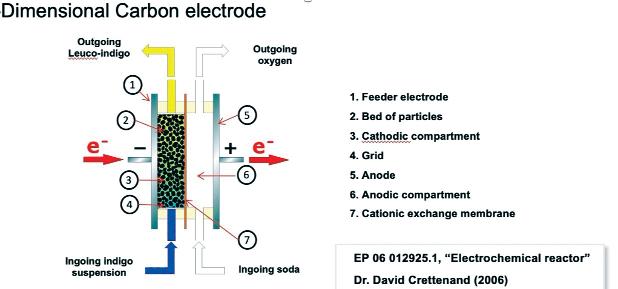
2.5%) If you store liquid indigo for 20-30 days. With Smart indigo product is used within a few days, which gives more consistent dyeing.
The carbon footprint of manufacturing smart indigo is much less than that of the conventional hydrogen catalytic method. No extreme temperatures or pressures are required to reduce the indigo. It only uses a small amount of electricity and is a 50% caustic solution, slowly converting into water, which is again used in further processing. The machine has a filtration unit to remove the impurities and produce a high-quality product.
The only by-product of the machine is the oxygen, which is released into the air. The only consumable of the device is a membrane, which is the most expensive part. cost around Euro 50,000 is good for producing almost 350-380 tons of liquid indigo, which means nearly $0.13/kg.
Another significant advantage of Smart Indigo is the intelligent buying of indigo grain. Buying grain at low prices gives a massive advantage over conventional Indigo Liquid. Of course, grain can be stored as it has a longer shelf life than liquid.
Sedo Engineering has a global contract with Wonderful Chemicals (the largest Manufacturer of Indigo dye in China) to buy indigo grain at an exceptionally discounted price.
The machine's maximum load is around 25KW, and its average power use
EP 06 012925.1, “Electrochemical reactor” Dr. David Crettenand (2006)
for a batch is 450 to 500 electric units. It is fitted with a carbon filter to remove any impurities.
Over the years, the engineering team has developed a machine with a capacity of 1.5./2.0 tons per day. Increasing the machine's capacity reduced capital investment payback on the smart indigo machine.
The engineering team has achieved the highest efficiency and reduction rate with a new membrane type. The average batch time is now almost 18-20 hours.
The aniline content (on fabric) in light to medium shades is undetected and within permissible limits in dark shades.
The Sedo Engineering team is continuously working to improve machine efficiency. The technology has been in the market for almost three and half years and is now well-tested and proven. It is the most economical and sustainable solution for the denim industry.
The engineering team in Pakistan is fully trained and proficient in technology. Local Spare parts availability and support have given customers confidence. Pakistan's denim industry is ready to lead the way in sustainable denim dyeing solutions. We shall see more happy and satisfied customers very soon.
**(Seveso Directive 2012/18/EU (Seveso III) No Dangerous substance/hazard categories Qualifying quantity (tonnes) for the application of lower and upper-tier requirements Notes H2 acute toxic (cat. 2 + cat. 3, inhale.) 50 200 41).

57
Jeanologia calls for shared responsability on World Water Day
Spanish tech company advocates for collective solutions to address global water scarcity
The Spanish company leads sustainable change in the textile industry, demonstrating that it is possible to produce fashion responsibly and profitably.
Its technologies have saved the planet more than 20 million cubic meters of contaminated water in 2023.
Coinciding with World Water Day celebrations and under the slogan "Water, a shared responsibility," the ecoefficient textile technology company, Jeanologia, calls on this productive sector, appealing for a real change, away from greenwashing and towards concrete and collective action.
Three decades ago, Jeanologia began its journey swimming against the current in an ocean of skepticism within one of the world's most polluting productive sectors: the textile industry. It became a pioneer and revolutionized the industry by demonstrating that fashion could be produced by significantly reducing its environmental impact and without compromising quality or profitability, relying on technology to achieve this.
Since its foundation, Jeanologia has led sustainable change in the textile industry, thanks to its innovative technologies, which have drastically reduced water consumption and returned the minimal amount of water used to nature in perfect condition, as well as minimizing the use of chemicals and energy and eliminating harmful emissions and discharges.
New environmental record
In 2023, Jeanologia set a record in its environmental P&L statement, measuring in cubic meters the contaminated water that is no longer discharged into rivers and seas, as well as the reduction of toxic emissions, thanks to its technological advances and services.
The technologies developed by Jeanologia have saved the planet 20,265,581 cubic meters of contaminated water in 2003, equivalent to the
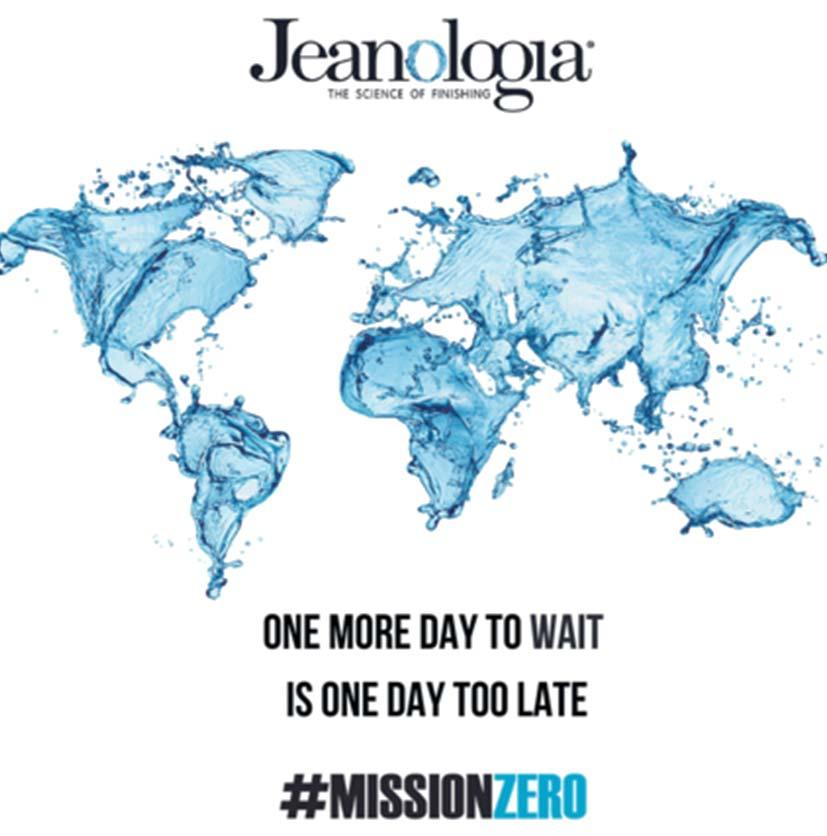
consumption of a city the size of Brussels or more than 1,200,000 Olympic pools. Additionally, 97,895,304 kilograms of CO2 emissions were reduced, equivalent to the carbon absorbed by a forest of 9,800,000 trees.
The key to success lies in the integration of eco-efficient technologies in all stages of production, from fabric to garment finishing. In this way, water consumption in the garment finishing process has been drastically reduced, from 70 liters to just 1 liter per garment. These technologies have also significantly reduced the use of chemicals and energy, as well as emissions and harmful discharges derived from textile production. All this without compromising quality or design.
Furthermore, Jeanologia's ecoefficient technologies include the H2 ZERO effluent recycling plant, a key component of their Mission Zero
initiative. This innovative system is able to recover 95% of water used in the production process. It plays a vital role in creating a closed-loop system, ensuring minimal water wastage and contributing to a sustainable ecosystem for brands and their suppliers. Thanks to H2 ZERO, water is treated without chemicals, maintaining optimal conditions for reuse, aligning with Jeanologia's commitment to environmental responsibility and resource conservation.
Additionally, Jeanologia’s Air Fiber Washer project focuses on removing microfibers from the garment finishing process, thereby contributing to the preservation of the seas and preventing these microfibers from contaminating marine ecosystems.
Jeanologia also recognizes the importance of measurement and transparency in environmental impact.
58 PAKISTAN TEXTILE JOURNAL - April 2024
Dyeing, Printing and Finishing
For this reason, over 10 years ago, it made available to the industry the Environmental Impact Measurement (EIM) software, which today more than 100 brands and 400 laundries worldwide use to measure and improve their collections, avoiding greenwashing and being completely transparent.
An invitation towards a more sustainable water management
On World Water Day, Jeanologia reiterates its commitment to continue leading its Mission Zero: achieving total dehydration and detoxification of the textile industry. A challenge turned into an urgency following UNESCO's warning that we face an imminent global water crisis, with between 2,000 and 3,000 million people suffering from water scarcity worldwide, water demand far exceeding supply capacity in many parts of the world, and the environmental impacts of its overexploitation becoming increasingly evident.
In this context, the Spanish technology company urges adopting a collective commitment. As Jeanologia's CEO and founder Enrique Silla states, "we are an impact company focusing on water." Thus, its goal is to reduce the consumption of this resource throughout the textile process to the bare minimum, eliminate 100% of the waste generated in the manufacturing and finishing of garments, and preserve the seas,
eliminating any possible microfiber from the production process to prevent it from ending up in the oceans.
Jeanologia has managed to transform the global textile industry, and today its involvement goes further. Although acknowledging that the world has awakened to the urgency of sustainability, Jeanologia claims that there is still a long way to go. Individual awareness and isolated actions are not enough. Water scarcity is a global challenge that requires comprehensive and collaborative solutions involving governments, institutions, companies, and individuals.
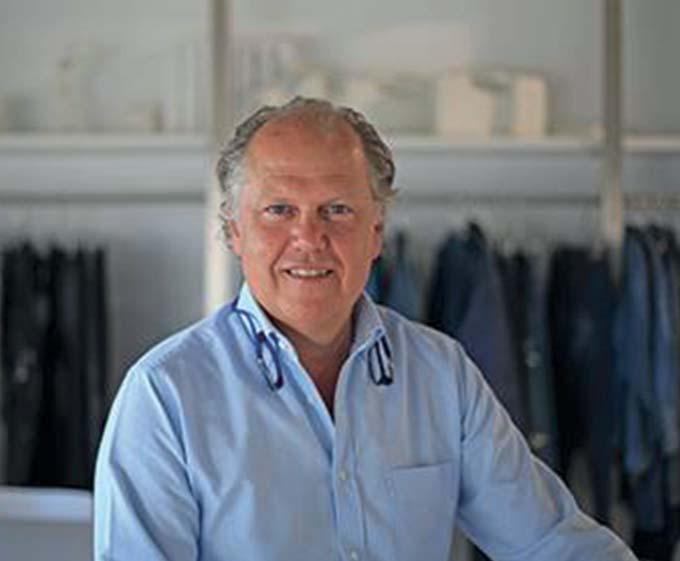
eco-efficient textile industry. The company collaborates closely with brands, retailers, and their suppliers on their transformative journey, offering disruptive technologies, innovative software, and a new operating model.
"The global context urges us to unite and accelerate action, and on a date as significant as World Water Day, we want to offer our example as inspiration and invite other companies to join our Mission Zero," claims Enrique Silla.
Jeanologia: over 25 years transofming the textile industry
Since 1994, Jeanologia's mission has been to create an ethical, sustainable, and
In 2024, Jeanologia celebrates the 25th anniversary of its pioneering laser technology, launched in 1999, which revolutionized denim finishing, replacing harmful practices and eliminating the use of hazardous substances. With the same purpose, Jeanologia now faces the challenge of reducing the environmental impact of the garment dyeing process— one of the most polluting in the industry—through its revolutionary ColorBox technology.
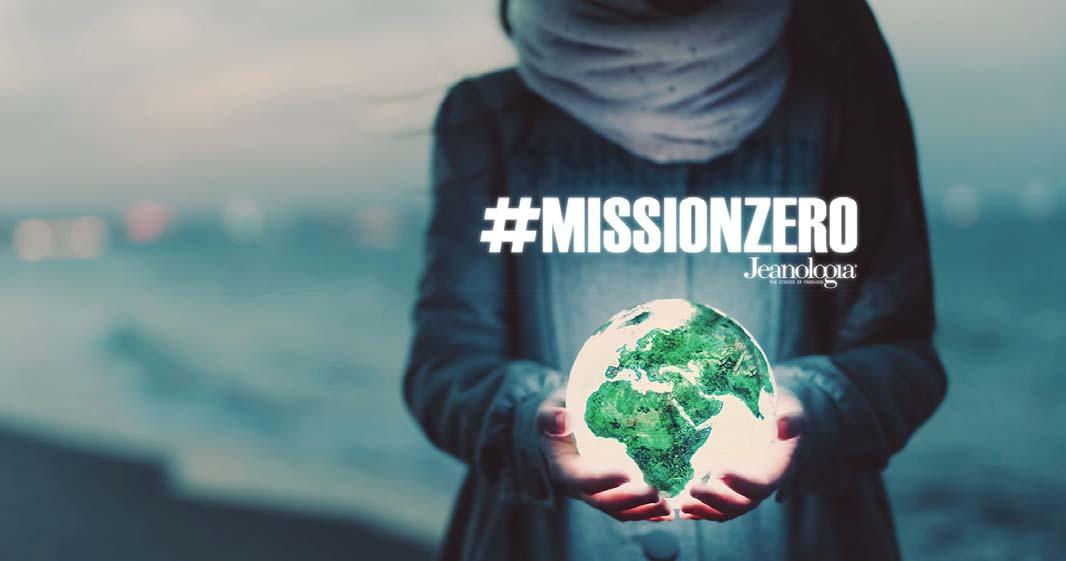
Printing and Finishing 59
Deying,
Enrique Silla states Jeanologia's CEO and founder
Dyeing, Printing and Finishing
Baldwin and Elmatex presents spray finishing system at Techtexil
Baldwin and Elmatex GmbH partner at Techtextil Frankfurt to drive sustainable finishing TexCoat™ G4 precision spray technology saves chemistry, water, energy and costs
Baldwin Technology Co. will join Elmatex GmbH at Techtexil to demonstrate how its revolutionary TexCoat™ G4 precision spray finishing system eliminates chemistry waste on changeover, saves water and achieves faster speeds (resulting in lower energy required per square meter of fabric) through the stenter frame among its many sustainable advantages.
Techtextil will be held April 23-26 in Frankfurt, Germany. Baldwin is pleased to be partnering with Elmatex GmbH at its booth, Hall 12.0, Stand D63. Elmatex is a global distribution partner for leading manufacturers of machines, equipment and accessories, with expertise and experience specific to the textile and nonwovens industries.

Rick Stanford, Baldwin Technology’s Vice President of Global Business Development, Textiles, will be on hand in the Elmatex booth to discuss TexCoat™ G4. The non-contact precision-spray technology helps textile finishers up their game by enabling consistent, high-quality finishing, with zero chemistry waste and drastically minimized water and energy consumption.
“We are pleased that Baldwin will be joining us in our stand at Techtextil,” commented Elmatex Managing Director Sören Klein. “Baldwin’s TexCoat and Plasma Pure technology are a perfect complement to our portfolio of top European textile machinery manufacturers. Visitors can come to the Elmatex booth and tick all of their boxes to meet their technology needs to produce in the most sustainable and environmentally friendly way.”
With a cost-sensitive global economy and an increased focus by brands and consumers on the environment,

customers are placing a premium on sustainability in textile production. TexCoat™ G4’s non-contact spray technology offers numerous advantages compared to conventional methods of applying finishing chemistry.
With Baldwin’s innovative system, the chemistry is precisely distributed across the textile surface and is applied only where it is required, on one or both sides of the fabric. The non-contact technology eliminates chemistry dilution in wet-onwet processes, allowing full control of maintaining consistent chemistry coverage rates. Plus, pad bath contamination is eliminated, and changeovers are only required when there is a change of finish chemistry.
More specifically, with Baldwin’s TexCoat™ G4, textile finishers can expect unprecedented tracking and control of the finishing process for consistent quality. Changeovers are easily and quickly performed thanks to recipe management, including automated chemistry and coverage selection. Furthermore, the system offers automated speed tracking, fabric-width compensation, and real-time monitoring to track system uptime, performance and chemistry usage, as well as active care alerts.
In addition, the TexCoat™ G4 system can process a wide range of low-viscosity
water-based chemicals, such as durable water repellents, softeners, antimicrobials, flame retardants and more. Baldwin’s innovative technology utilizes the same chemicals used in the traditional pad bath, and no special auxiliaries are required. The recipe is adjusted by increasing the concentration and reducing the pickup by a corresponding amount, so that the same level of solids is applied.
Some applications, such as durable water repellents, are only applied on the face of the fabric, instead of the traditional method of saturation through dipping and squeezing. Drier fabric entering the stenter means lower drying temperatures and faster process speeds. Single-side applications also open up the opportunity to process back-coated or laminated fabrics in a single pass of the stenter, instead of two passes.
“Techtextil is an outstanding exhibition to meet with sustainably minded textile manufacturers that travel not only from Europe but from all over the world to see the latest in sustainable, environmentally conscious technology,” Stanford commented. “We will have our flagship product, TexCoat G4 on hand so that visitors can get a closeup look on why now is the time to transition from pad finishing to TexCoat precision spray.”
60 PAKISTAN TEXTILE JOURNAL - April 2024
Elmatex’s Soren Klein (L.) and Baldwin’s Simone Morellini will share the benefits of Texcoat™ G4 at the Elmatex’s Techtextil booth
Rick Stanford, VP global business development at Baldwin
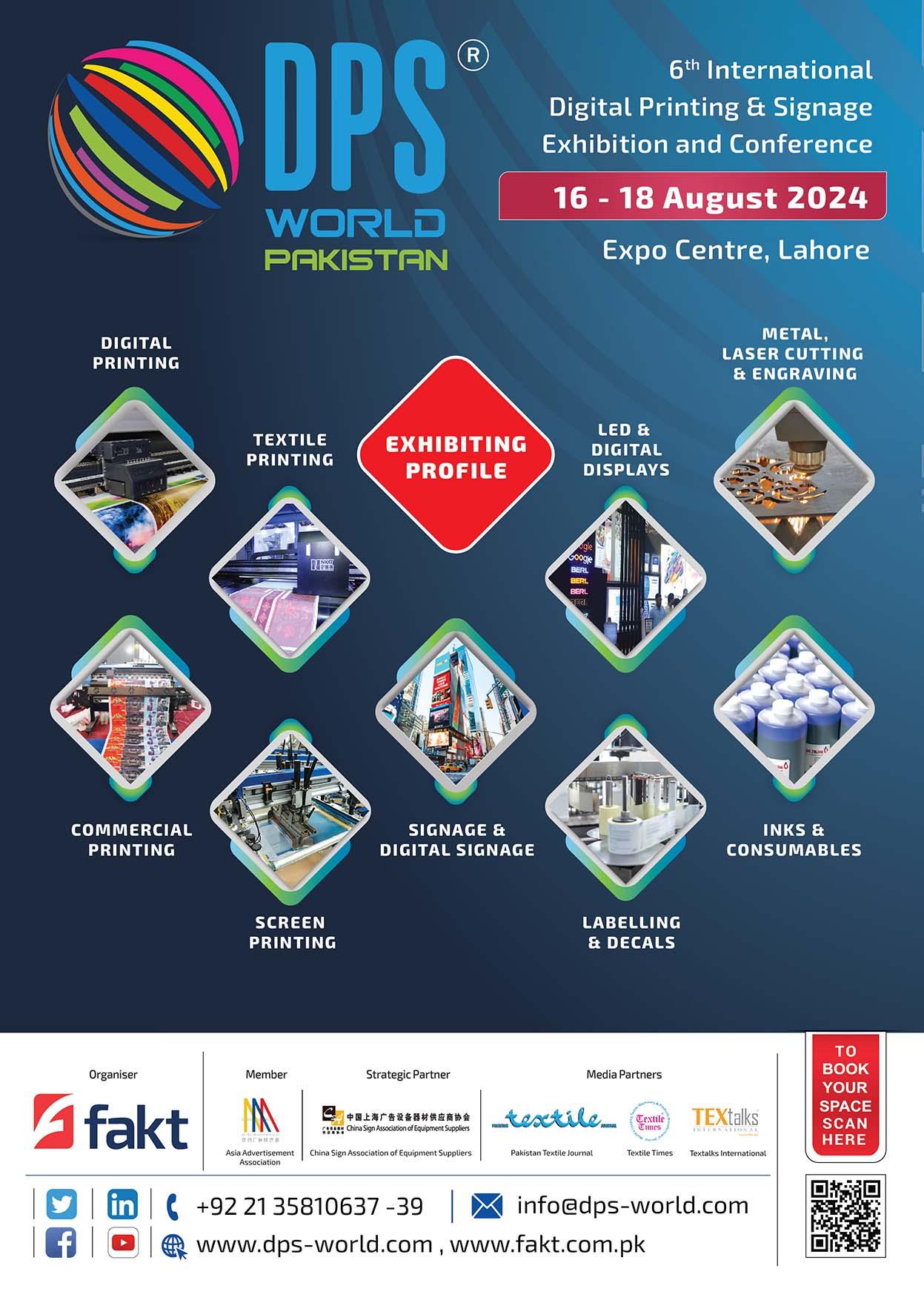
Dyeing,
Archroma, G-Star RAW and Advance Denim promote cleaner denim production
With the aim to help the denim industry reduce the environmental impact of its wastewater and move towards circularity, three leaders from across the denim supply chain have renewed their joint commitment to the production of aniline-free denim apparel based on Archroma’s DENISOL® PURE INDIGO 30.
Archroma, a global leader in specialty chemicals towards sustainable solutions, has been working with innovative Dutch denim brand G-Star RAW and sustainable denim leader Advance Denim since 2019.
Their joint aim is to produce highquality denim in authentic blue shades without the aniline impurity carried through from the synthesis of standard synthetic indigo. In traditional denim production, this aniline remains bound with the indigo pigment on the fabric; the remaining aniline is discharged during the dyeing and washing process. This can be a problem because aniline is toxic to aquatic life and two-thirds of aniline waste currently ends up in wastewater discharge where it could potentially pollute waterways and the ocean.
Archroma developed DENISOL® PURE INDIGO 30 to answer this key challenge. A 30% pre-reduced indigo solution, DENISOL® PURE INDIGO 30 makes it possible to produce indigo-dyed denim without aniline impurities throughout the process.

Easy to use with automated dosing, DENISOL® PURE INDIGO 30 significantly reduces the water needed for preparation, washing and wastewater treatment compared to indigo grains. It also reduces hazardous chemical consumption while allowing high reproducibility and creating the authentic and iconic deep indigo shades traditionally associated with denim.
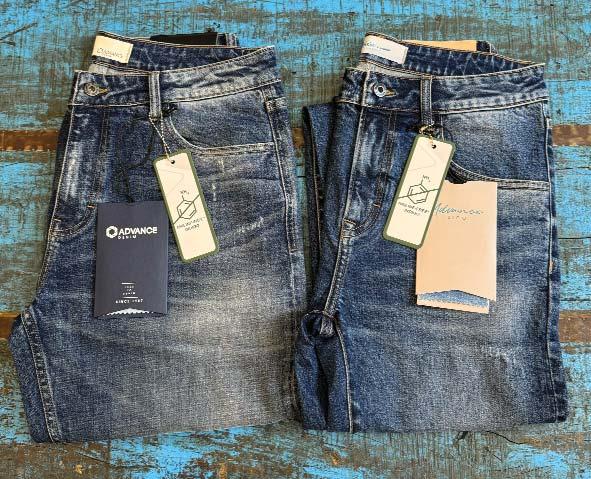
“If we remove aniline from the indigo dyes, we also remove it from the denim production process and its wastewater, and thus eliminate the risk of pollution. Denim that is free of aniline can also be more efficiently and sustainability recycled and reused, making circularity a more viable option,” Umberto De Vita, Market Segment Director for Denim, Archroma Textile Effects, said. “We are delighted to see trendsetters like G-Star RAW ramping up aniline-free production with DENISOL® PURE INDIGO 30, proving that sustainability is achievable with improved productivity and authentic deep indigo shades.”
“To be here as the denim brand in the future, G-Star RAW challenges industry standards,” Rebecka Sancho, G-Star RAW said. “We push boundaries in our journey to further close the loop by using sustainable materials, clean chemistry and by designing for durability and reuse. DENISOL® PURE INDIGO 30 helps us to minimize pollution and improve the environmental impact of our products without compromising on iconic indigo colors.”
G-Star RAW is working towards making 20% of its entire collection from Cradle to Cradle Certified® fabrics by 2025. Its partnership with Archroma and Advance Denim contributes to this goal, since the aniline-free DENISOL® holds a Gold Level Material Health Certificate from the Cradle to Cradle Products Innovation Institute. DENISOL® PURE
INDIGO 30 is also compliant with other major eco-standards and the requirements of leading retailers and brands.
“As a company that is dedicated to the production of denim that is both authentic and sustainable, Advance Denim is proud to work with industry innovators like Archroma and G-Star RAW,” Amy Wang, Managing Director, Advance Denim, said. “We were the first mill in China to launch an aniline-free collection with Archroma and our new plant in the resort town of Nha Trang in Vietnam is a 100% aniline-free indigo factory with DENISOL® PURE INDIGO 30 by Archroma.”
Johan Van den Heede, Director –Europe Marketing, Advance Denim, added, “We are honored to stand alongside Archroma and G-Star RAW to pioneer cleaner denim production methods that reflect our unwavering commitment to sustainability and innovation.”
Advance Denim’s aniline-free indigo collection offers various rich authentic indigo shades in different yarn characters and sustainable fiber compositions with multiple innovative constructions.
Advance Denim, G-Star RAW and Archroma have previously collaborated to launch collections based on Archroma’s EarthColors® technology, which upcycles plant waste from the herbal industry to create sustainable colorways.
Printing
62 PAKISTAN TEXTILE JOURNAL - April 2024
and Finishing
Mimaki launches environmentally conscious, two-step textile transfer printing solution TRAPIS
Mimaki’s new textile pigment transfer printing system, named TRAPIS, makes significant savings on wastewater compared to conventional methods. Latest innovation also broadens application possibilities for print service providers, with the ability to print on a multitude of materials, including natural fibres
Mimaki Europe, a leading provider of industrial inkjet printers, cutting plotters, and 3D printers, announces the commercial release of its textile pigment transfer printing system, named “TRAPIS”. Following the preview of the technology at ITMA 2023, this commercialised version, available later this year, offers an environmentally friendly and easy to operate solution for textile applications – saving almost 90% of wastewater compared to conventional methods.
TRAPIS provides a simple two-step process, consisting of an inkjet printer and a calender. The design of choice is printed by the inkjet printer with a dedicated ink onto transfer paper, which is then transferred to the application via a calender. Unlike both analogue and digital conventional dye-printing methods, TRAPIS generates almost no wastewater, only that which is produced during the printer’s automatic
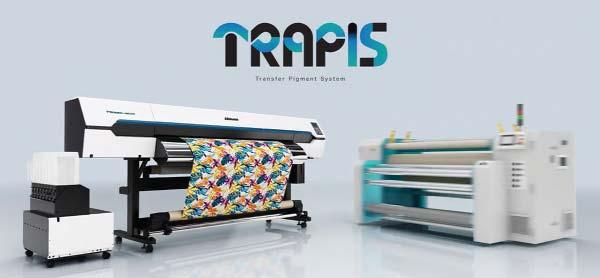
maintenance. Due to no pre-treatment or washing of the fabric being needed, this saves around 14.5 litres per square meter of water when compared to digital dye printing1
Additionally, this eliminates the need for wastewater treatment facilities, which can be both expensive and constrictive when it comes to where the solution is installed. Due to the smaller size, it is possible for the TRAPIS system to be installed in a limited space, or even at the front of a printshop.
TRAPIS also offers print service providers an easy-to-use option for textile printing. As the process only involves printing and transferring, it does not require specialised skills to operate when compared to the more complex seven- or

eight-step system for digital and analogue conventional printing. The lack of a fabric conveyor belt in the system further minimises the need for time intensive maintenance.
Further simplifying the process, TRAPIS is able to print on a wide range of materials, including natural fibres like cotton and silk in addition to blended fabrics, with just one type of ink. Due to this, the process can be flexible and adapt to customer demand, even with multimaterial short runs. The accompanying ink has also achieved the ZDHC MRSL Lv.3*2 certification and is bluesign® APPROVED, to ensure that it is both worker and consumer safe, as well as an environmentally friendly product. Like with Mimaki’s existing textile solution portfolio, the prints produced with TRAPIS maintain stretchability and colourfastness, without impacting aspects like breathability and water absorbability, important for sectors like home textiles, activewear and fashion.
[1] According to Mimaki’s original research, digital dye printing generates significant amount of wastewater by textile printing conveyor belt washing and fabric washing after dye fixation (steam).
[2] ZDHC is a non-profit organization based in Amsterdam, the Netherlands, that works to eliminate the emission of hazardous substances in the textile and leather industry.
Dyeing, Printing and Finishing 63
Archroma Pakistan Ltd ...................................................25
Benninger AG.............................................................15
Biancalani SpA..............................................................3
Brueckner...................................................................FC
Chhipasons.................................................................64
DPS World 2024.........................................................61
Groz-Beckert................................................................9
ITMA ASIA + CITME, Singapore 2025........................33
ITM 2024.................................................................IBC
IGATEX Pakistan 2024...............................................IFC
iTextiles................................................................38&39
Jet Logistics.................................................................64
Loptex SRL.................................................................23
Rastgar...................................................................6&64




Engineering SA..................................................45
Swissmem ..................................................................13 Troostw ijk NV..............................................................1
Savio..........................................................................BC Santex Rimar Group...................................................17 Saurer ........................................................................19 Sedo
SSM...........................................................................11
Novibra......................................................................27 Classified
ADVERTISERS INDEX APRIL 2024

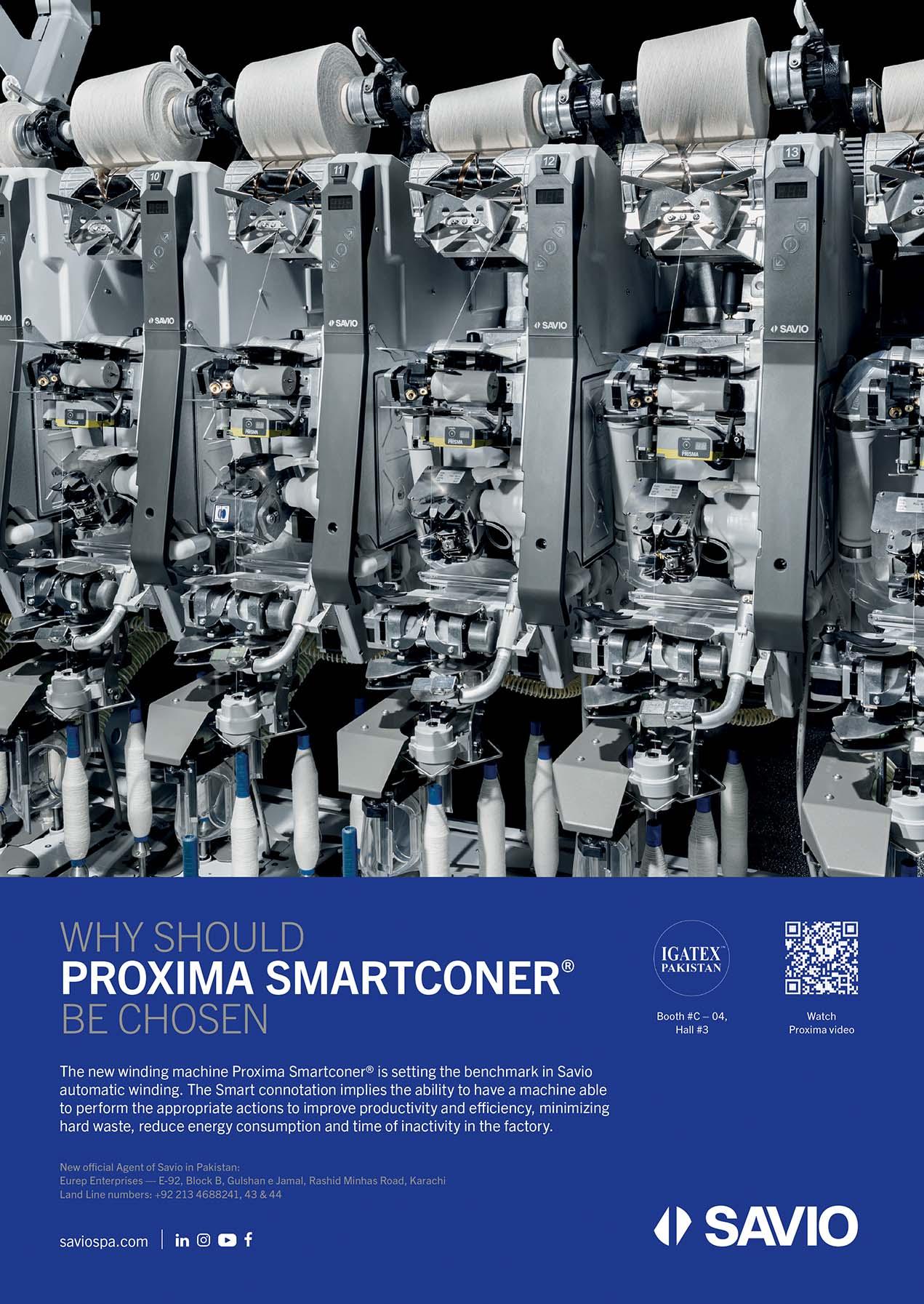



































































 Gary Adams, CEO of the NCC
Gary Adams, CEO of the NCC
















 Fig.1: NASA HPS 68 with CROCOdoff – an effective combination
Fig.1: NASA HPS 68 with CROCOdoff – an effective combination








































































